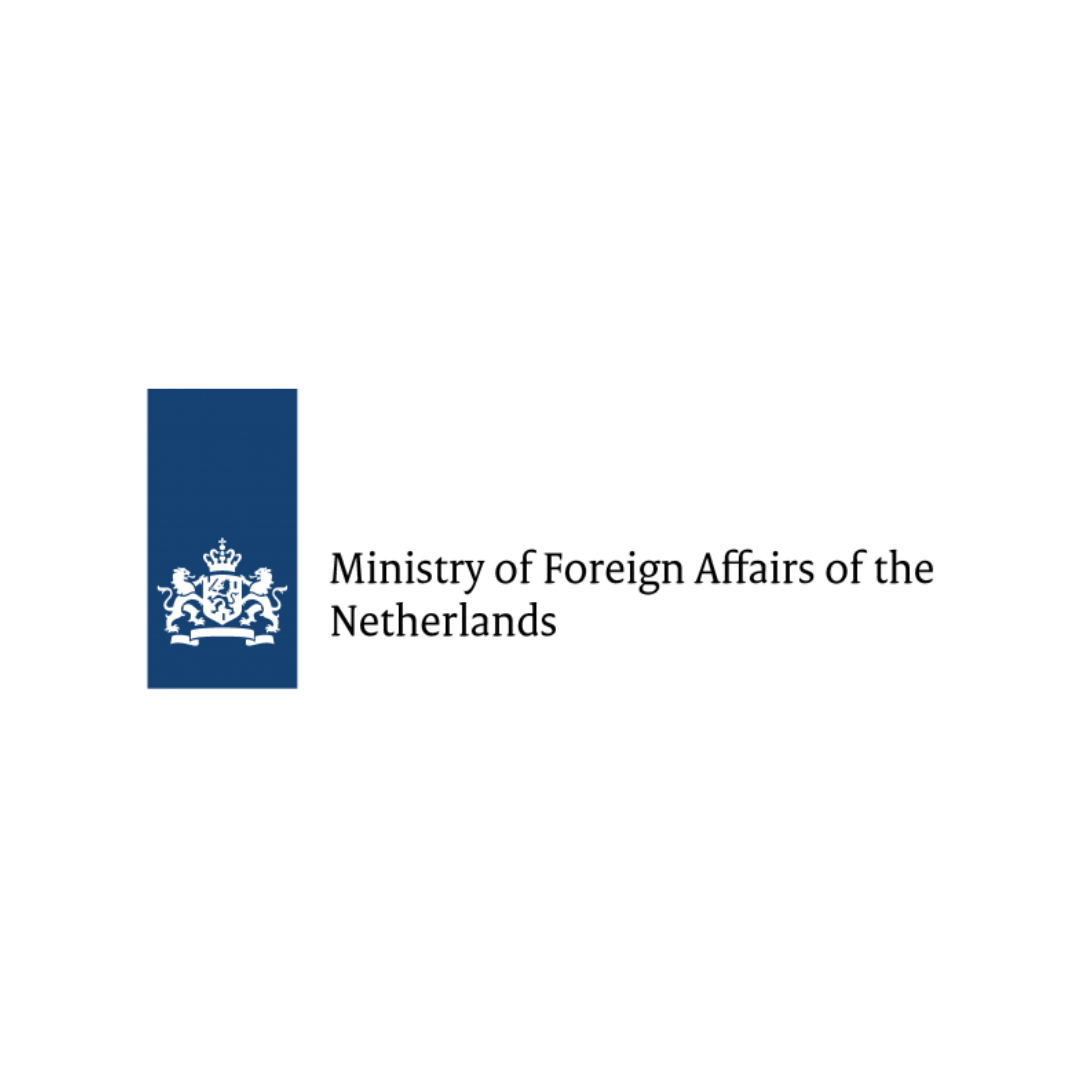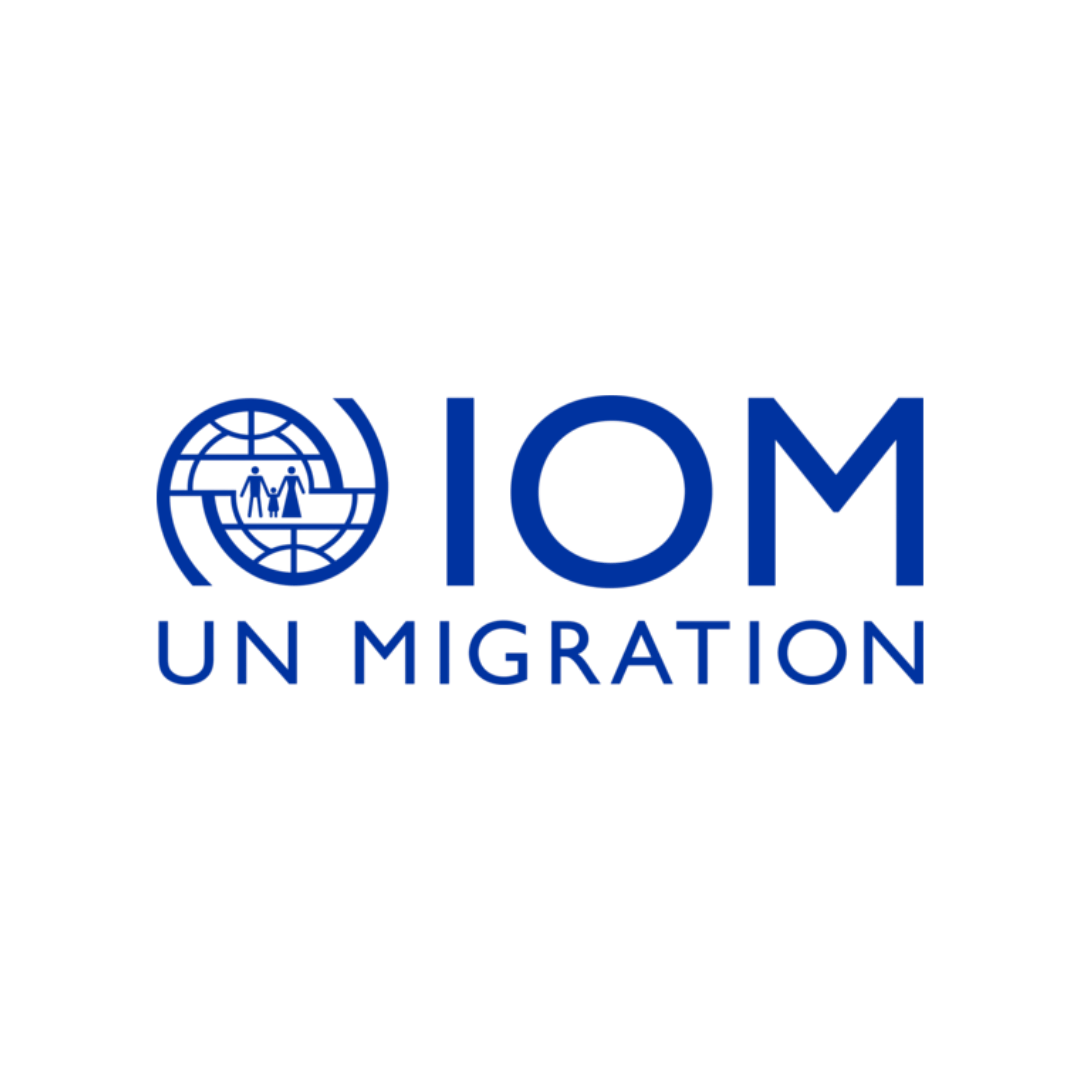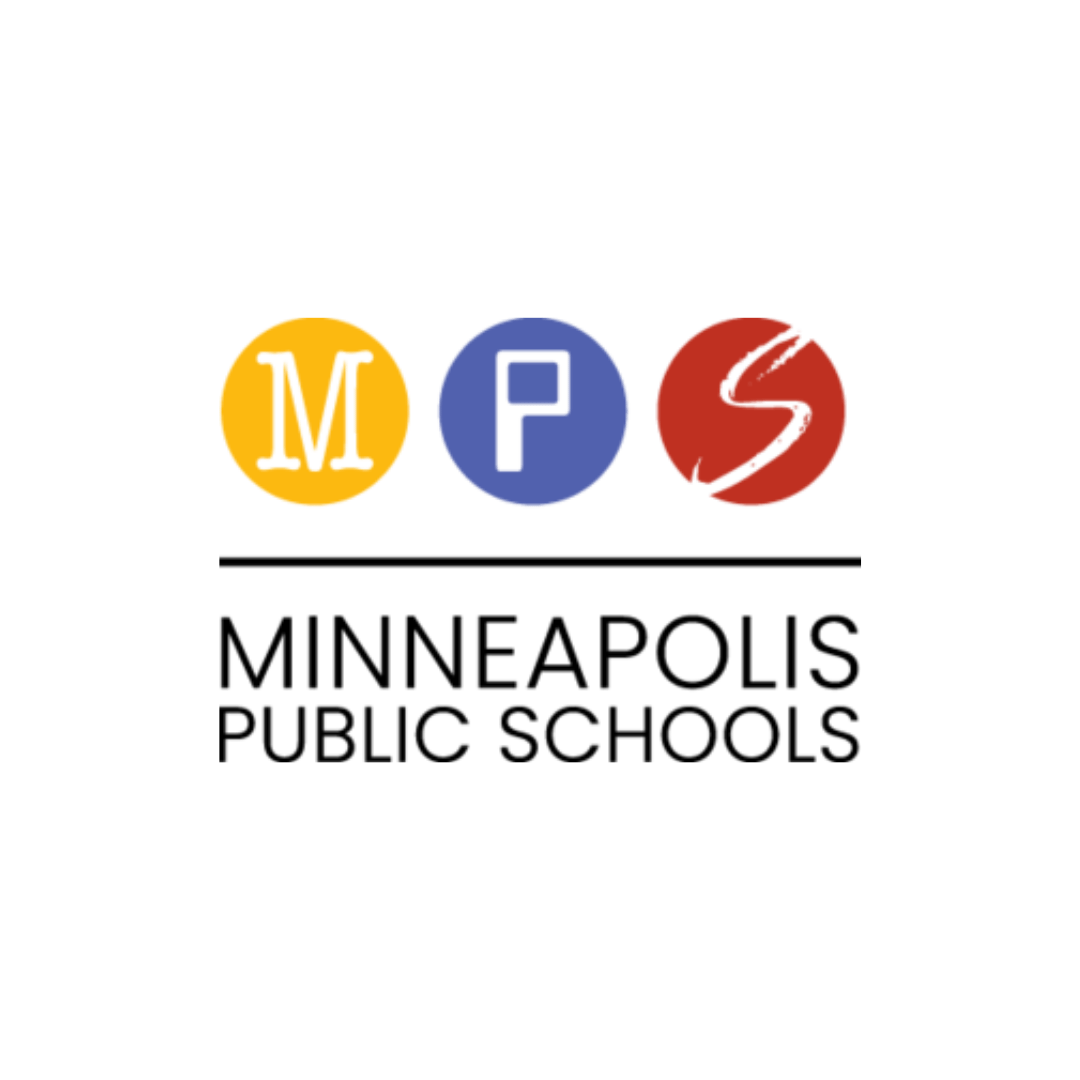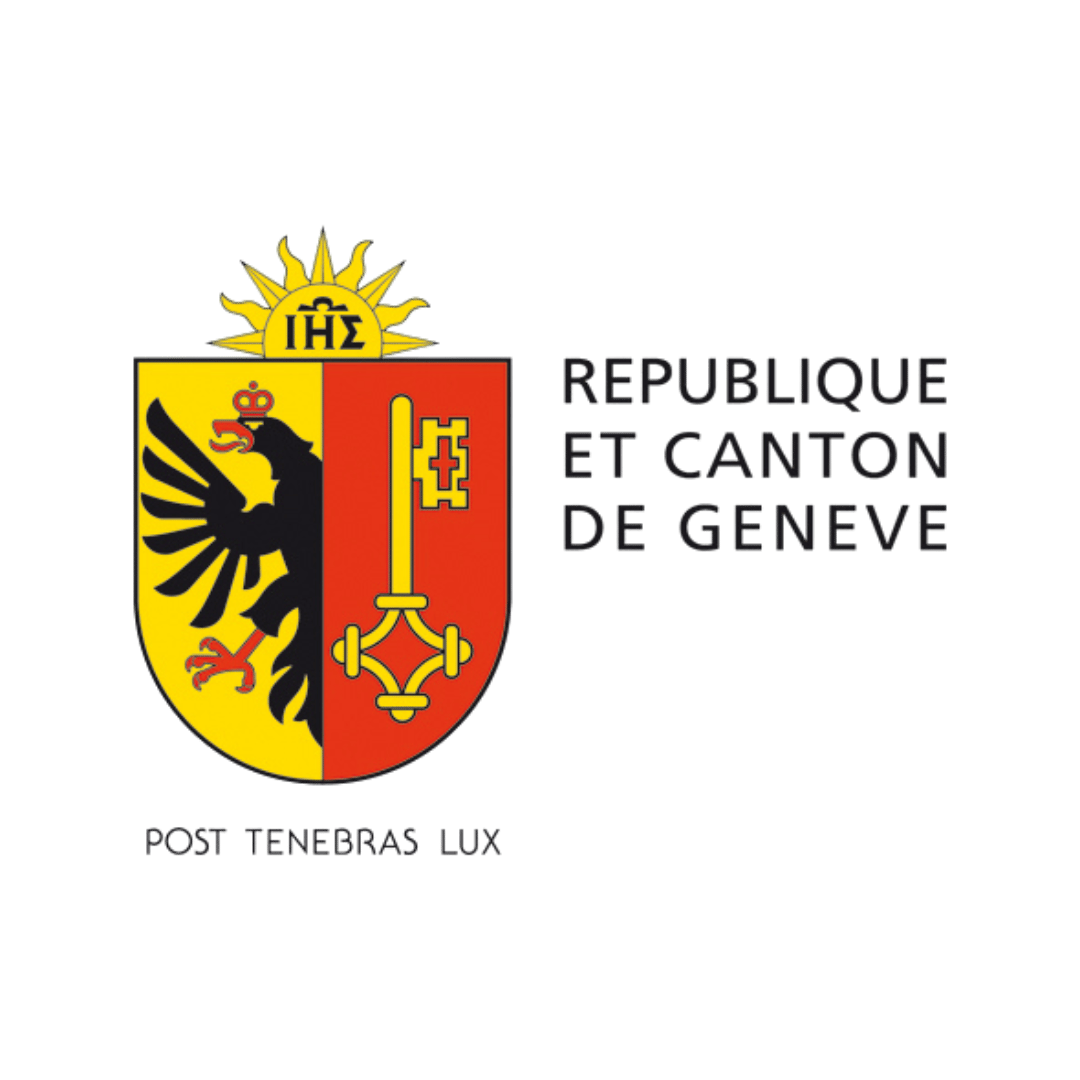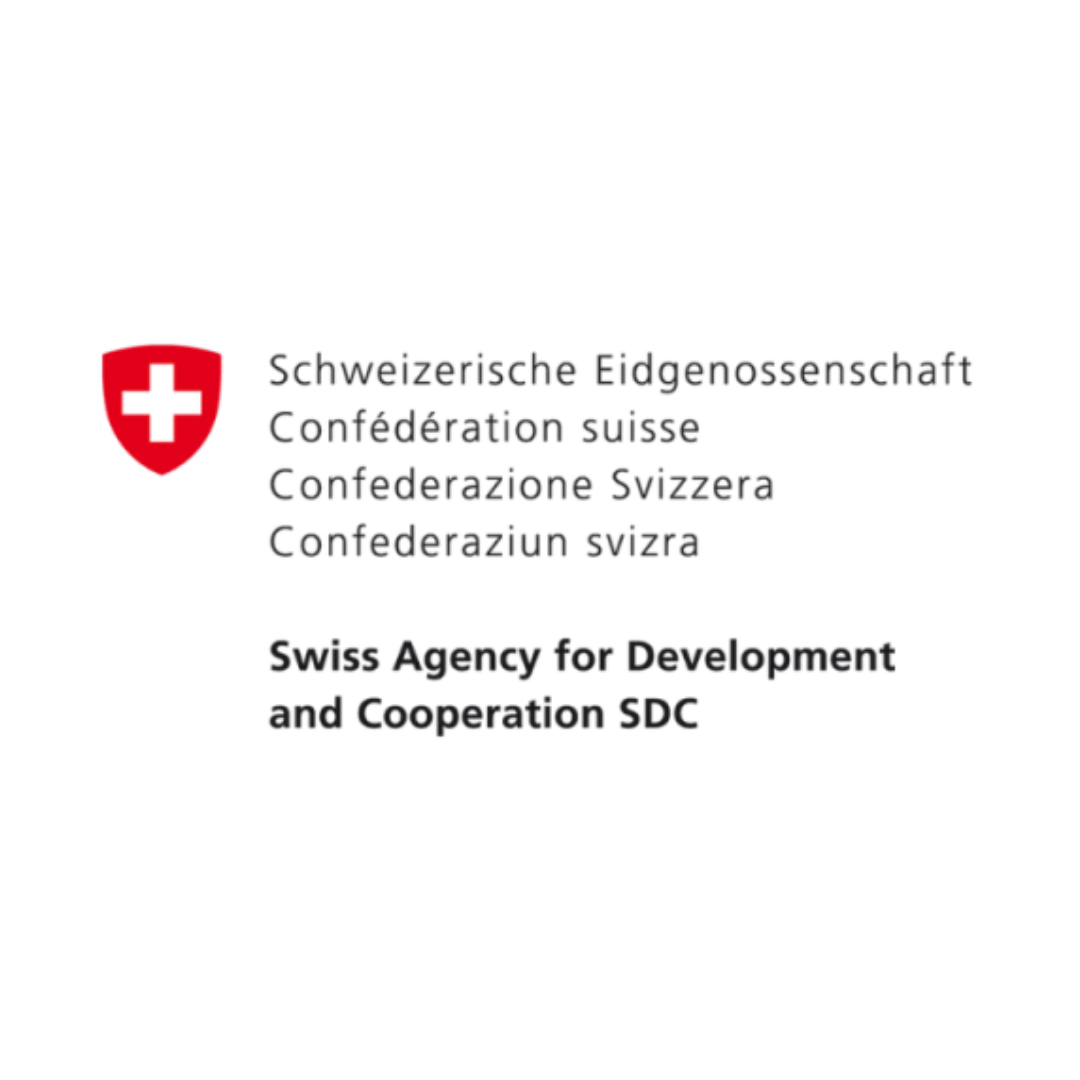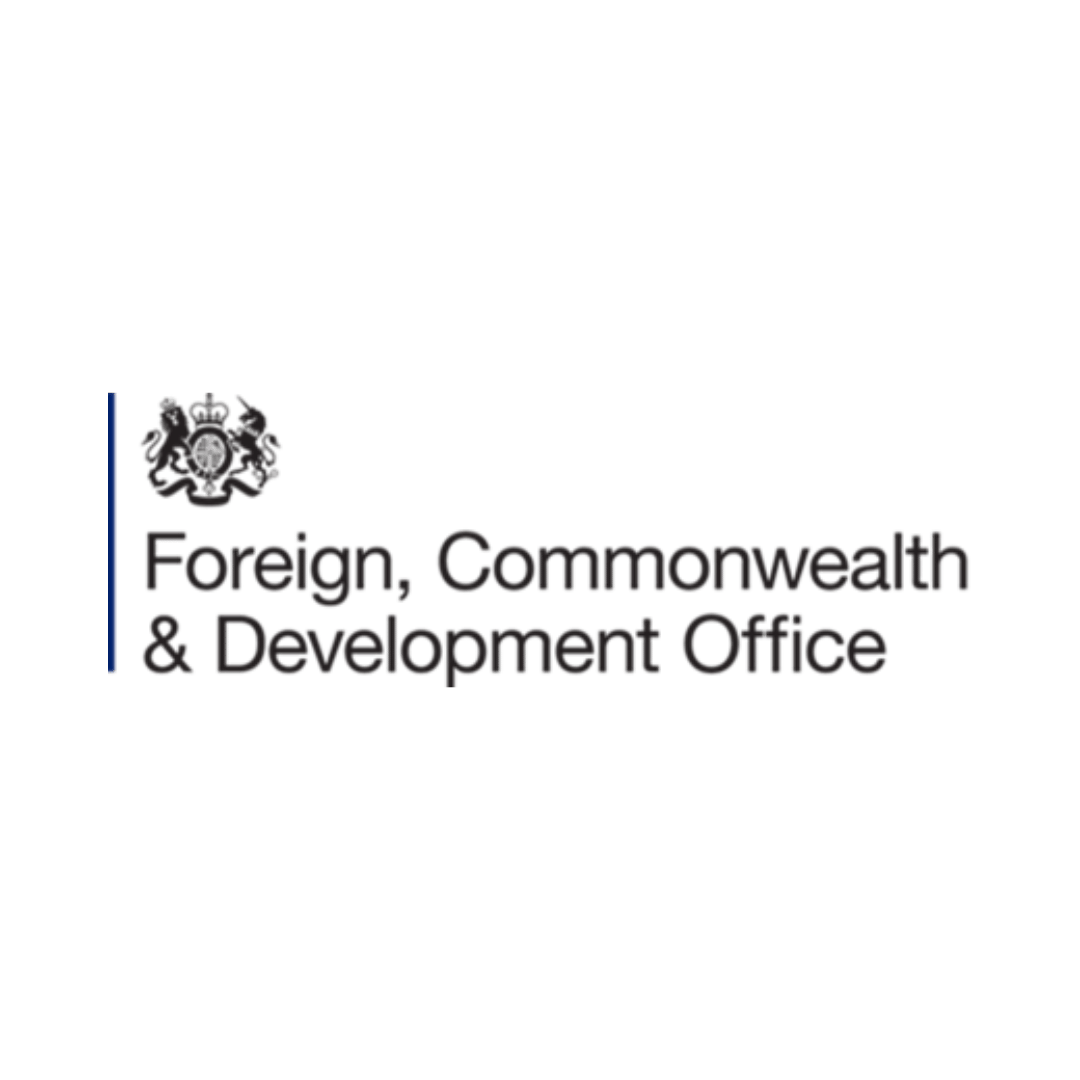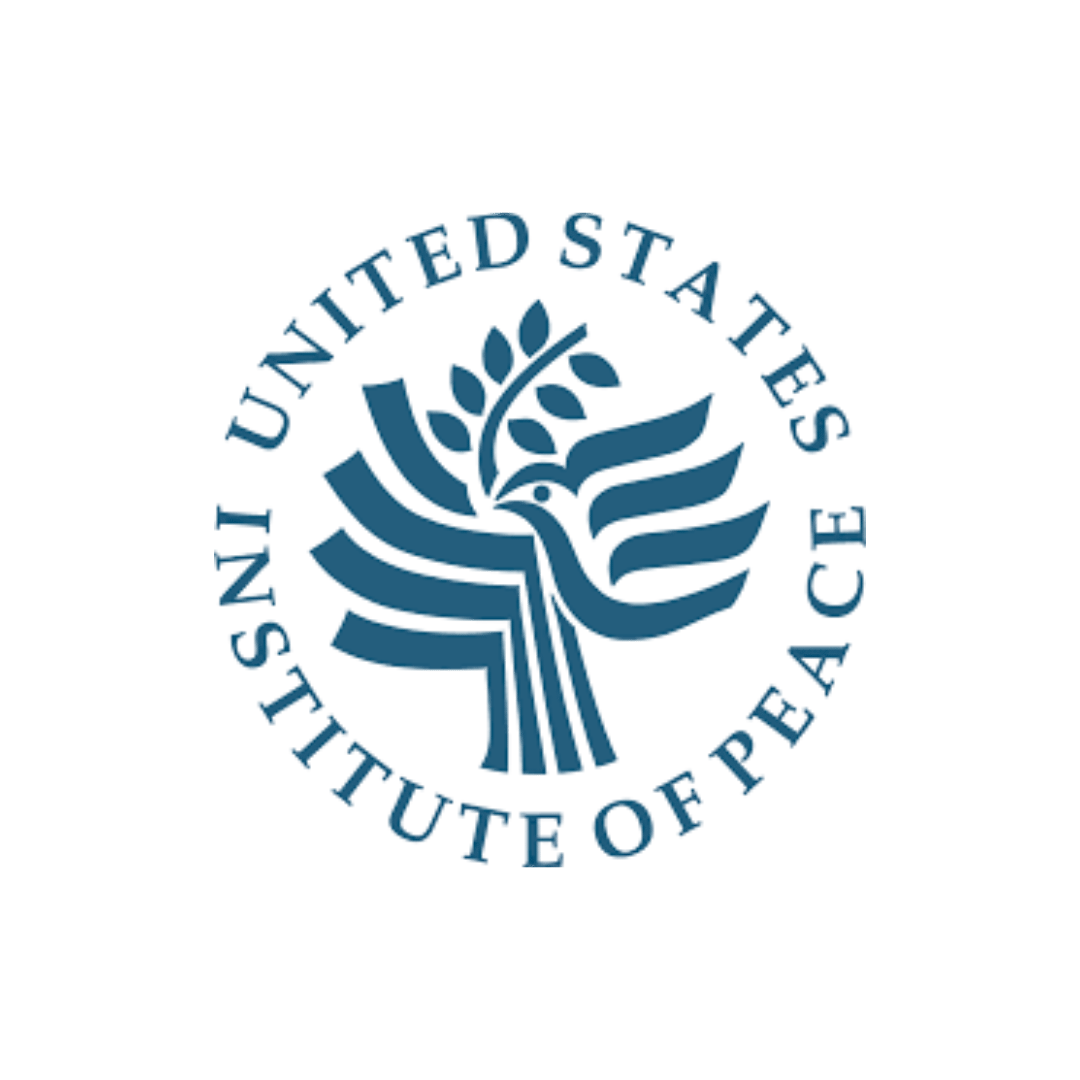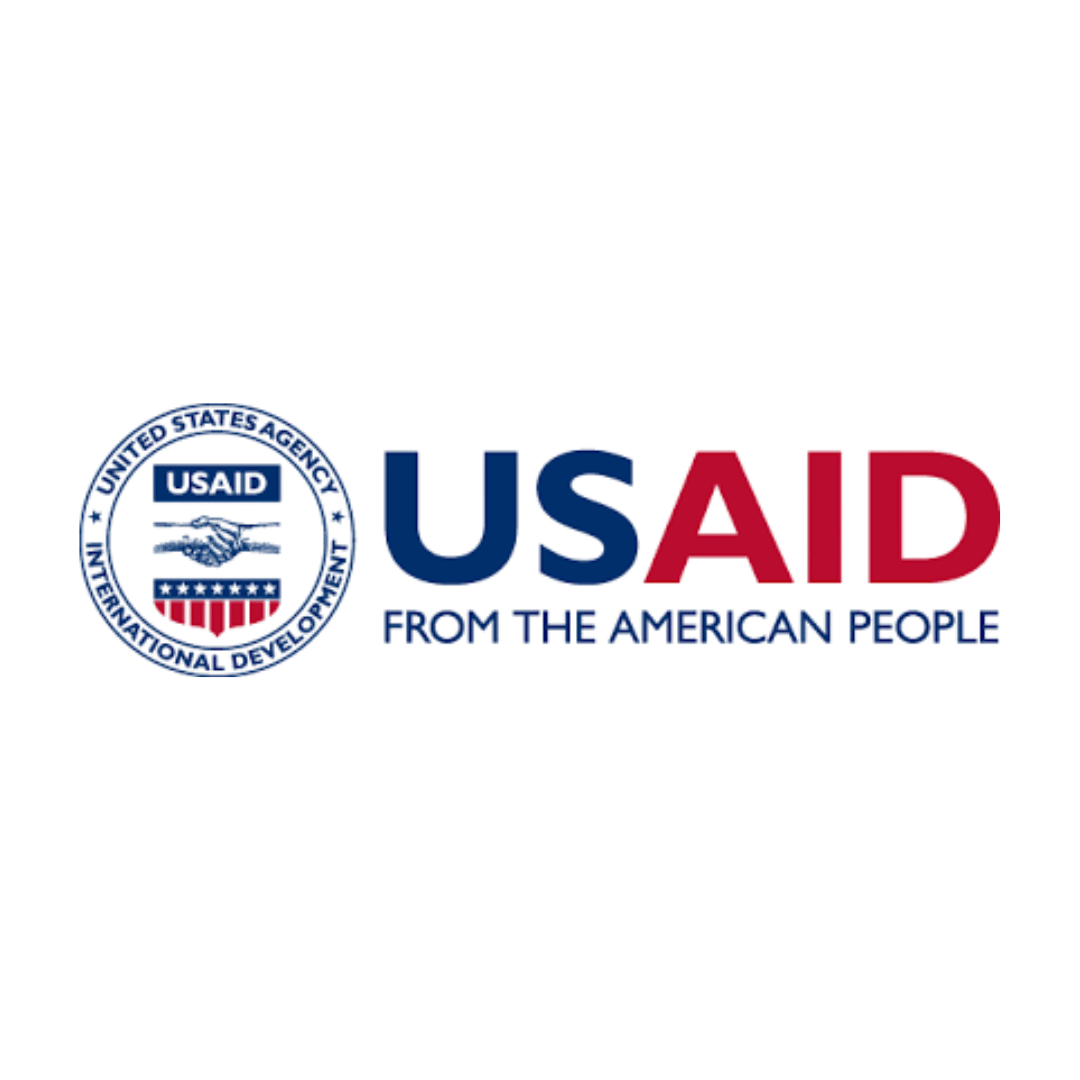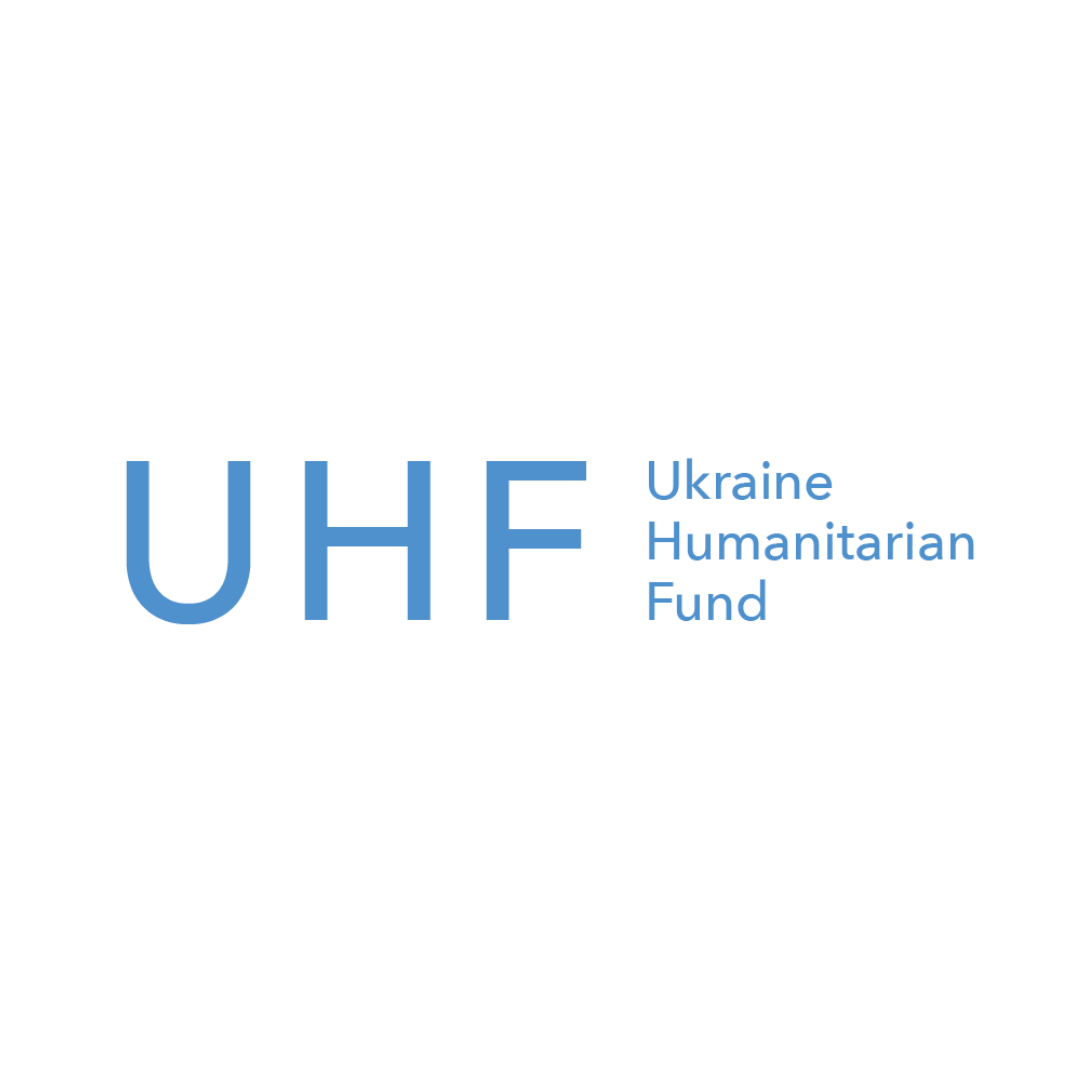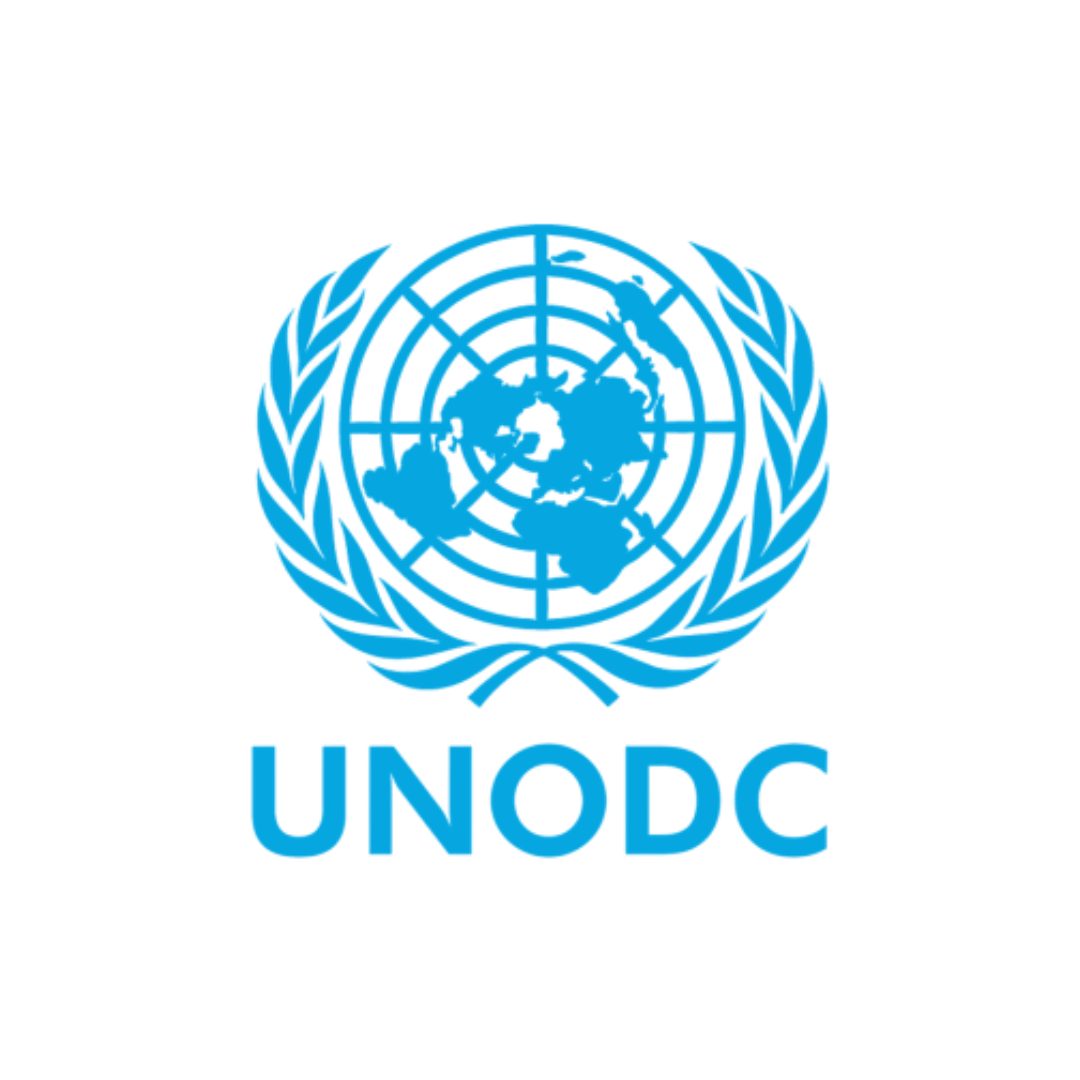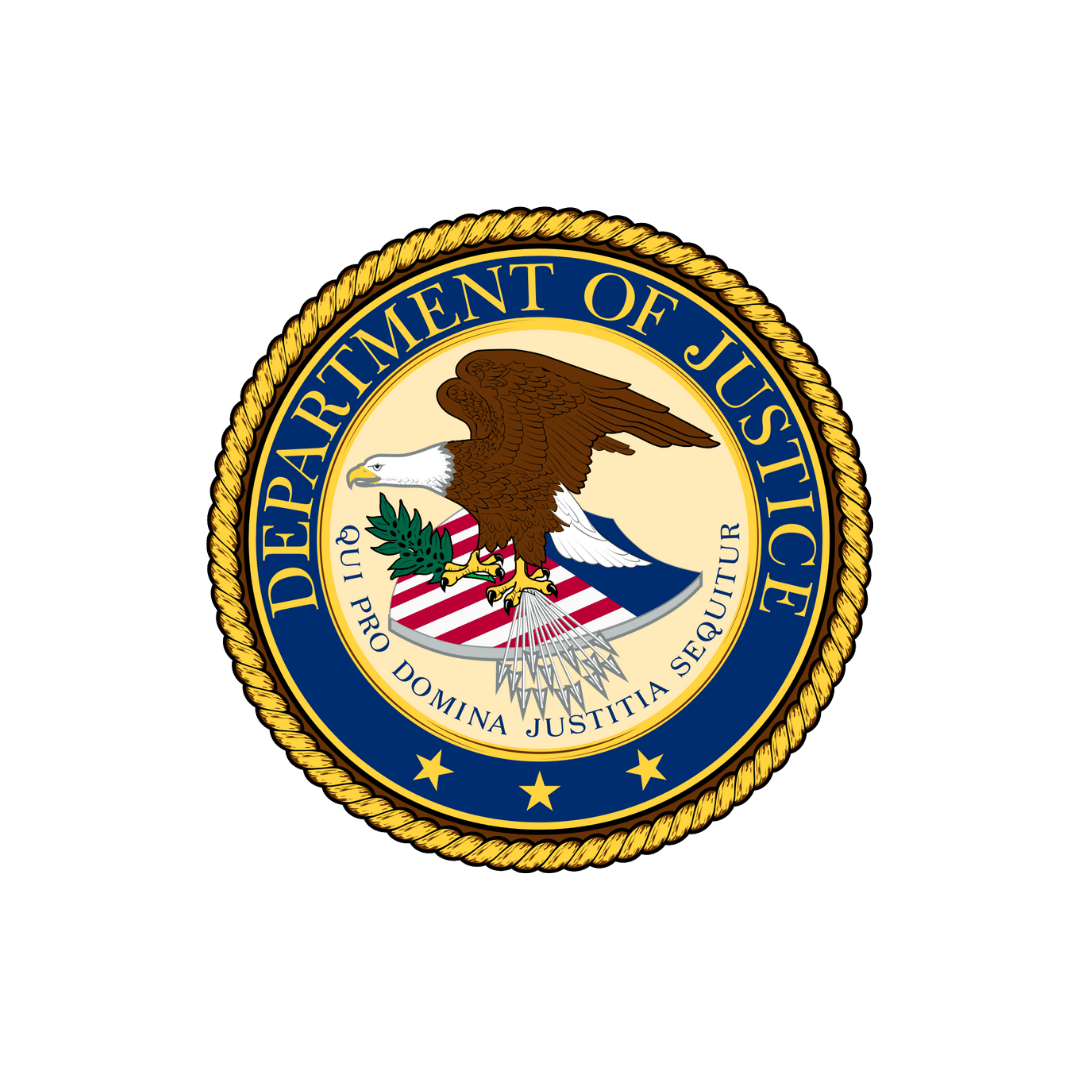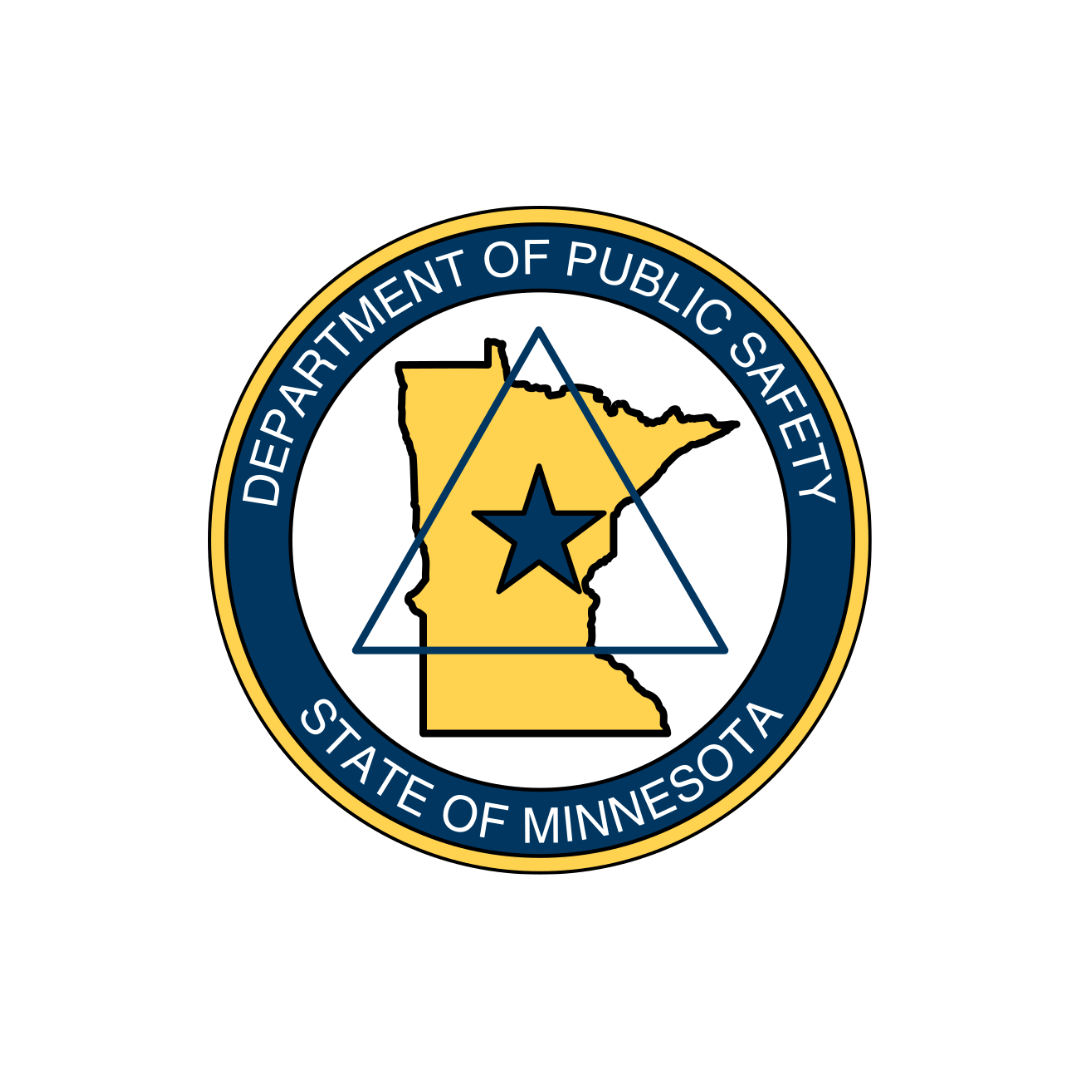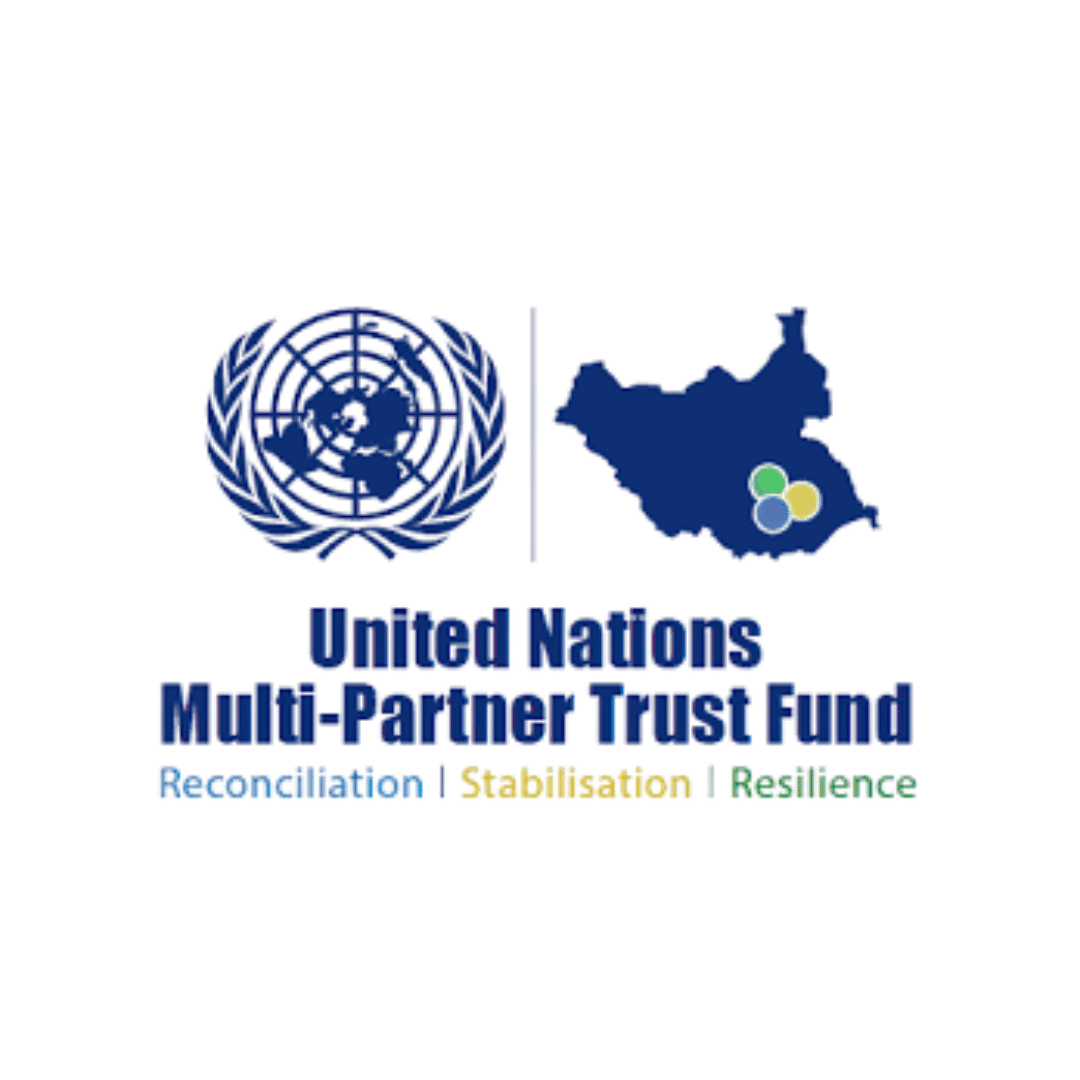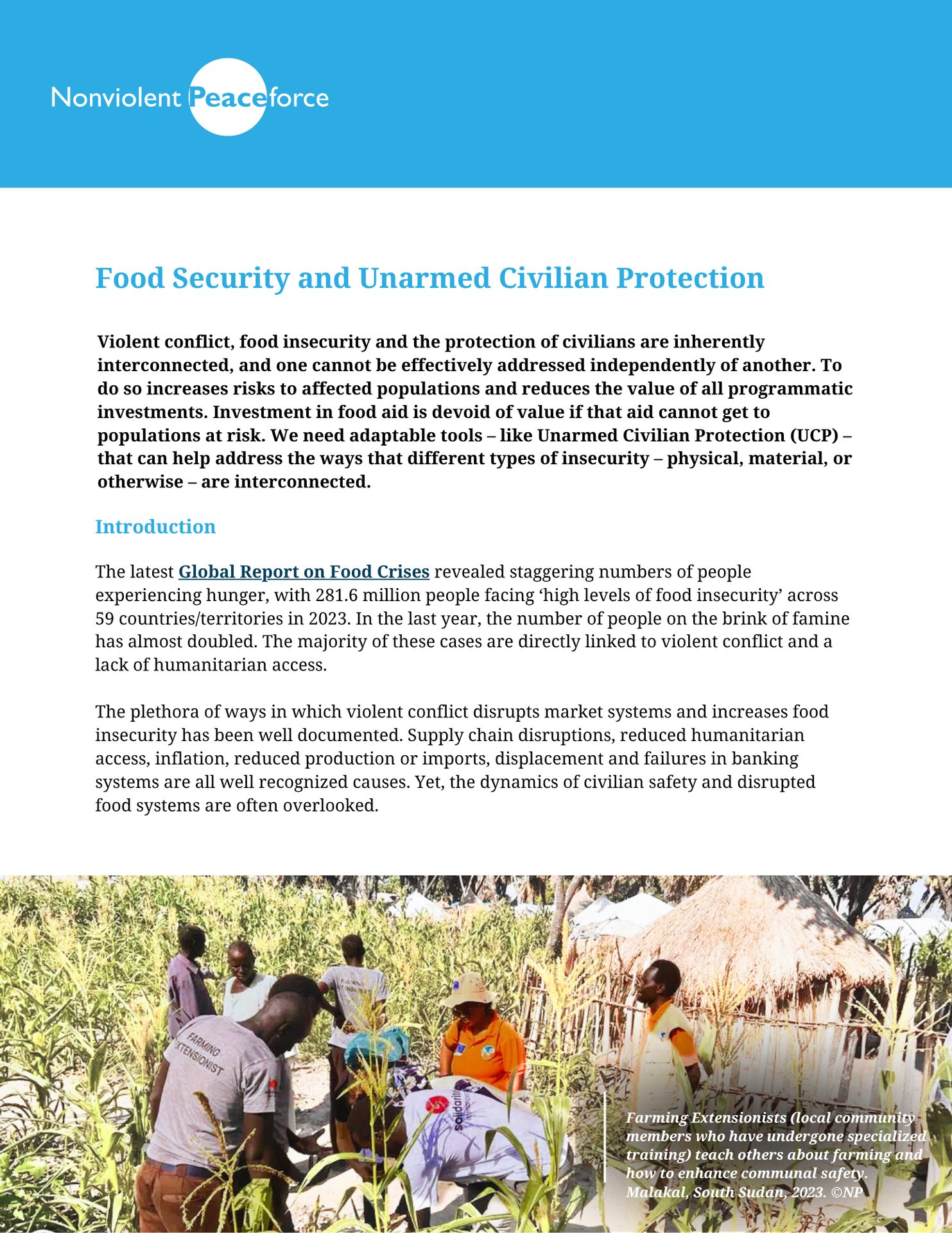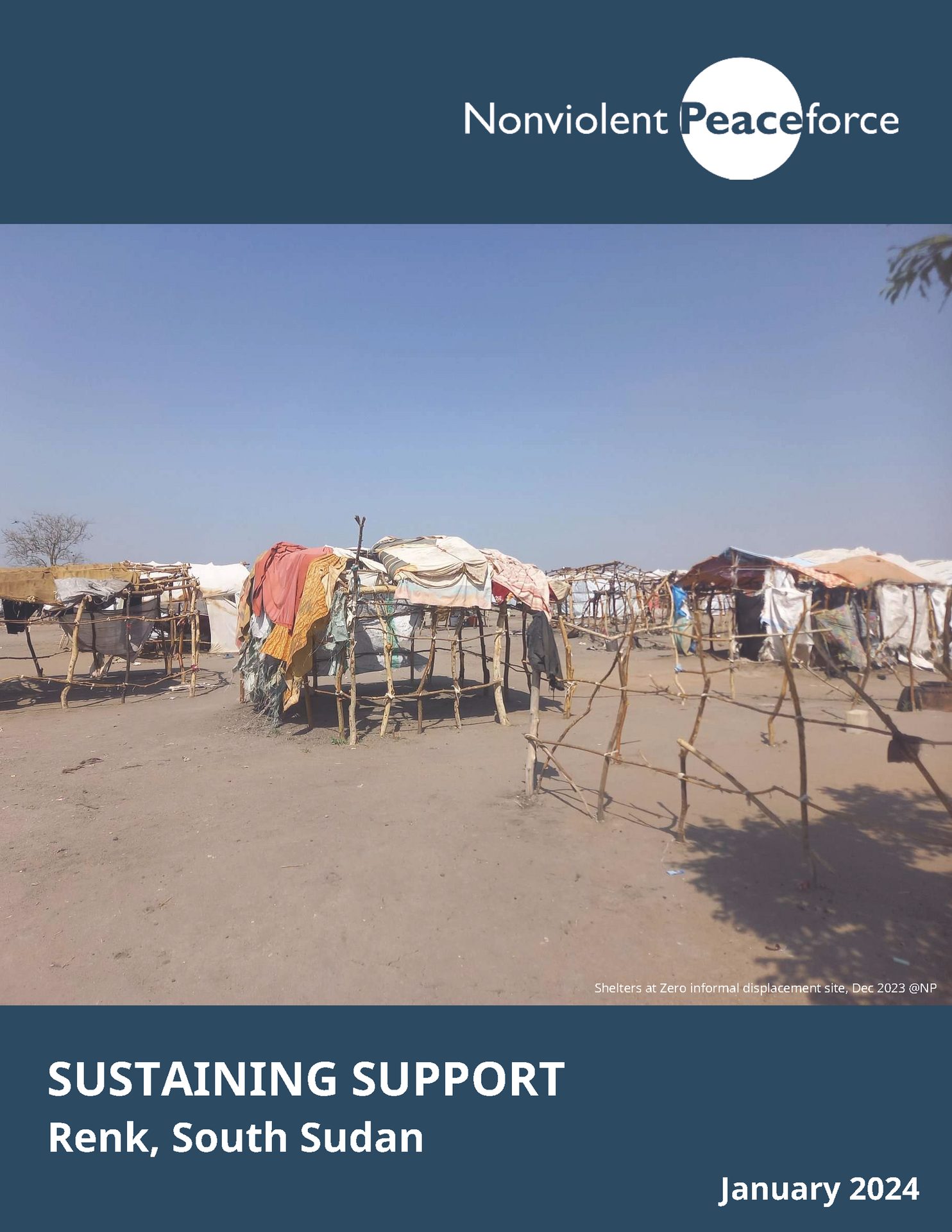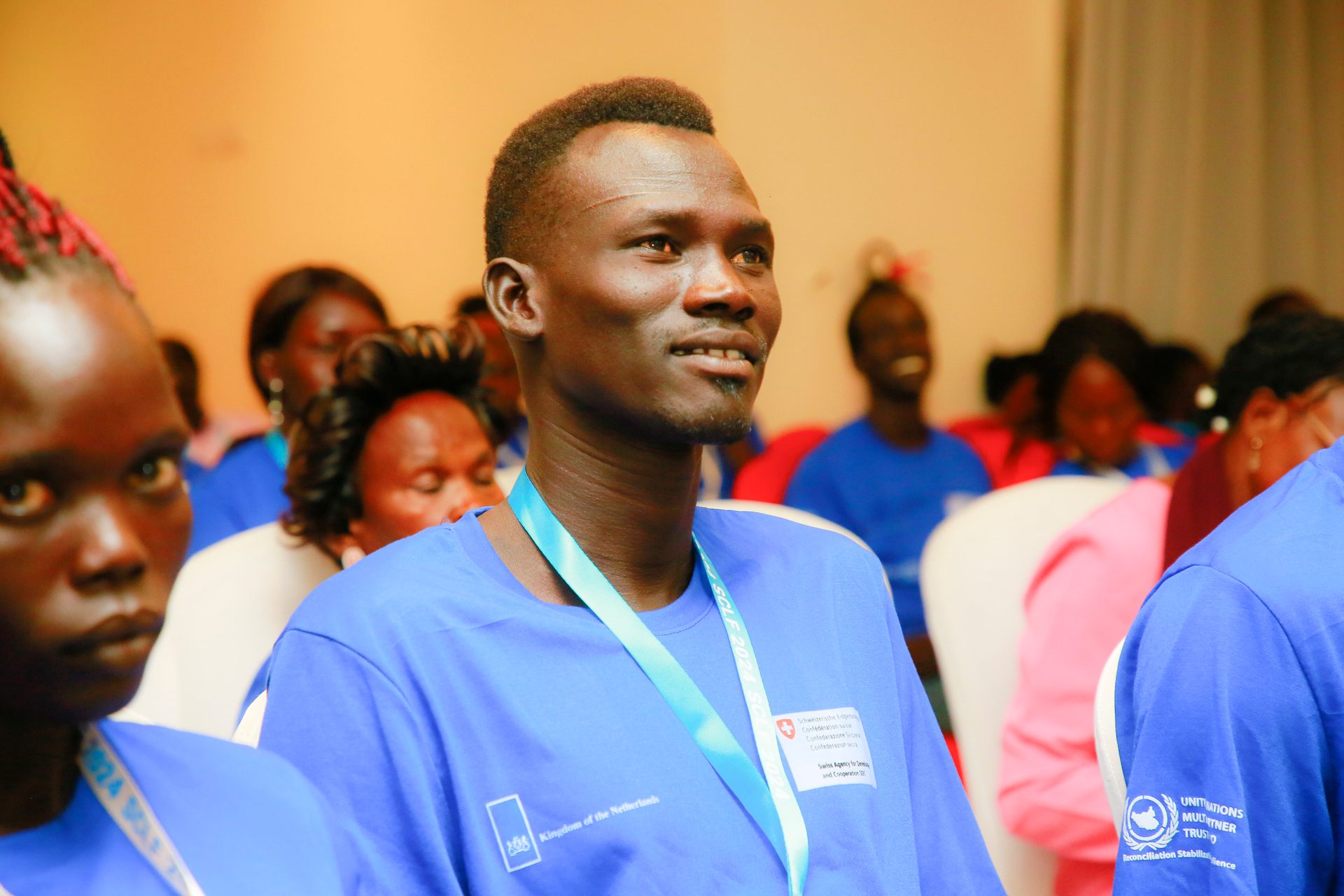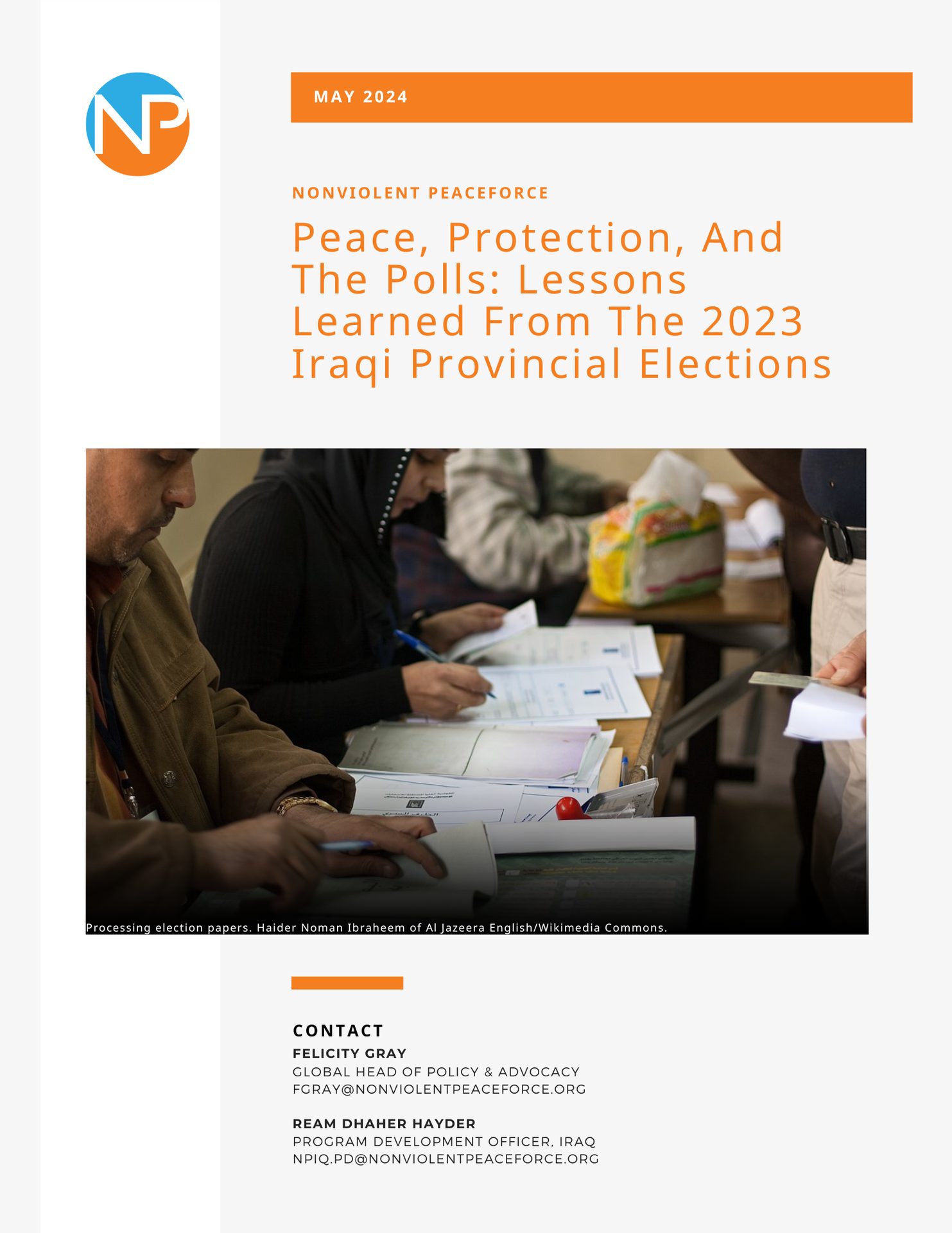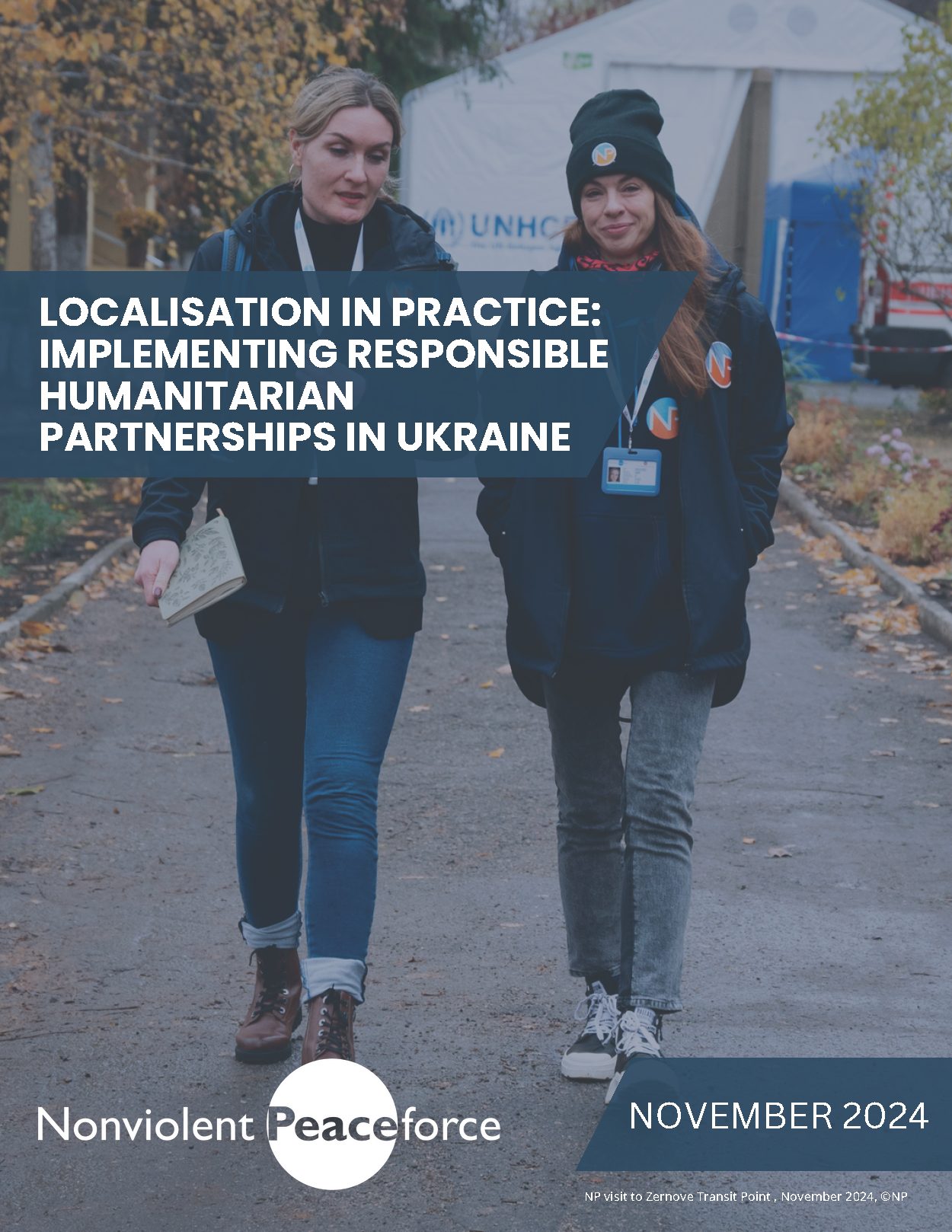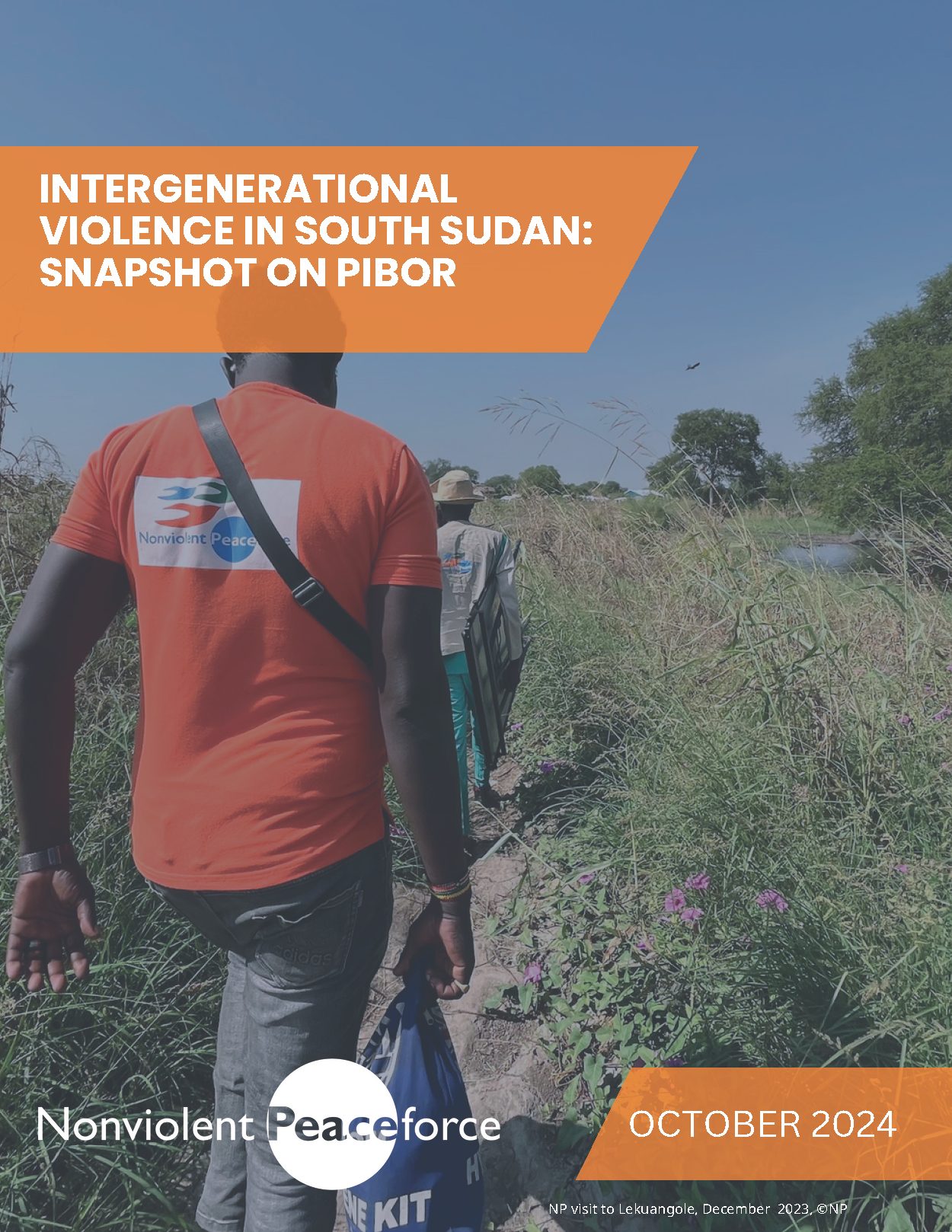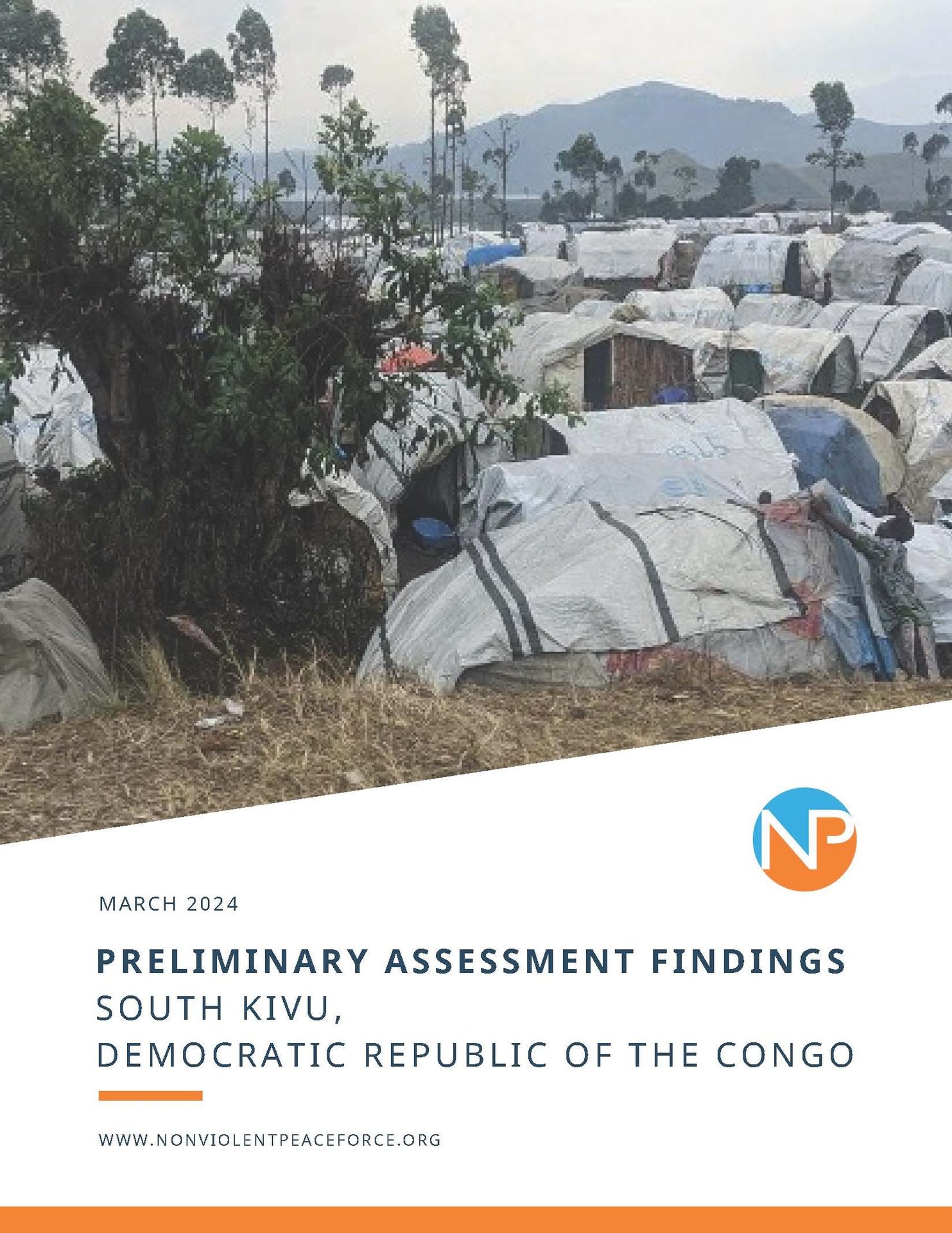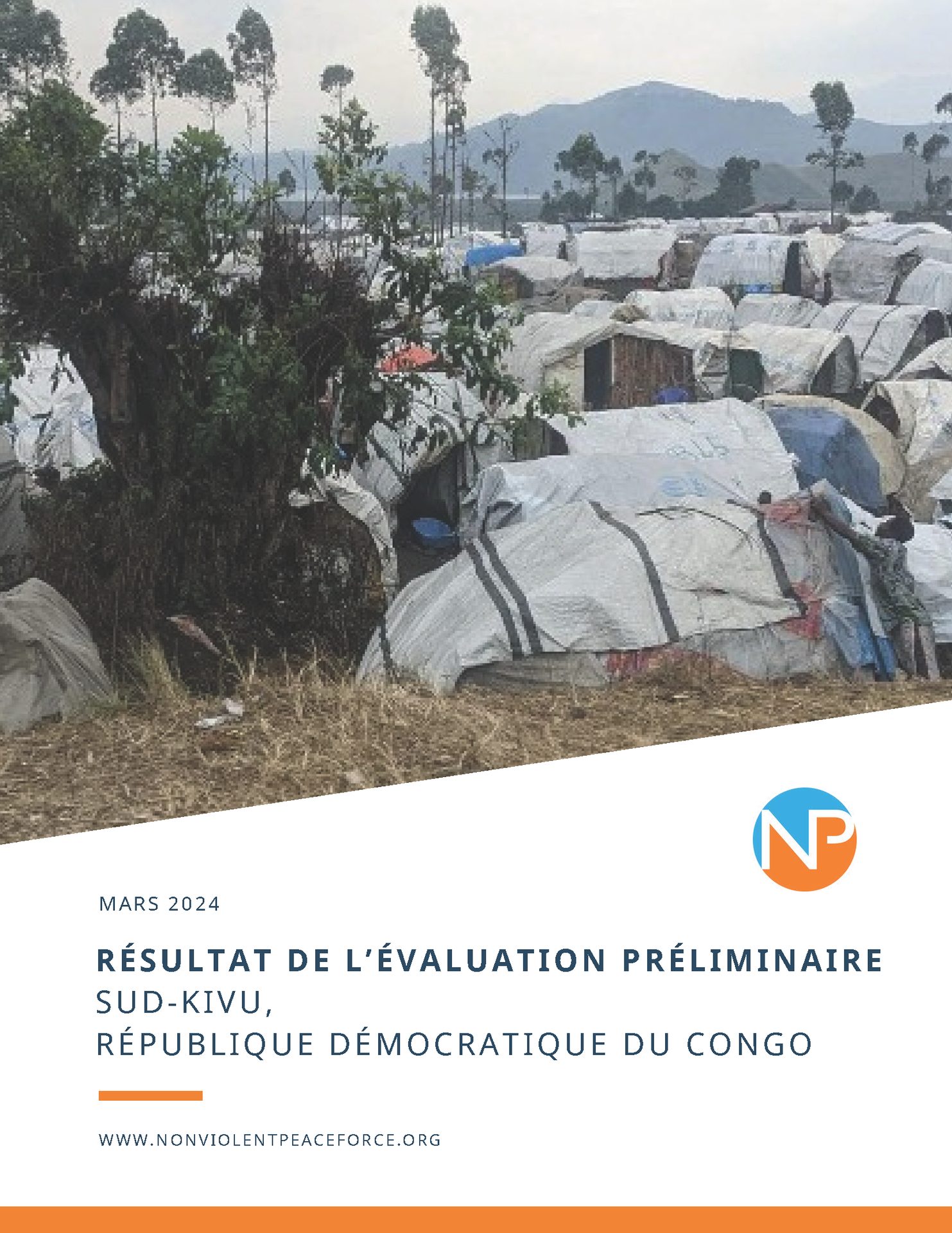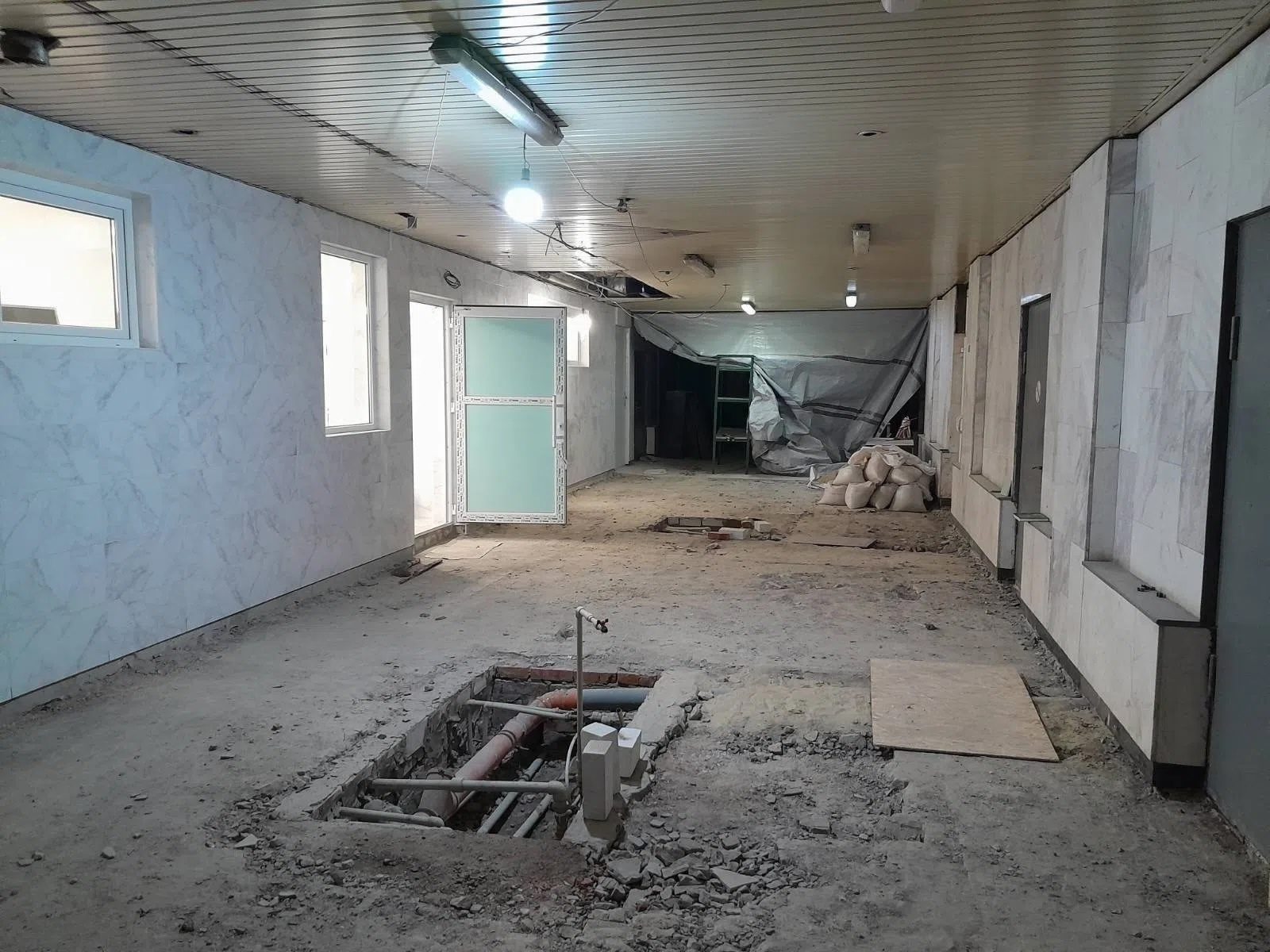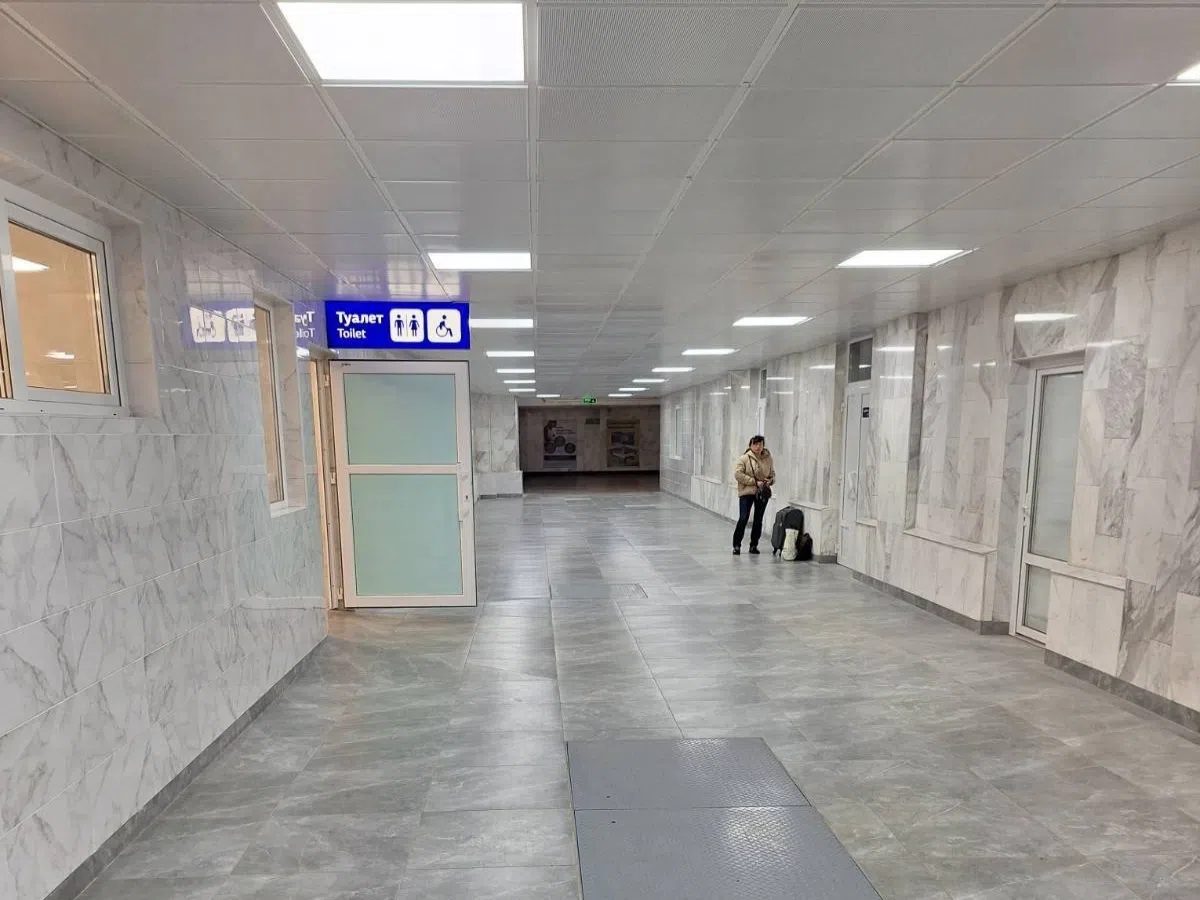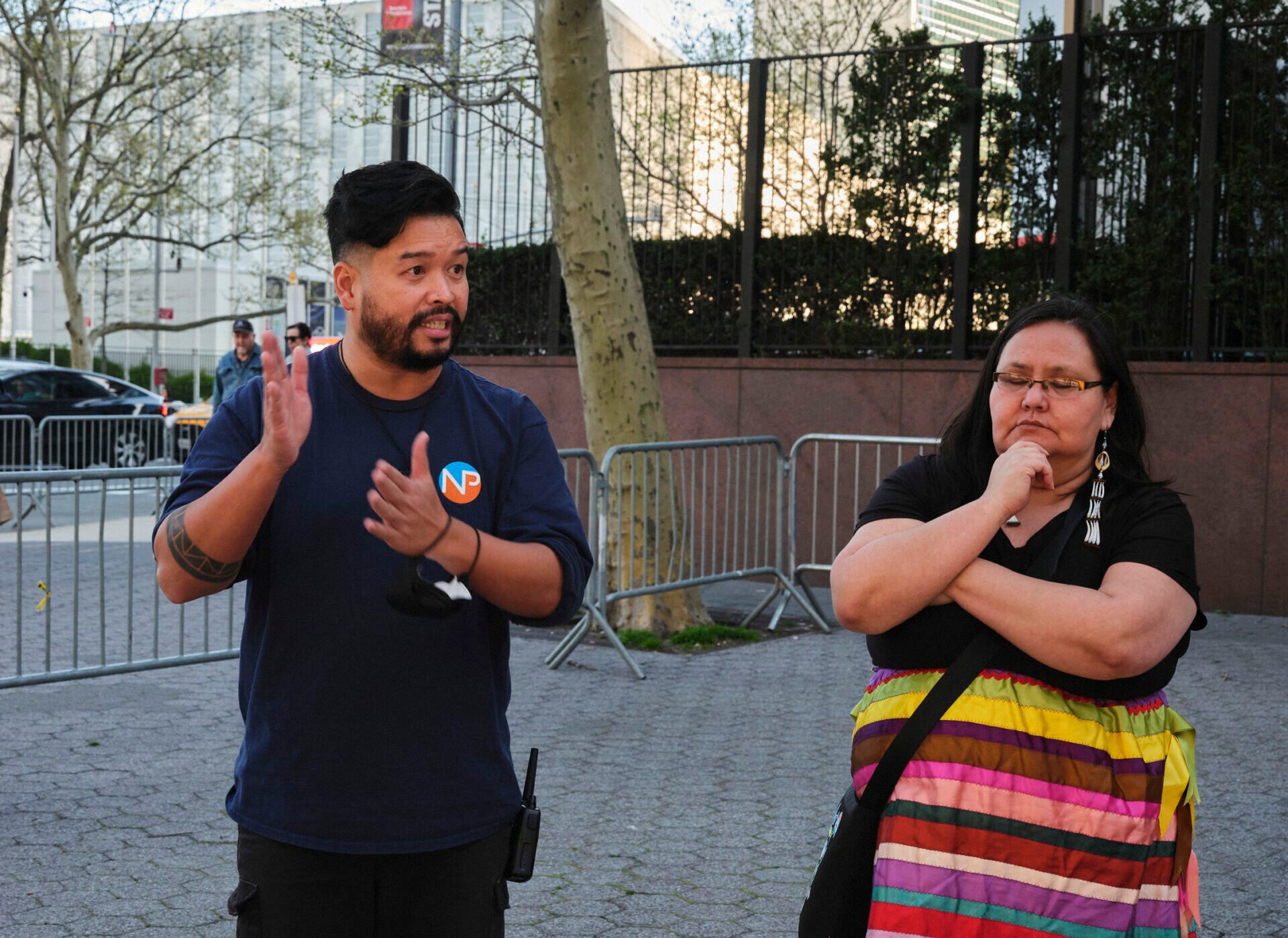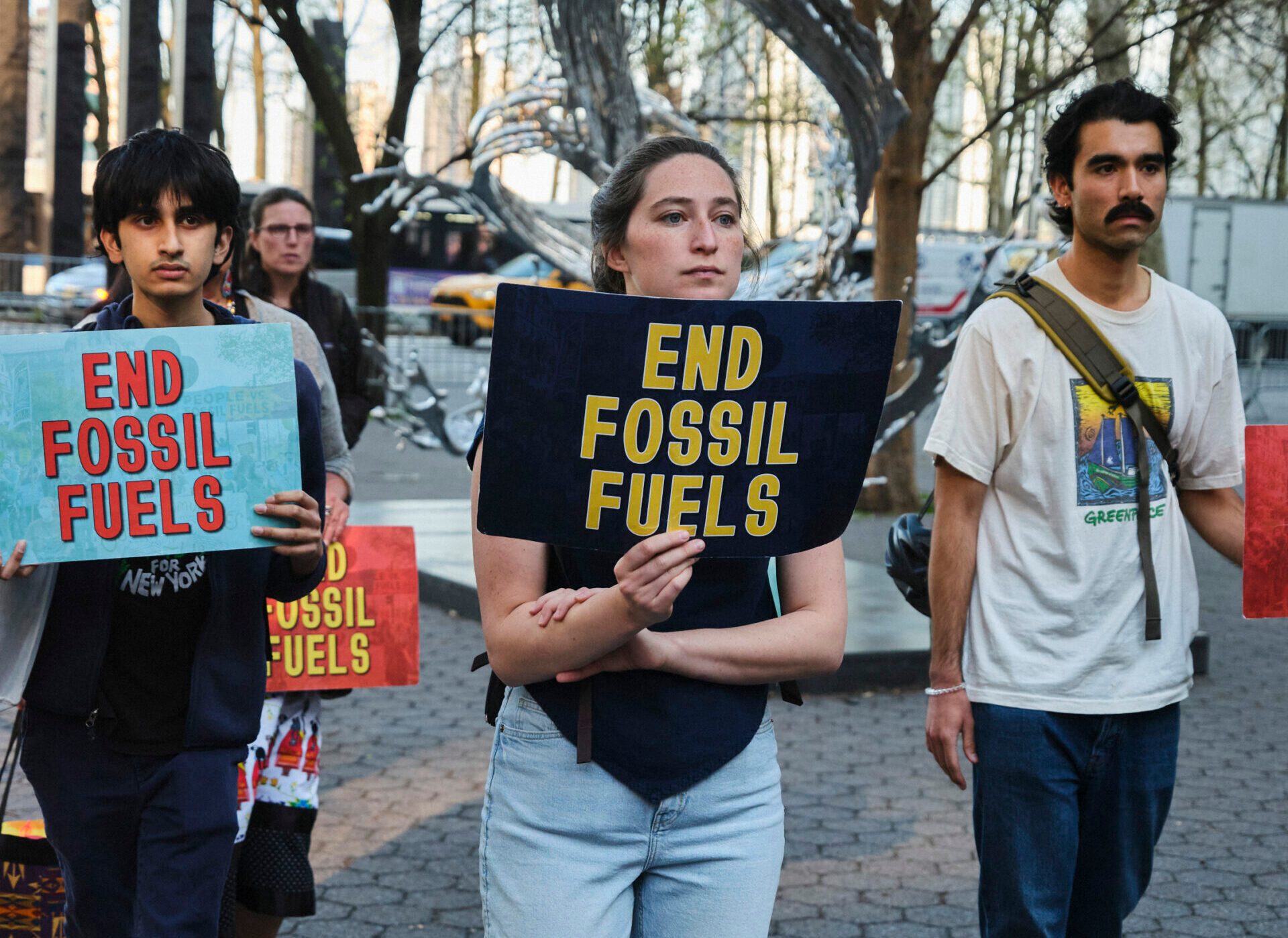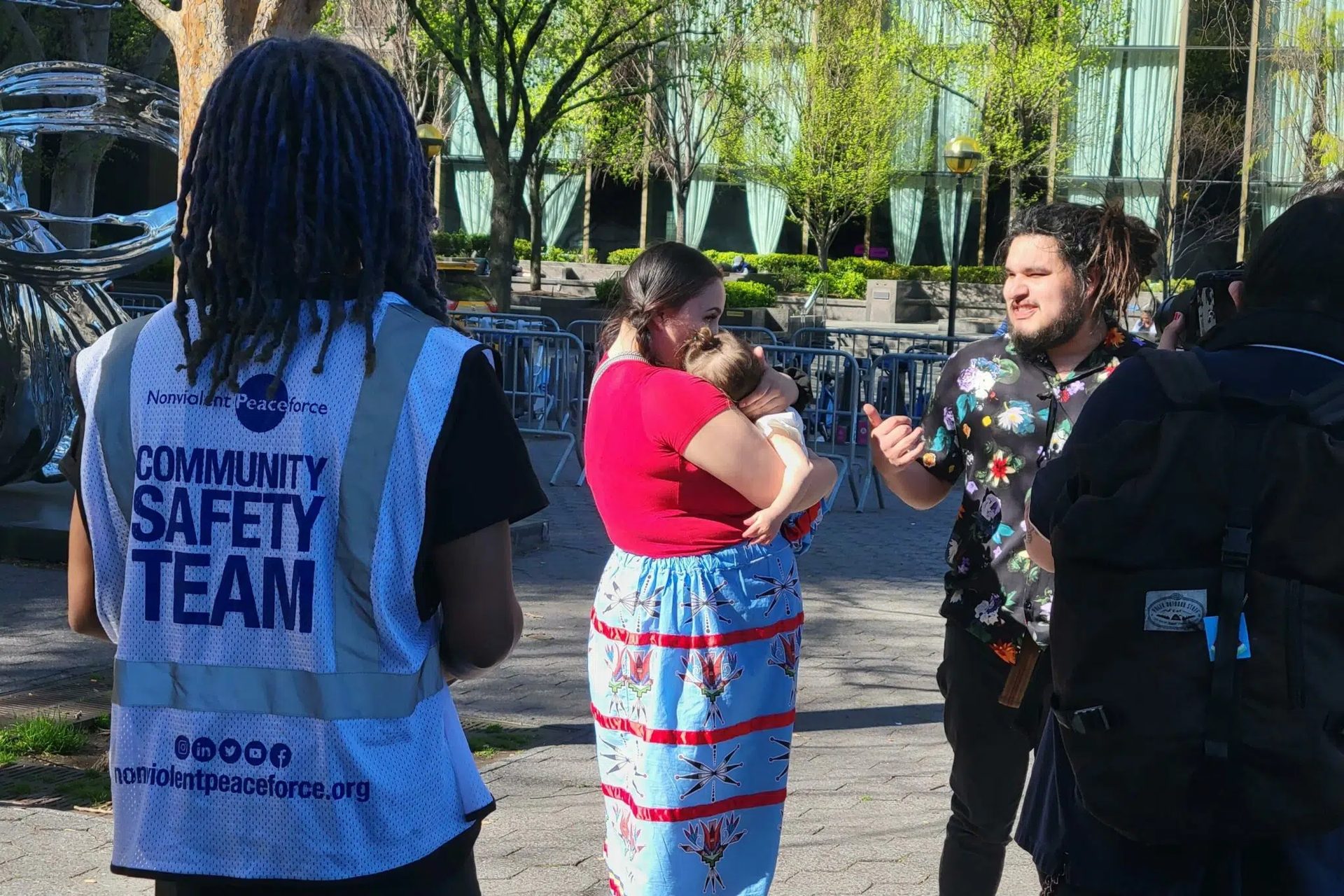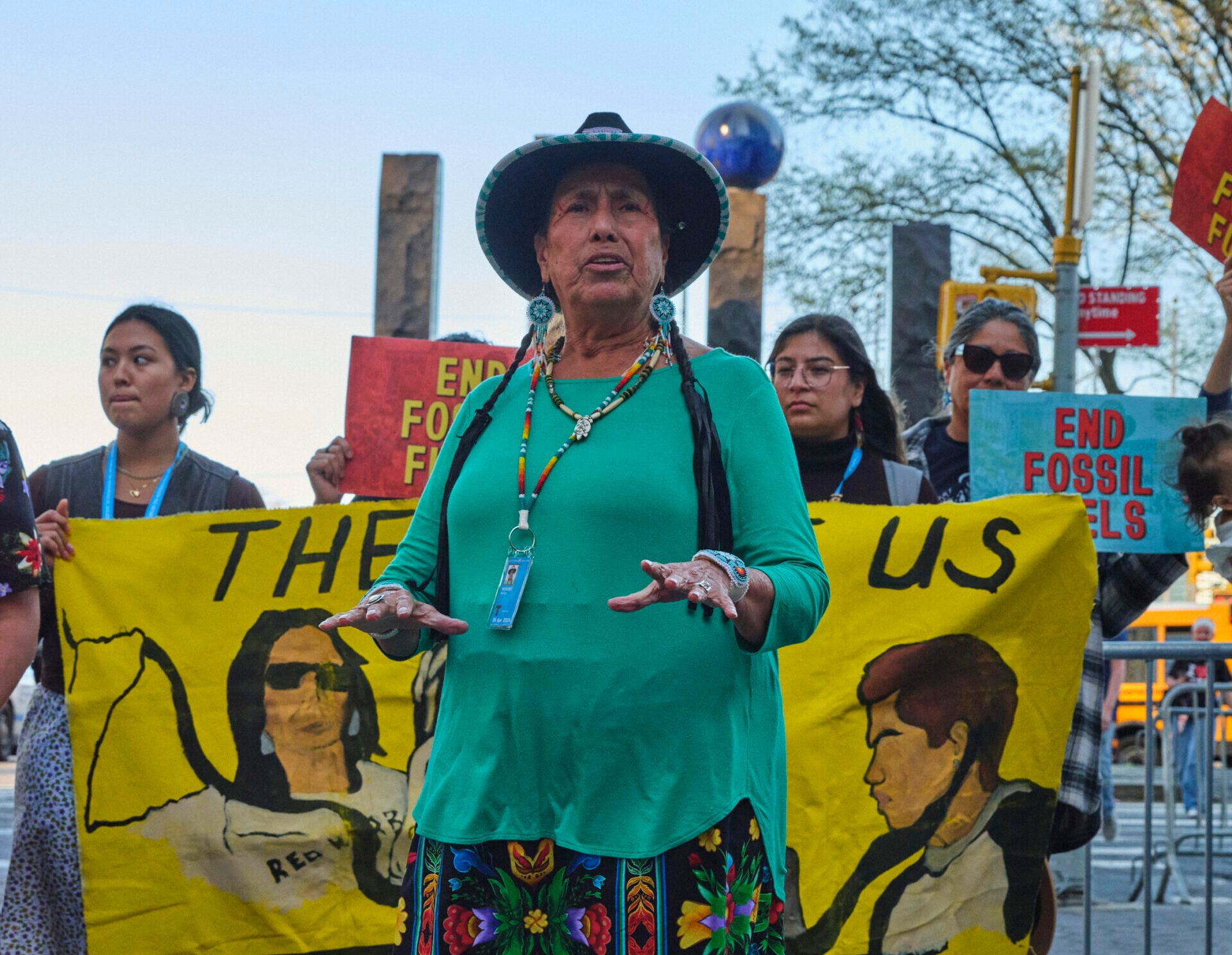
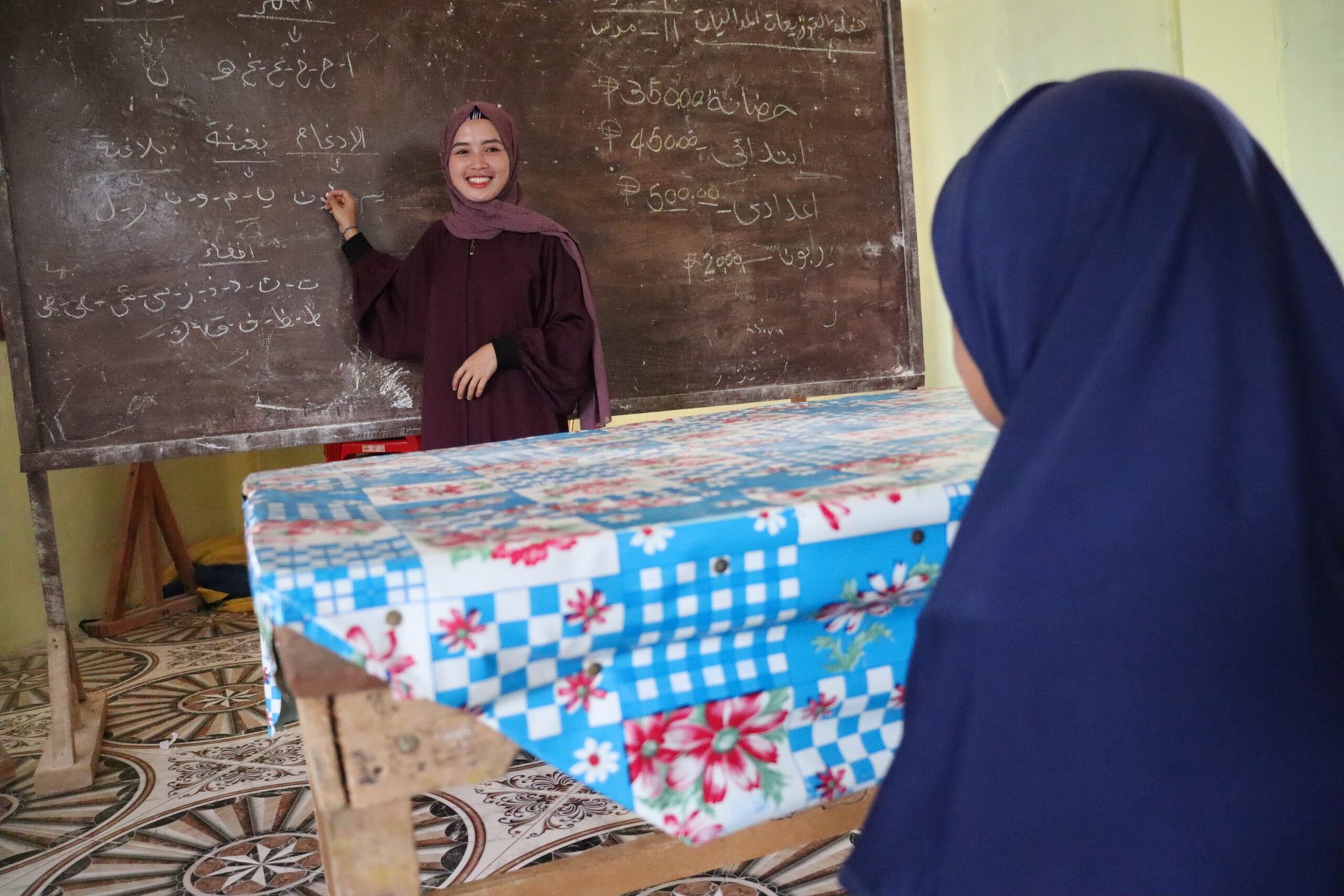
2024
If this past year has shown us anything, it’s this: No one is coming to save us — but no one has to face it alone. Our strength is solidarity. Our power is in collective action.
Community is the answer
annual Report
A message from Tiffany Easthom, Executive Director, and Deepa Sureka, Board Chair.
Header Image: Najah Untong, a 25-year-old teacher, Early Warning Early Response monitor and Youth Representative. Bangsamoro Autonomous Region, Philippines. 2024. © NP.
3258
Community Protection Team members active in South Sudan, leading safety work in their communities
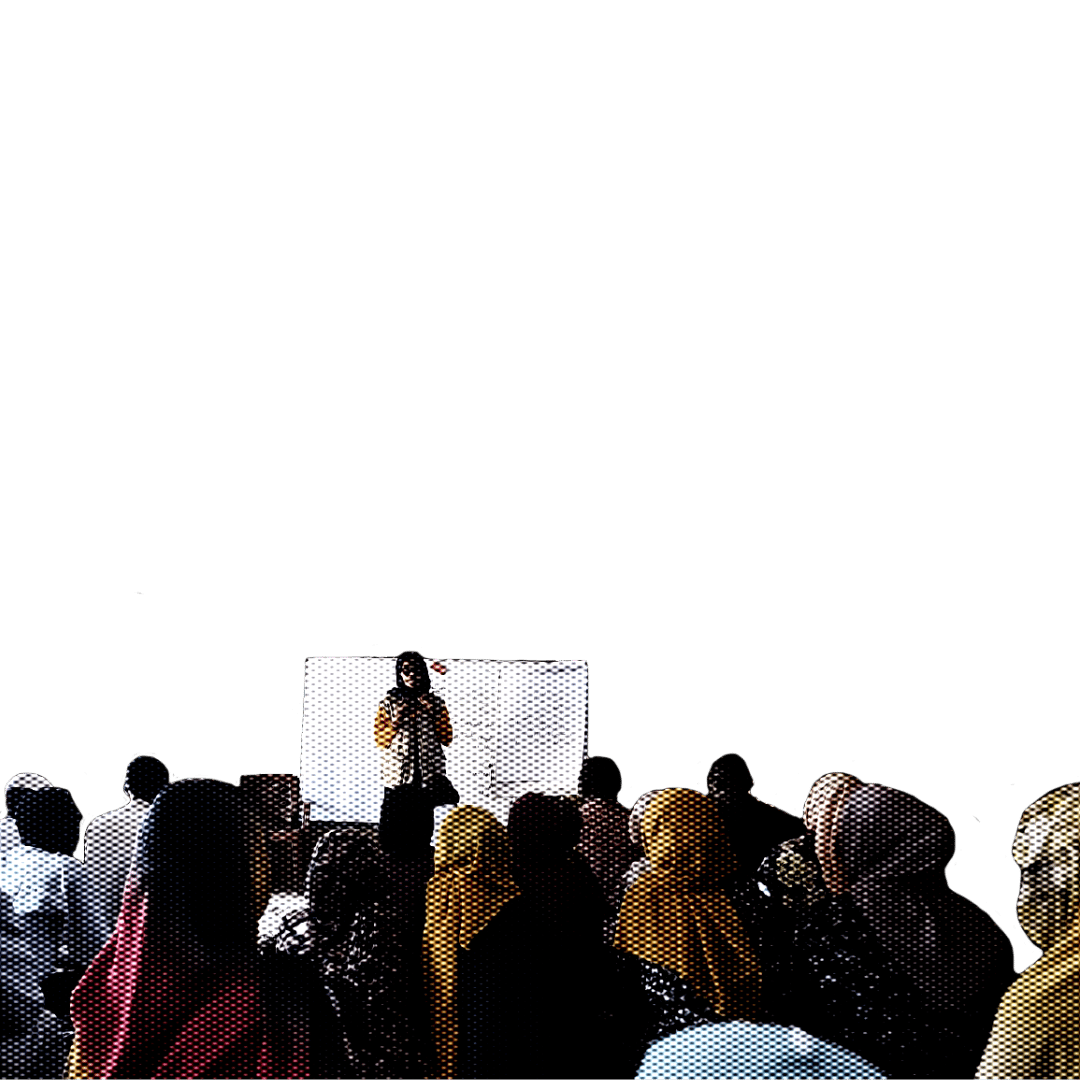
47
Early Warning Early Response Committee Volunteers alerting civilians of threats amid civil war in Sudan
Our impact goes beyond us. It ripples through communities, working alongside thousands to build peace, protect each other, and create lasting change.
949
+
Sets of ballistic vests and helmets shared with frontline humanitarian volunteers in Ukraine
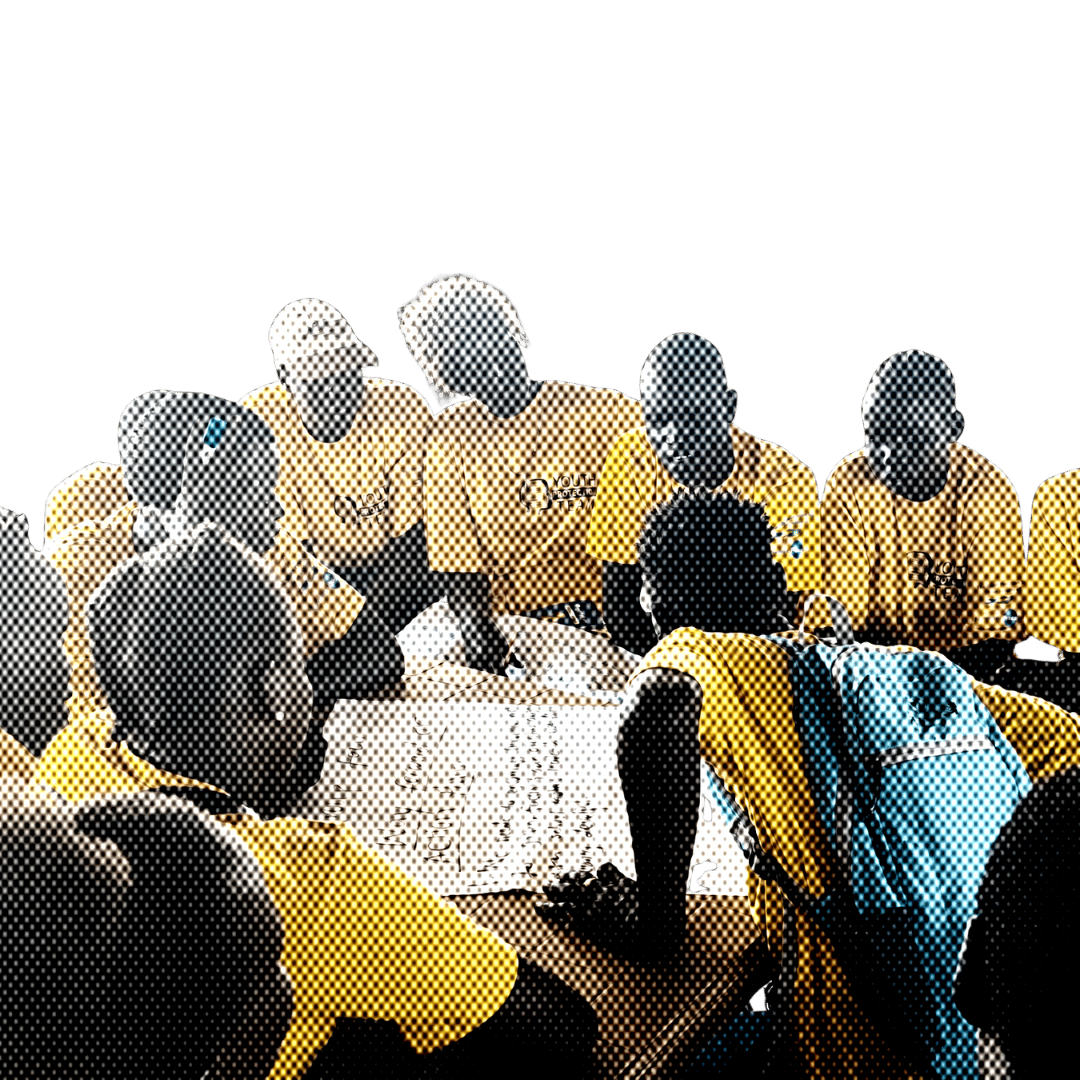
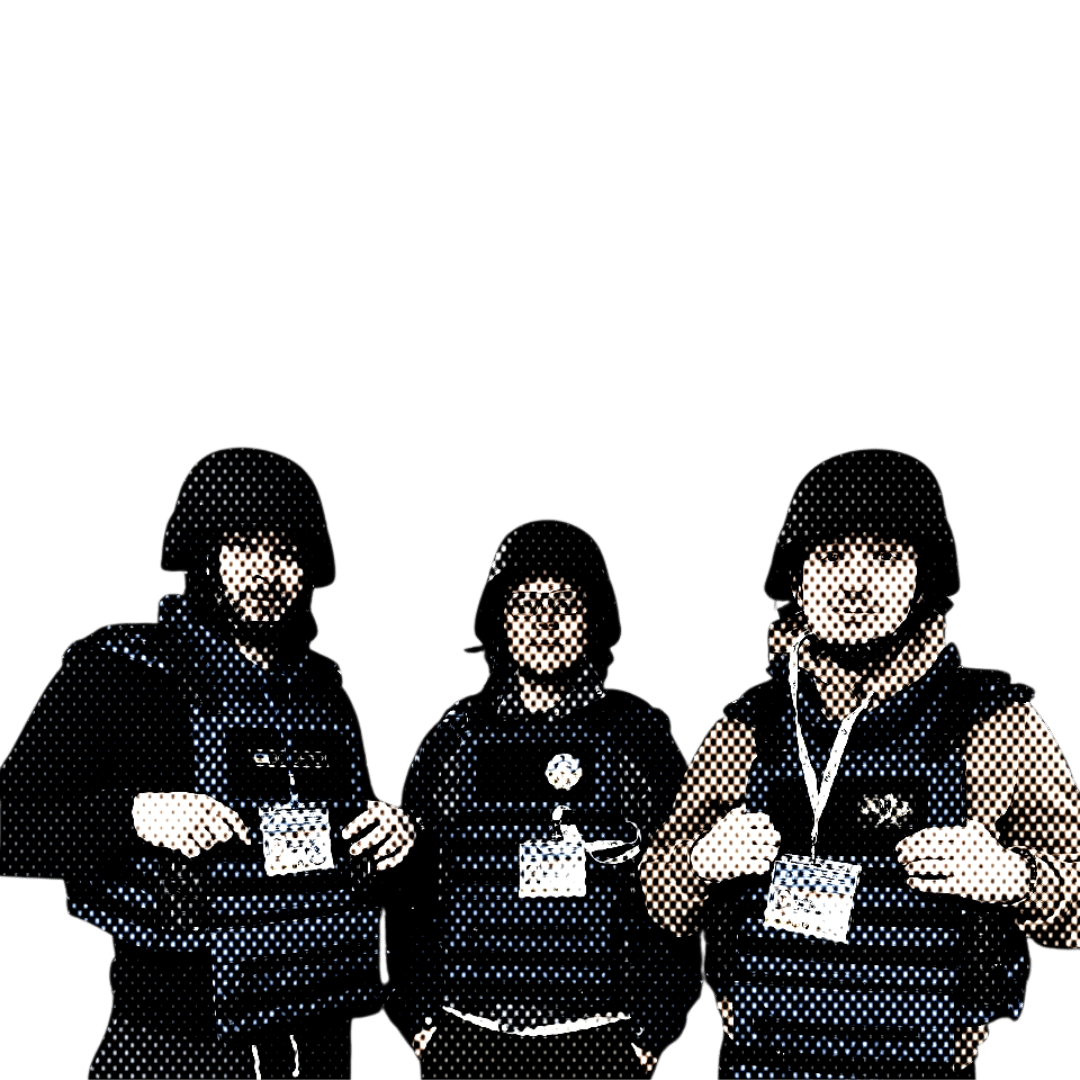

At Nonviolent Peaceforce (NP), we remain unwavering in our mission to protect civilians in violent conflicts through unarmed strategies, build peace side-by-side with local communities, and advocate for the wider adoption of these approaches to safeguard human lives and dignity.
Our evidence-informed, civilian-led approaches have protected tens of thousands of people around the world since our launch in 2002 — impacting millions more and helping communities live free from fear and become equipped to protect themselves and create sustainable peace.
NP envisions a worldwide culture of peace in which conflicts within and between communities and countries are managed through nonviolent means. We are guided by principles of nonviolence, non-partisanship, primacy of local actors, and civilian-to-civilian action.
Who We Are
Change is shaped boldly in community.
advocacy
Advocacy is central to how we protect civilians and promote nonviolence—bridging the gap between our work on the ground and the decisions made by governments and global institutions.
Through public messaging and direct engagement with decisionmakers, we work to shift the policies and narratives that shape civilian safety.
Our reports, case studies, and alerts provide a window into the realities communities face—and the solutions they are building. From elections to peacebuilding, food security to cross-border challenges, our publications spotlight the most urgent issues affecting civilian lives.
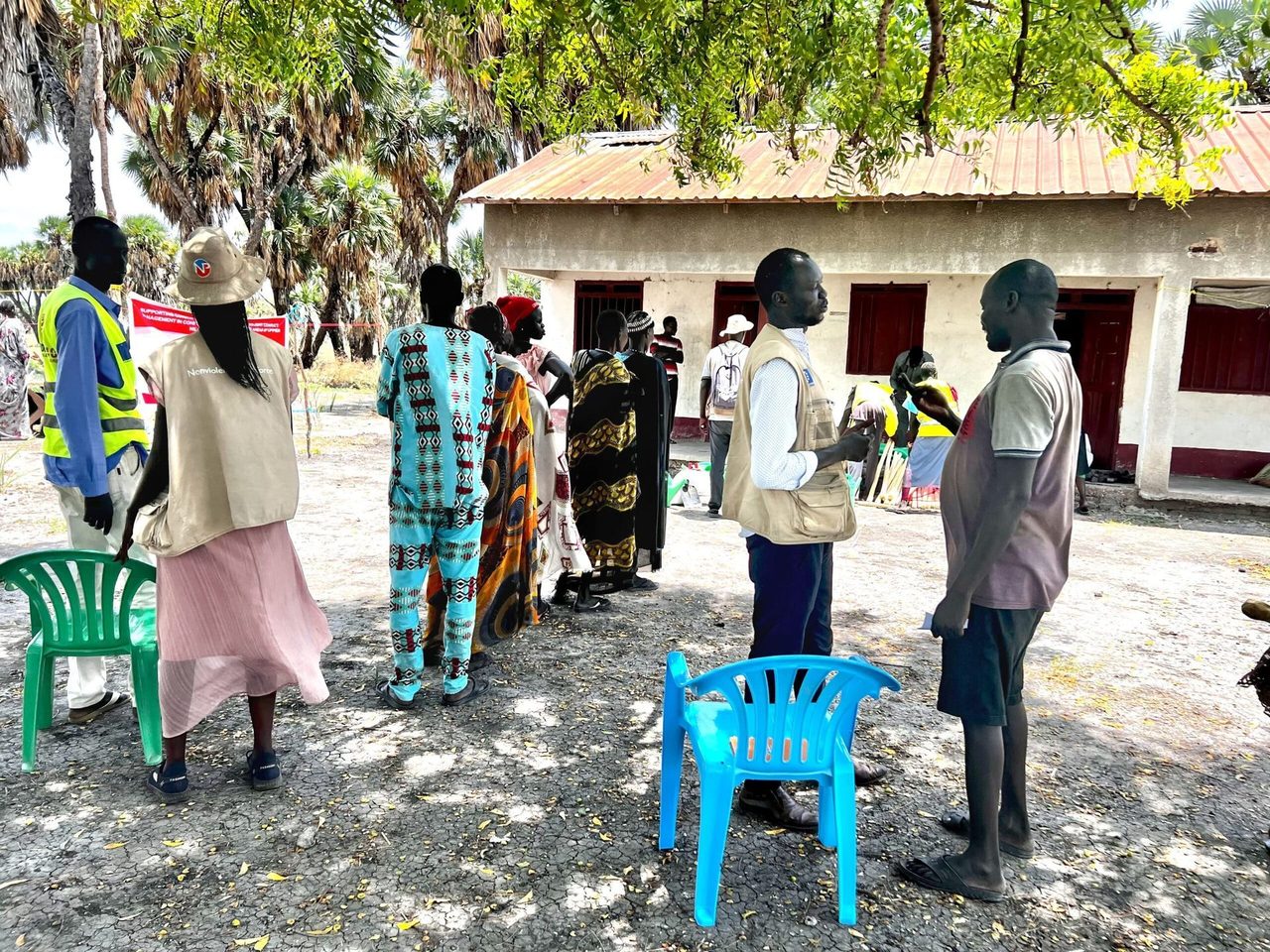
Climate responses
Resilience is cultivated together
in community.
- As climate shocks worsened, communities organized.
- Women led early warning systems and people with disabilities shaped response plans.
- In Lelo, tensions over resources sparked collective action and peace dialogues.
- Our role? Connect, amplify, and support these grassroots solutions.
Protection Mainstreaming during Solidaritès International's distribution of farming and fishing tools in Lelo and Warjwok Malakal County, South Sudan. © NP
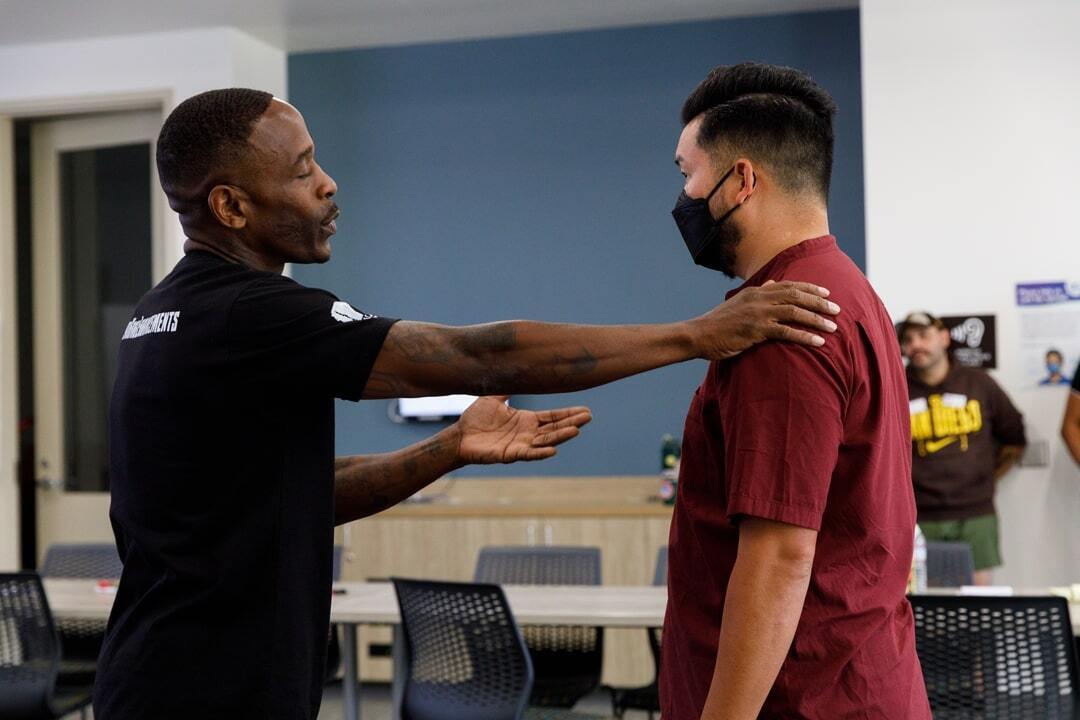
Care is practiced daily in community.
wellbeing
- We created intentional spaces for reflection and care — from small-group sessions to partner-led debriefs.
- Stronger care meant stronger protection, especially in emergency situations.
- In Ukraine, volunteers accessed tailored mental health support and peer circles, recognizing the layered trauma of war and displacement.
A moment of connection during an NP safety convening in San Diego, U.S.
© NP/Catalyst of San Diego and Imperial Counties
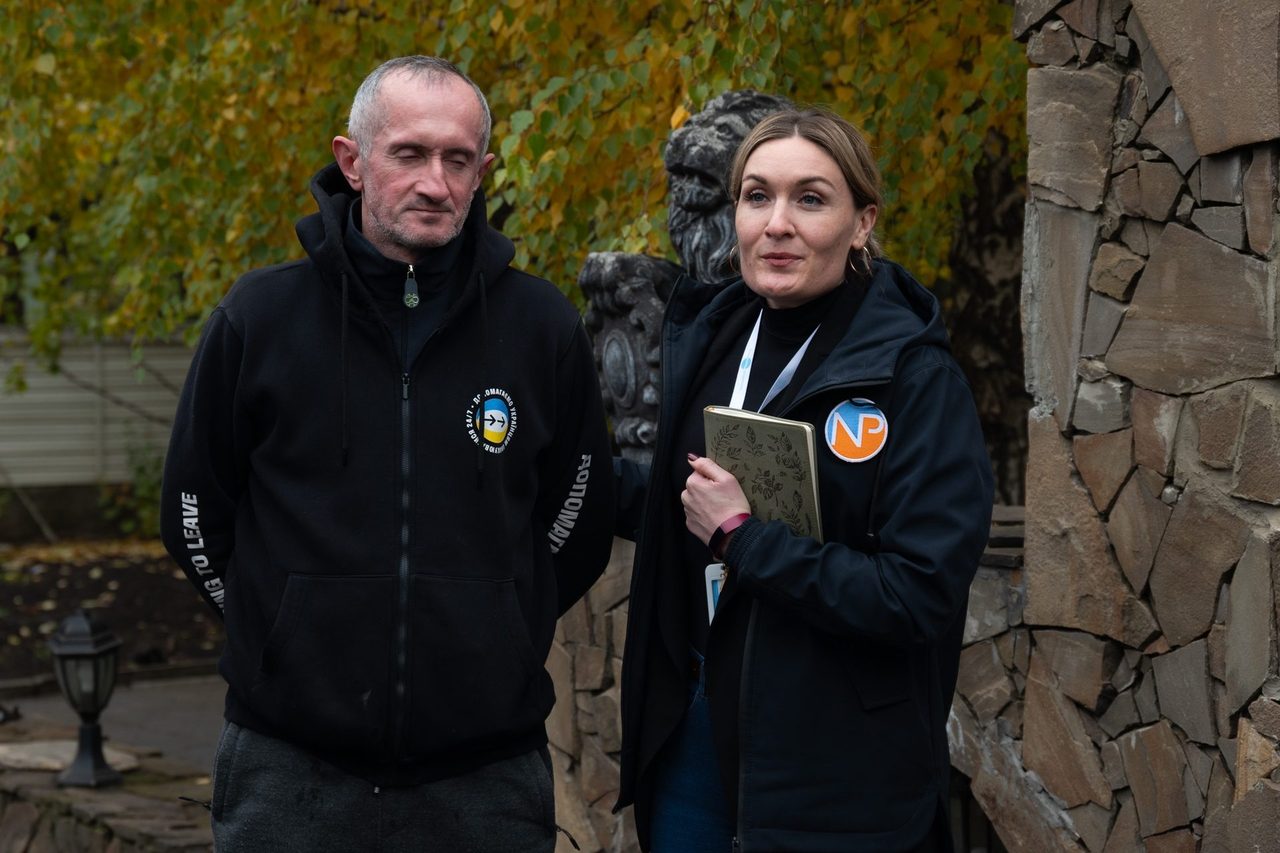
Power is shared in community.
partnerships
- Partnerships in 2024 were acts of deep solidarity, not just coordination.
- In Ukraine, we redesigned protection tools based on lived experience together with local volunteers. Read about Irina's story and a lifesaving incident in Antonivka.
- In the U.S., NP partnered with grassroots organizations to deliver community protection trainings rooted in nonviolence and shared leadership.
- Across all our work, we prioritized equity, transparency, and mutual accountability guided by those most affected.
NP staff with partner, Helping to Leave, at Zernove transit point. November 7, 2024. © NP
- Civilians face threats online and offline—and they’re responding to both.
- In Nineveh, Iraq, women peacebuilders countered disinformation and digital hate.
- In South Sudan, Philipe is using digital tools to bridge divides and strengthen his community.
- We championed digital policies that protect civilians, online and in real life.
- Protection must evolve with the tools of war— and the tools of peace.
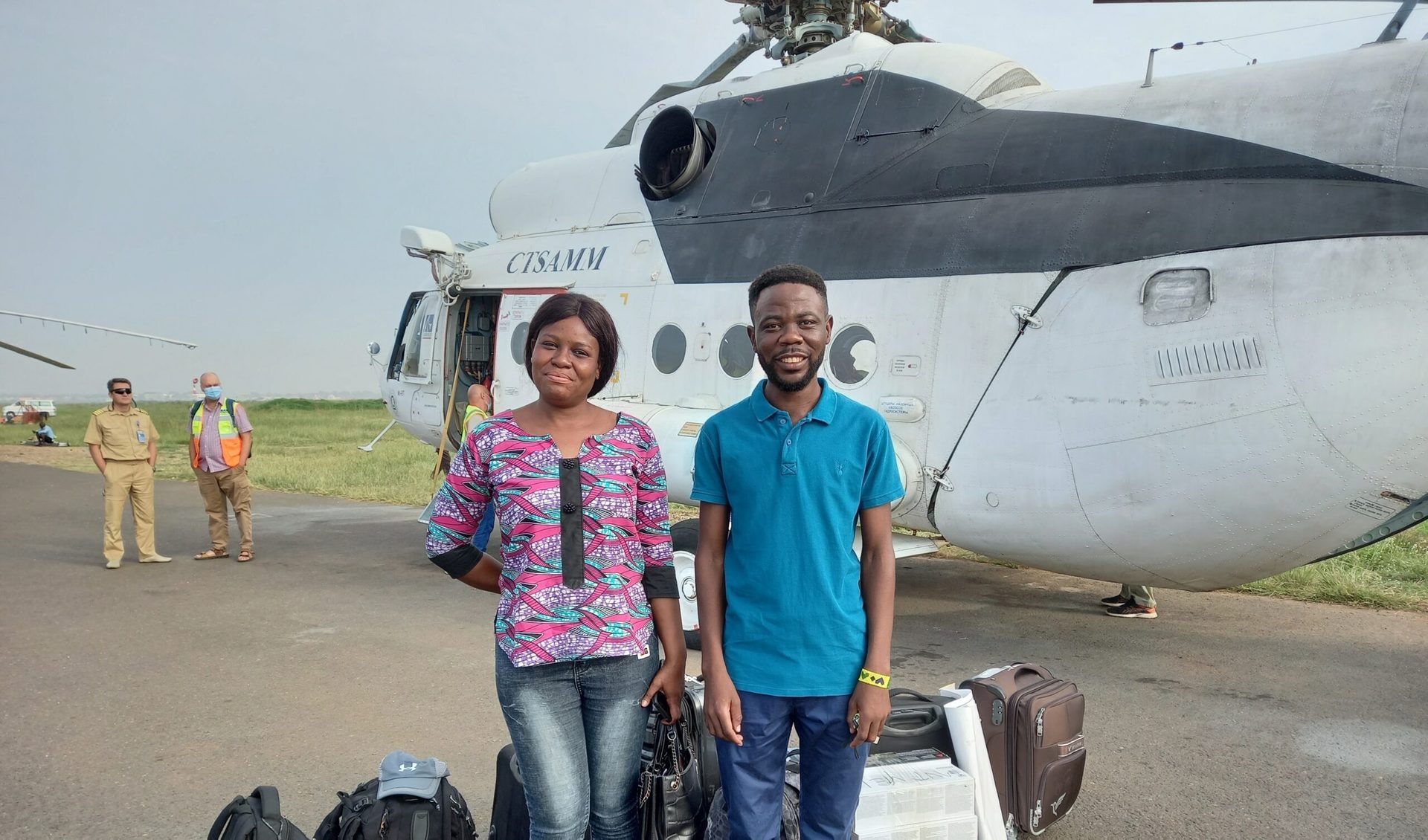
Risks are faced together in community.
digital protection
Ginana Philipe, NP Senior Protection Specialist in South Sudan and human rights activist and lawyer, sees digital literacy as critical to the role of safety and security. © Ginana Philipe
- Whether you’re volunteering, donating, amplifying, or advocating, this is your story too.
- The protection of civilians depends on connection, courage, and community.
- Together, we can shape a world where everyone is safe—and no one is alone.
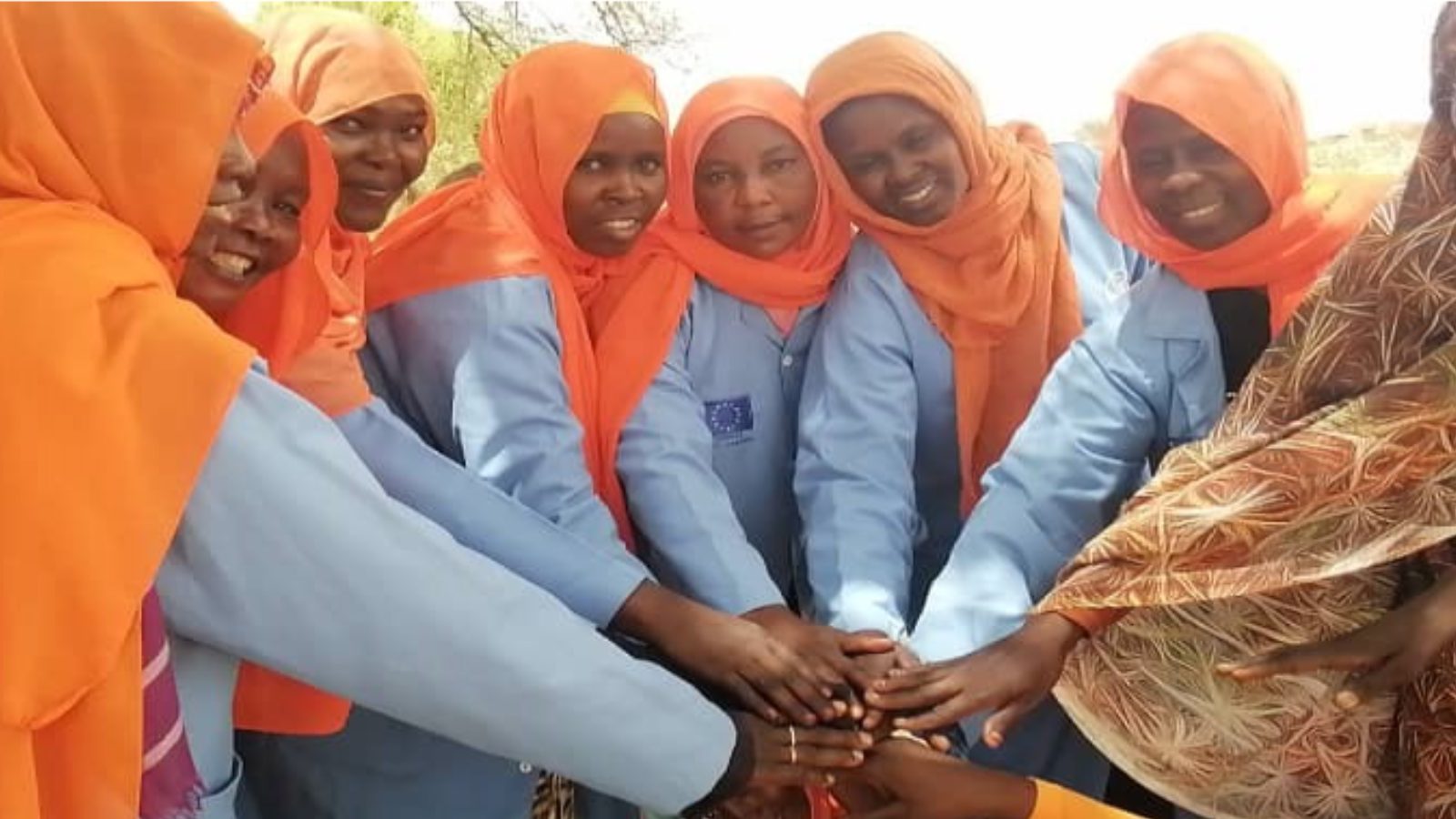
Protection rooted in community.
You're a part of
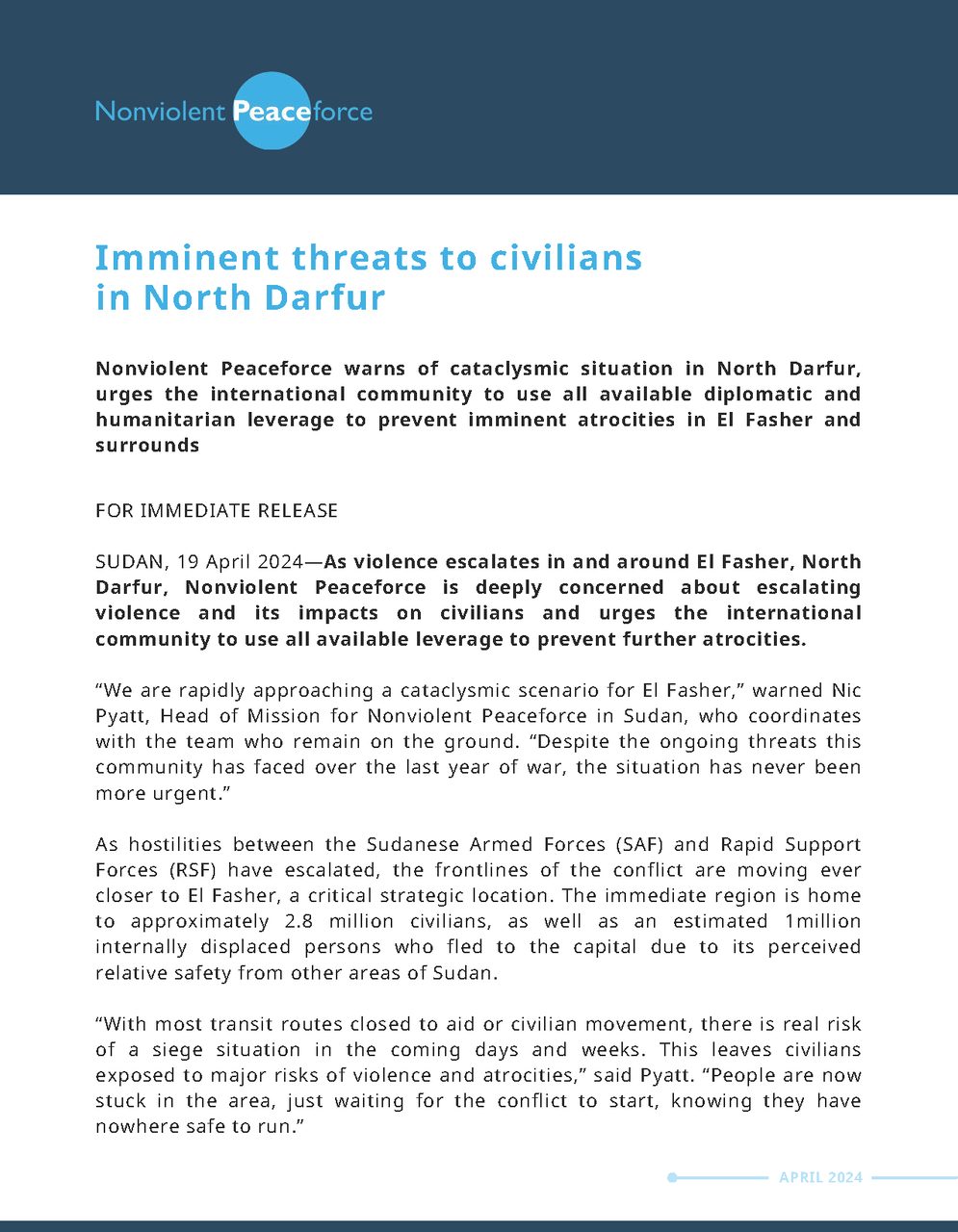
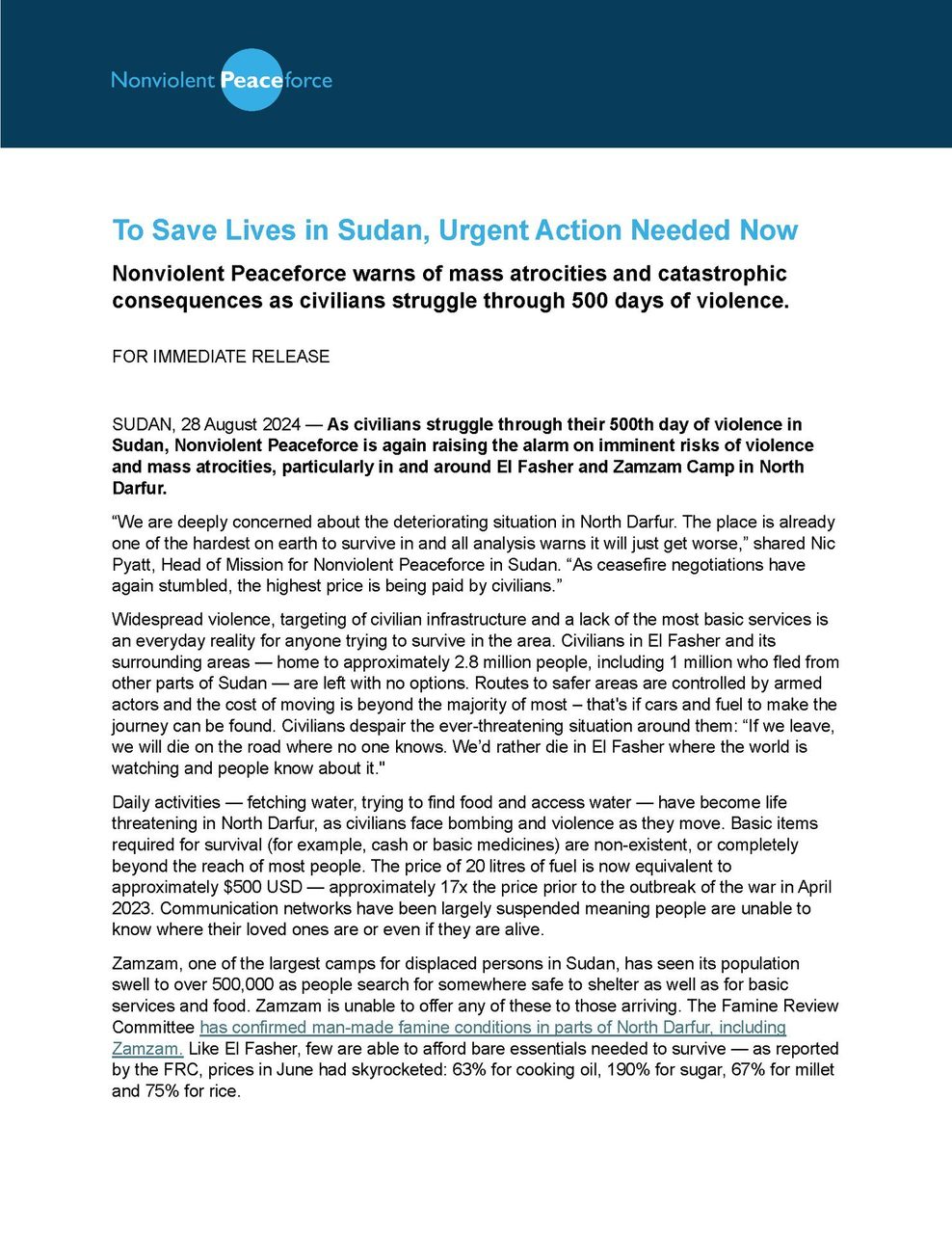
Protection through Advocacy
NP launched high-level advocacy to prevent atrocities. We raised the first alarms on the impending genocide in El Fasher. Our early warnings highlighted the risk to 600,000 civilians, catalyzing global attention and response. Our work helped bring Sudan onto the international agenda, prompting discussions at the UN Security Council and encouraging high-level leaders to speak out. As a result, governments took diplomatic steps to pressure the parties in the conflict to protect civilians.
Remaining through the Siege
When others fled, NP stood by local communities and community groups to support clinics, provide psychosocial support, support relocations of injured civilians and support local initiatives such as food and clothing collections for new IDPs.
We continued supporting the community protection teams to do what they could amidst the escalating risk – such as fixing water systems so people could at the very least have clean water, and supporting new IDPs to settle safely in Zamzam camp.
As Sudan’s civil war intensified and El Fasher came under siege in May 2024, NP was one of only five INGOs that remained in the city and Zamzam internally displaced persons camp. In the midst of famine, bombardment, and mass displacement, our Darfuri staff stayed on the ground—rapidly adapting to a high-risk humanitarian emergency. In North Darfur, 5 NP-supported Community Protection Teams became trusted protection leaders–evacuating people from frontlines of fighting and continuing to reduce gender-based violence during wartime.
Resiliency
amidst Crisis
Sudan
Early Warning Early Response Committee in North Darfur. 2023. © NP
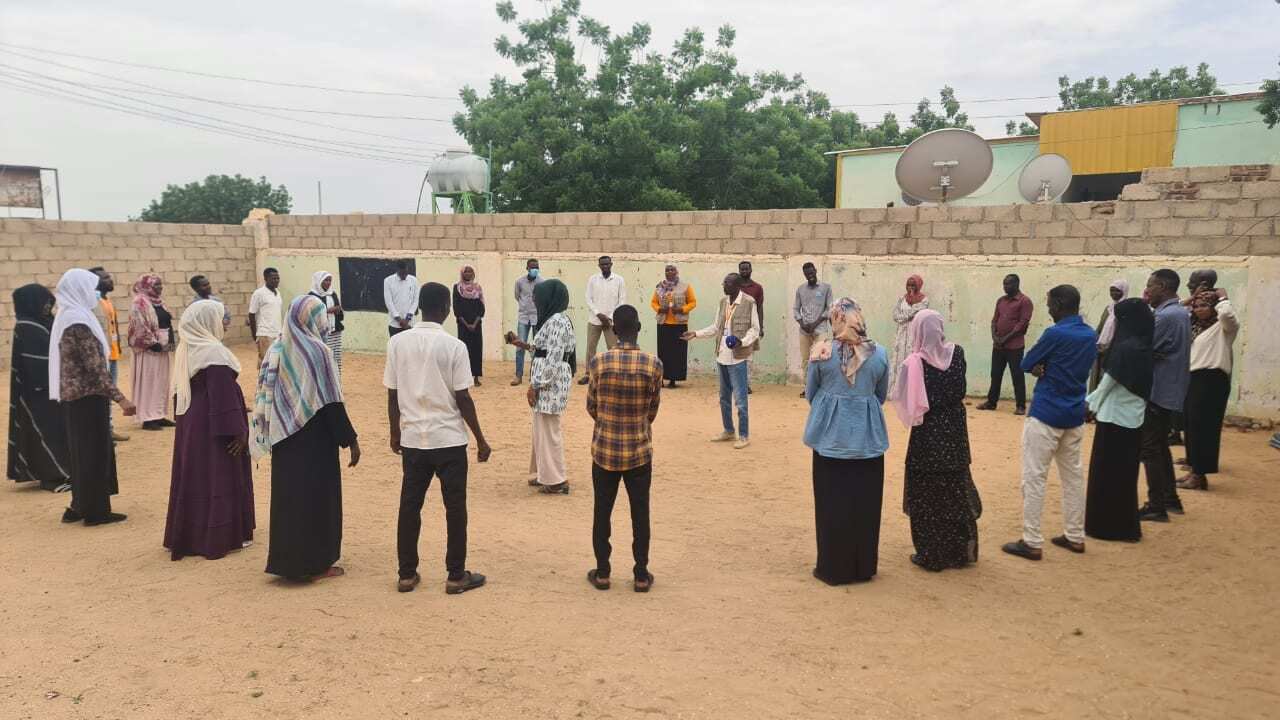
A message from Azaher Amara, NP Sudan Protection Officer.
"
Across South Sudan, almost 100 teams—68 Women Protection Teams and 29 Youth Protection Teams—play an active role in preventing violence in their communities. Amid ongoing political instability, worsening food insecurity, and an influx of people fleeing violence in neighboring Sudan, building the capacity of local, volunteer protection teams has proven critical. The teams’ insight, ownership, and flexibility to respond to threats as they arise has allowed the protection of civilians to continue even when support from international organizations and funding has ceased.
Sustainable Peace & Safety
SOUTH SUDAN
Tensions in the Upper Nile state, often from longstanding conflict with Arab nomads over food and land, have kept violence and the cycle of revenge present. Recognizing this, NP worked with Chief Dak’s community in Lelo, listening to their concerns and building on the community’s skills in nonviolent communication and de-escalation. In March, those skills were put to the test as NP facilitated a convening of local leaders and Arab nomads. The long-feuding groups successfully came to a mutual agreement of peace. As Chief Dak said to all present–nomads and local farmers alike–at the conclusion of the meeting: “So long as you are here, you become part of us.”
Building Common ground
Since 2015, NP has worked with youth in the Juba Protection of Civilians (POC) site to reduce gang violence through trust-building and inclusive engagement. In response to a rise in gang youth enrollment, from 439 in 2020 to 701 in 2023, NP trained Youth Protection Teams (YPTs) in life skills, conflict mediation, and GBV prevention. As trusted peers, YPTs led focus group discussions, supported gang disengagement, and encouraged alternatives to violence. Some gang members even left their groups to join the YPTs themselves.
In 2024, after hearing how gang members felt criminalized for incidents they say they weren’t involved in, further straining their relationship with the community, the YPTs facilitated a comprehensive dialogue—the first-ever face-to-face meeting between IDP gang members and community leaders. “Now the community and the gang have a connection,” one gang member shared.
These sustained efforts have led to a noticeable reduction in gang activity, with many former members starting businesses, becoming boda-boda riders, or returning to school.
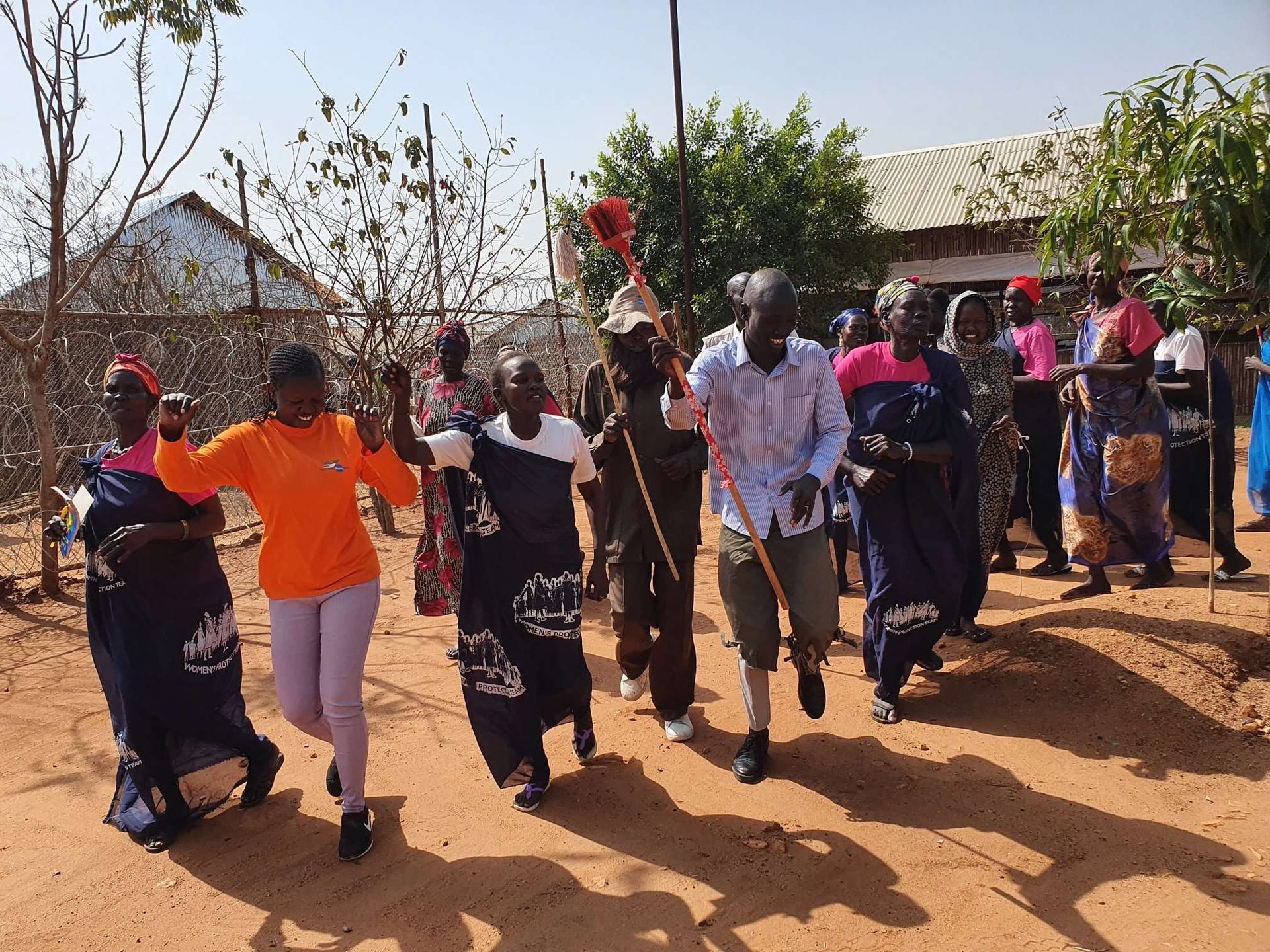
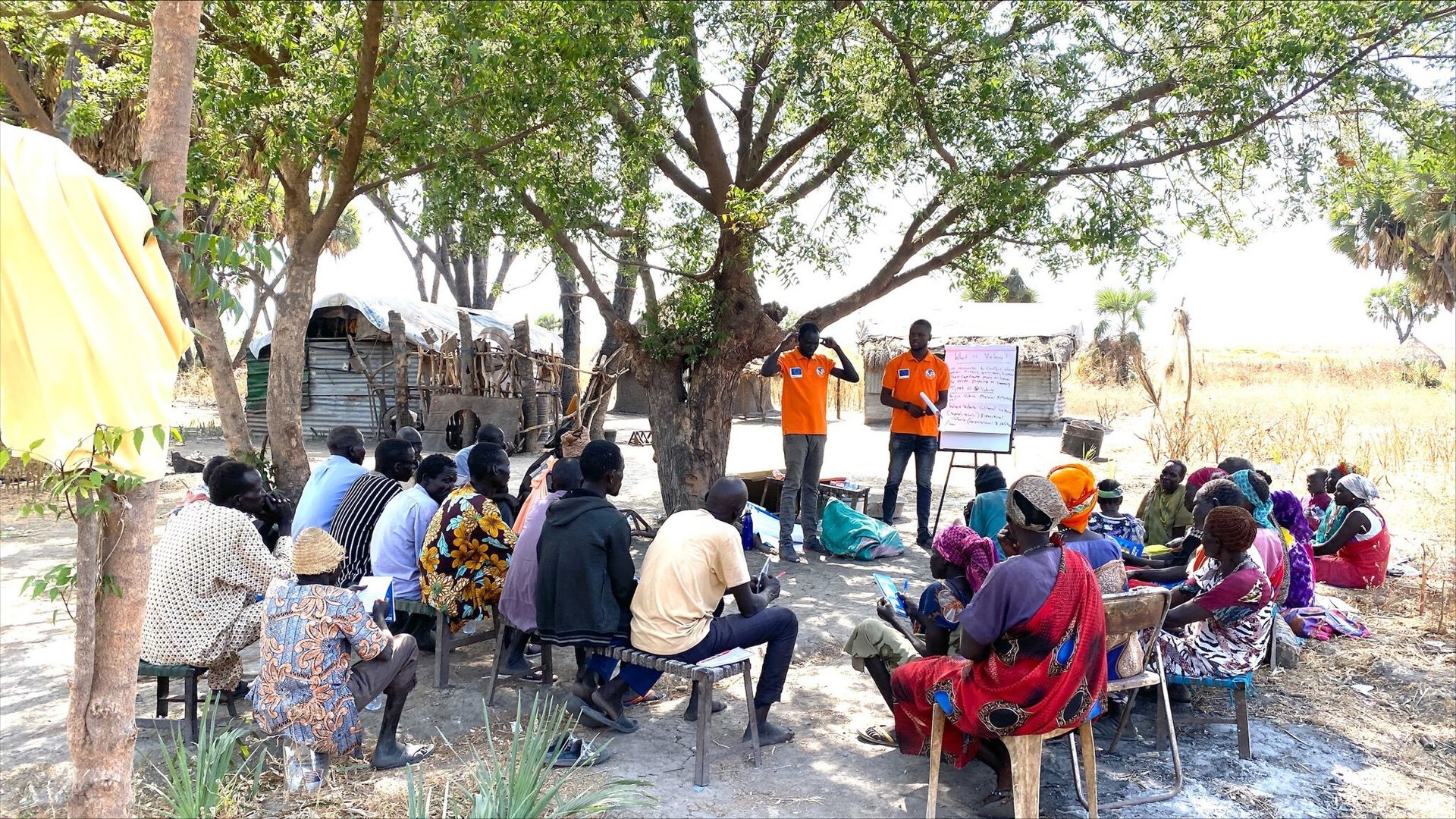
Youth Protection Teams Leading the Way
Juba IDP Camp. March 2025. © NP
A message from Rosemary Kabaki, NP South Sudan Head of Mission, and Juma Allan Ngare, National Protection Officer.
From Assessment to Action
Democratic Republic of Congo
In 2024, as UN peacekeepers prepared to leave eastern DRC, we joined with local leaders in South Kivu to ask a pressing question: who will protect civilians once the UN is gone? The answers were clear—displaced communities, overwhelmed security services, and civil society groups all faced urgent risks and needed sustained support.
In that year we completed a comprehensive assessment of the region on protection needs and local capacities, laying the groundwork for a full program. In 2025, we’re acting on what we heard—supporting local protection teams, training women and youth leaders, and strengthening networks that can help communities stay safe long after the international spotlight fades.
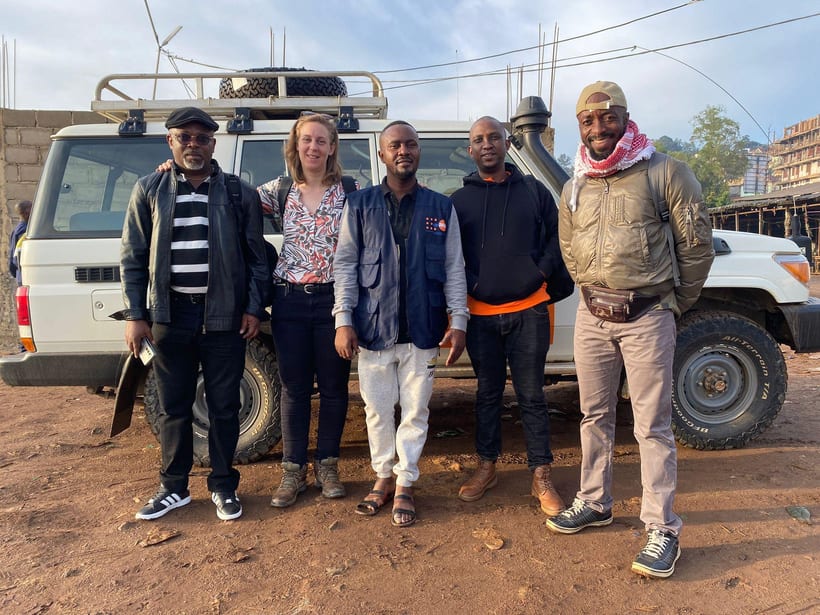
DRC Assessment. March 2024. ©NP
"
In 2024, NP’s Volunteer Insurance Program and Volunteer Resilience Program continued to meet the evolving needs of local volunteers—offering personal protective equipment, emotional support, confidential counseling, and access to health and life insurance. “It is something that I never thought would come to the volunteer community — someone talking to me about my needs,” one volunteer shared. These initiatives prioritize the physical and mental well-being of frontline responders—because when we protect the protectors, we help entire communities stay safe.
Adapting our Response to Ukrainians
Local volunteers can’t step away from the crises they’re living through—and this can lead to burnout and exhaustion. NP’s Volunteer Hub in Kherson, launched in 2024 thanks to the collective efforts of the HAVEN Consortium, offers a safe space to rest, recharge, and connect. Now used by multiple groups, the Hub has become a center for collaboration—sparking joint efforts like shared aid distribution. “We finally stopped playing solo and are now making small steps towards a fruitful cooperation,” says Alina, Co-Director of a locally led organization in Kherson.
volunteer hubs
Since the early days of the war, the humanitarian response in Ukraine has been defined by local volunteer leadership—often stepping in where international actors won’t. In 2024, NP remained on the ground, connecting local needs to resources and amplifying the work of grassroots volunteer networks.
Taking the lead from locals
ukraine
743
volunteers accessed free, confidential counseling through the Volunteer Resilience Program—a critical lifeline amid the ongoing stress of war.
+
DON HUB in Kramatorsk. 2024. ©NP
Kharkiv Railway Station before and after refurbishment initiative with the HAVEN Consortium. February - March 2024. ©NP
A message from Anastasiya Marchuk, NP Ukraine Head of Mission.
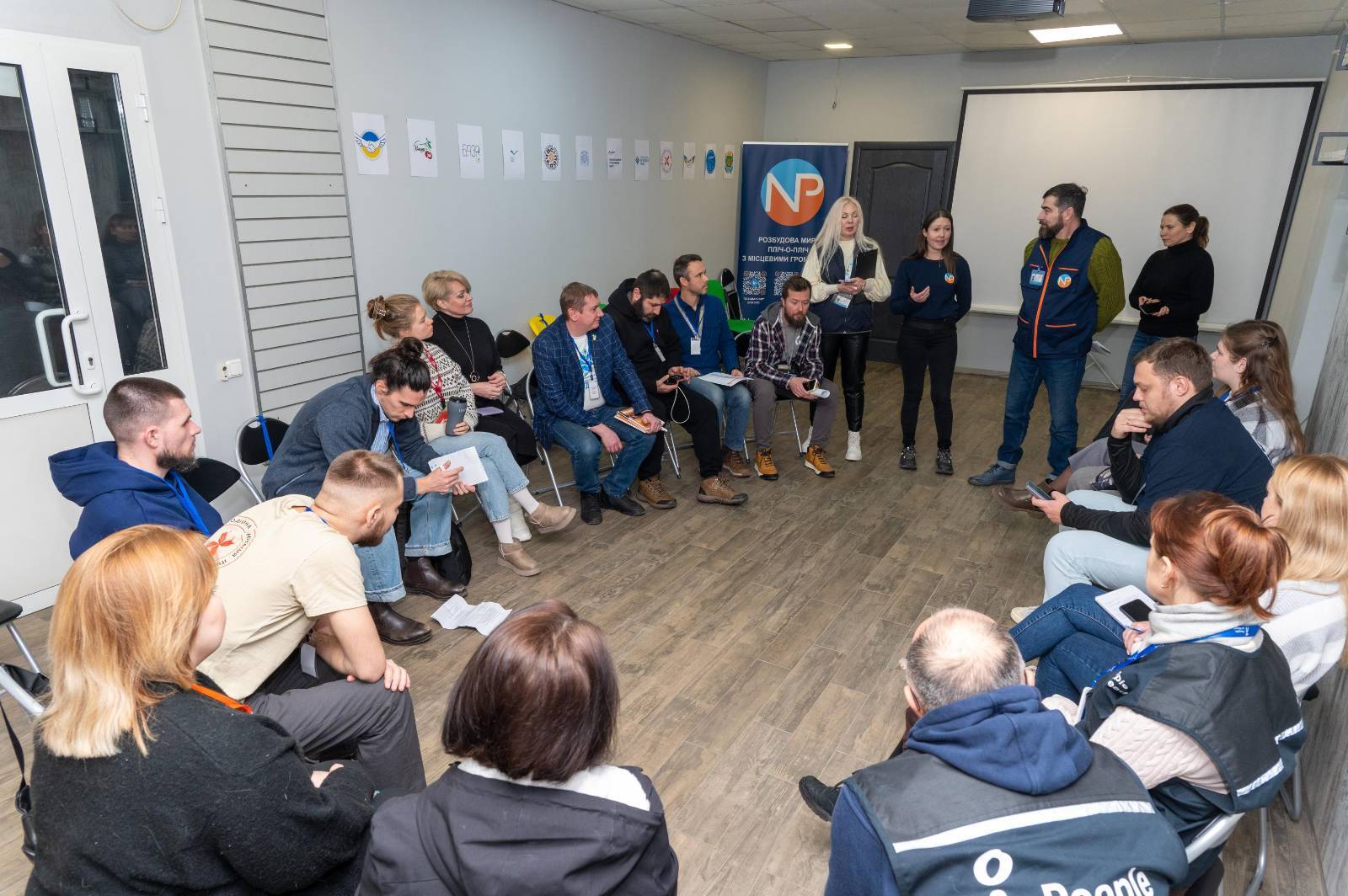
Rebuilding trust and relationships
Iraq
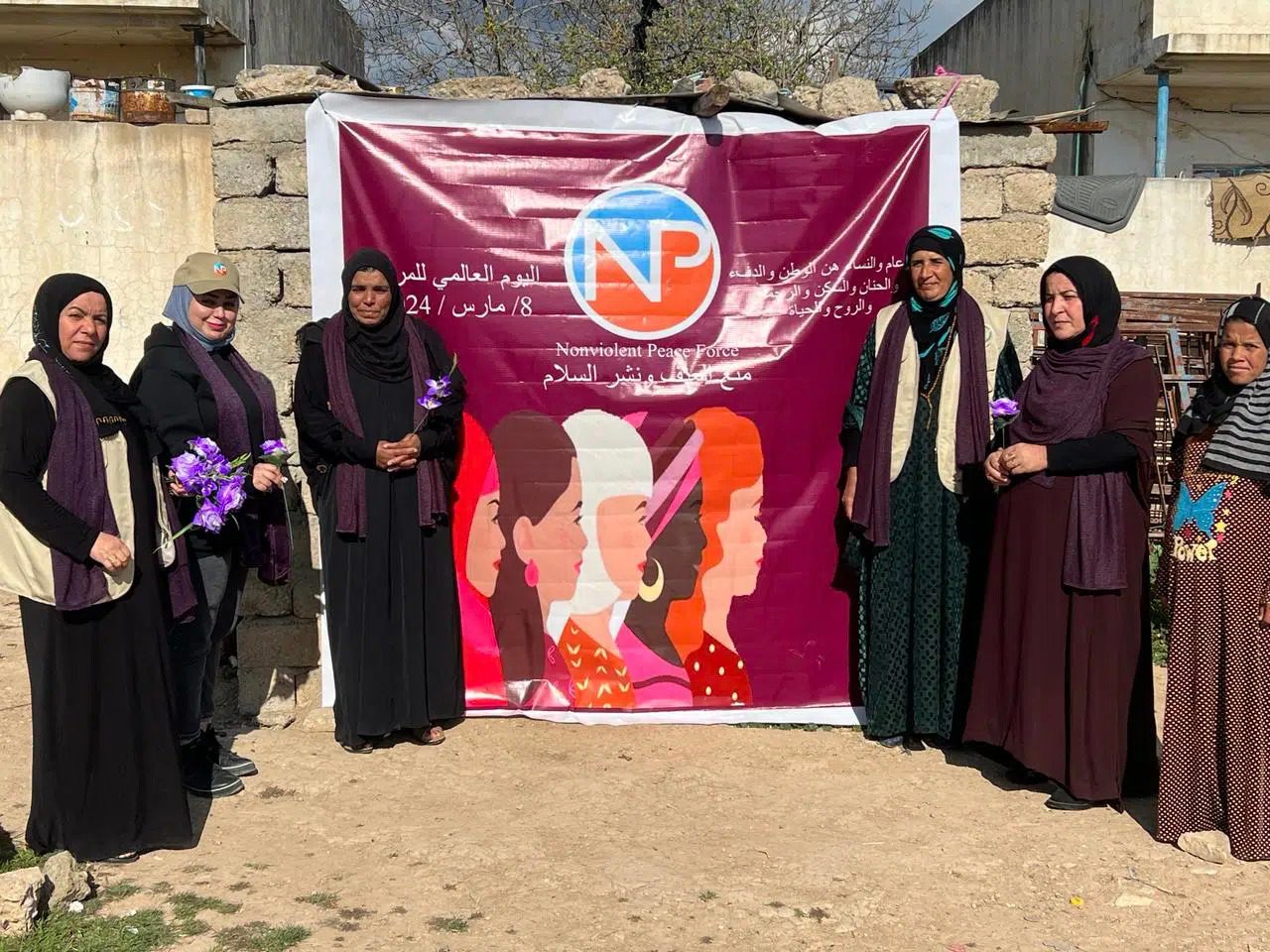
After years of war and displacement, communities in northern Iraq remain divided by grief, fear, and stigma. Women from ISIS-affiliated families and those who lost loved ones at the hands of ISIS are now working side by side—training in nonviolence, sharing stories, and rebuilding trust. NP supports 17 Community Peace Teams, with ~200 members total. These teams are proving that connection and empathy can spark reconciliation, even where it once felt impossible. >> Read stories of Women Peace Teams across Ninevah
Sparking Reconciliation
International Women's Day celebrations. March 14, 2024. © NP
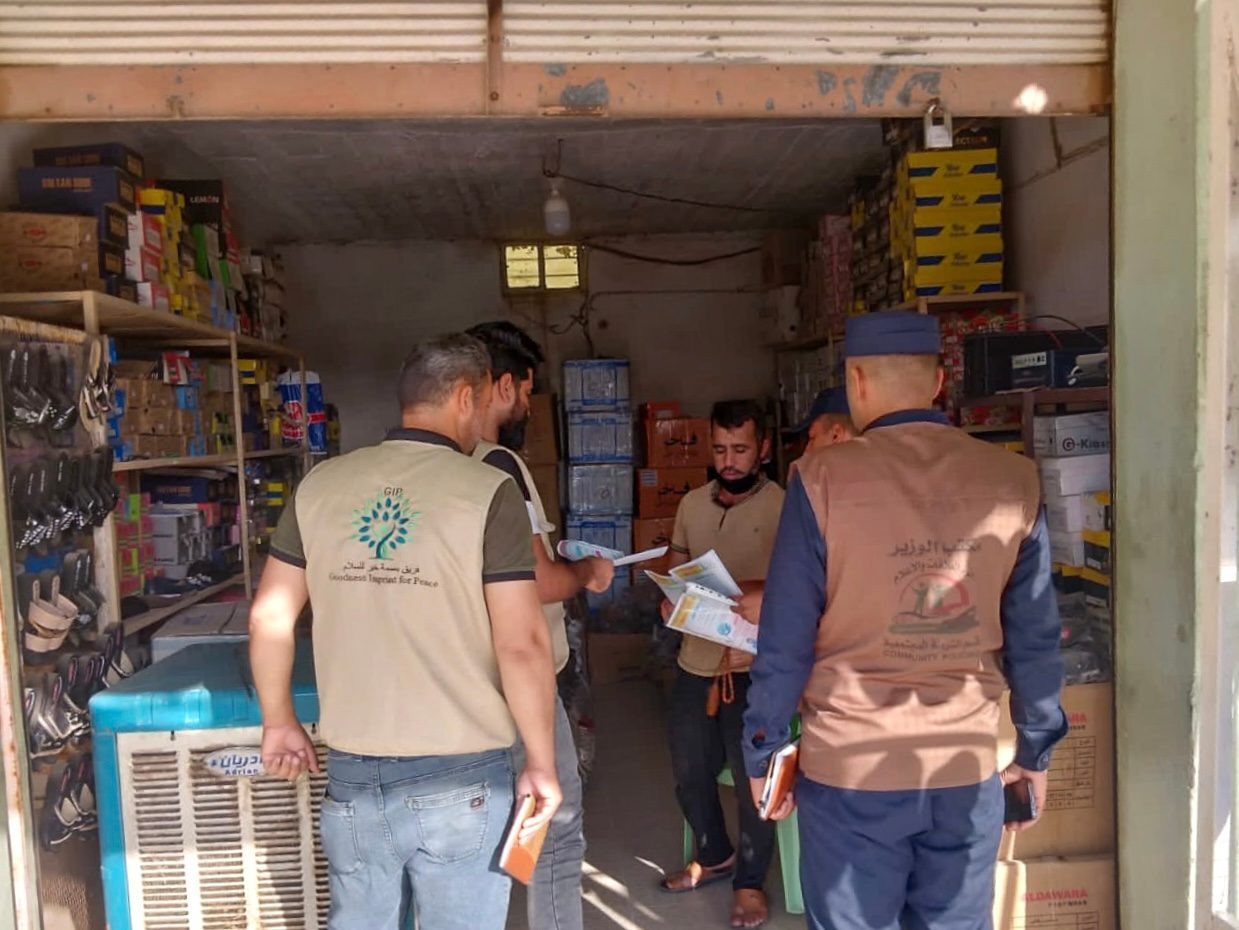
Whether patrolling schools to prevent harassment, mediating old feuds, or coordinating with security forces, Community Peace Teams are making peace visible and tangible. Their presence in marketplaces and parks is not just about safety—it’s about reclaiming public space for all, especially women and youth. Peace isn’t passive. It’s being practiced in everyday moments. >> Read Ahmed and Ali’s story
Peace is a Public Act
Community Peace Team in Qayyarah, South Mosul. 2024. ©NP
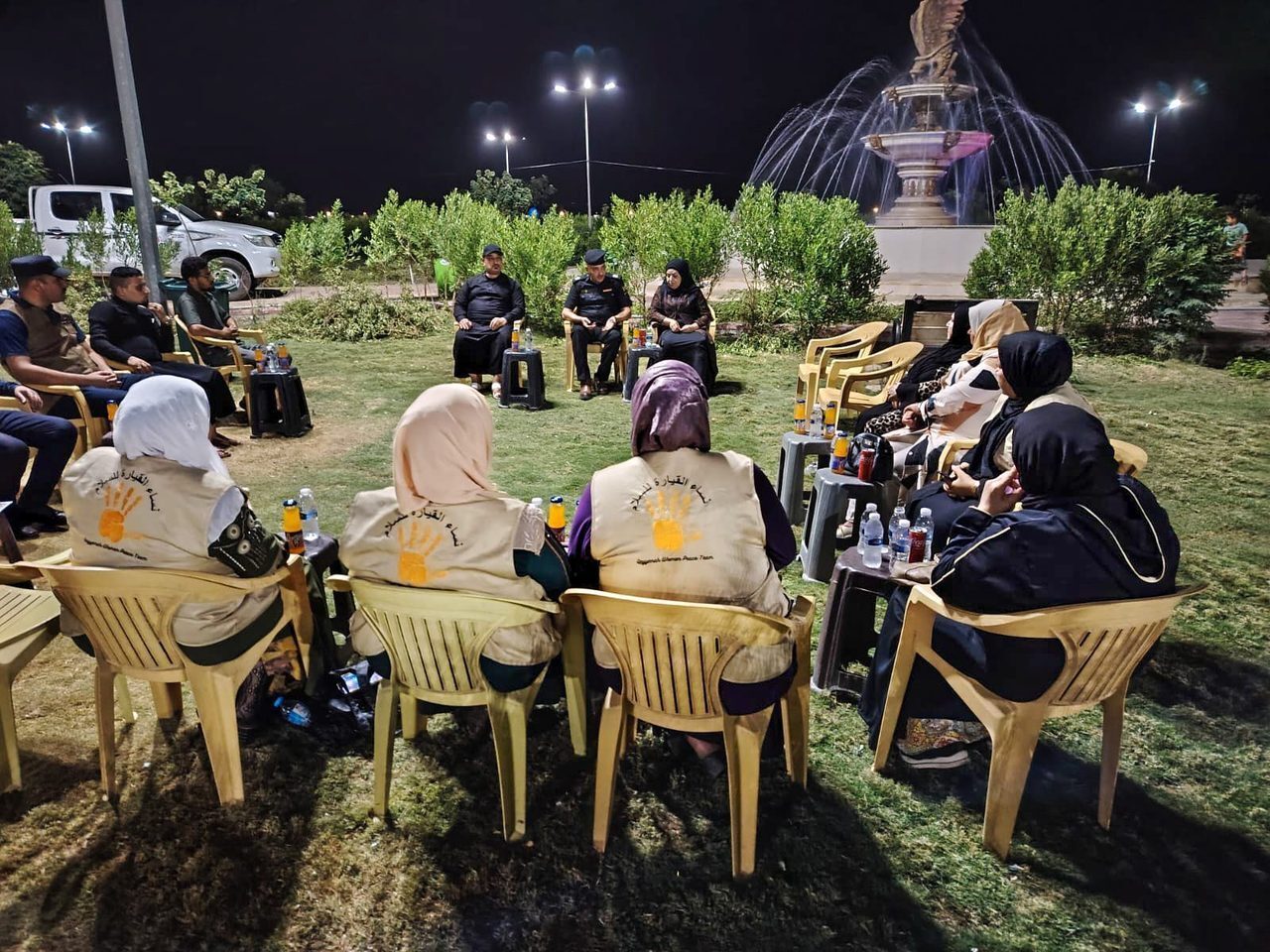
Safety isn’t just about stopping physical violence—it’s also about violence perpetrated in digital spaces. In 2024, NP and Community Peace Teams brought community leaders and local police together to address issues like online extortion and domestic violence. Women and girls face the persistent threat of having a man use a real or created photo of them to demand money or sexual favors in exchange for privacy. In this culture, a private image going online means complete ruin of the woman’s reputation. With NP and the Community Peace Team’s support, women and girls know of their options for reporting and stopping this extortion, and local government and police now respond to keep the women safe. >> Dive deep into confronting digital extortion in South Mosul
Bridging Divides
Discussion about online extortion issues between women from the community, women peace team, and community police, South Mosul. © NP
A message from Basheer Adil Saoud, National Protection Offer, Iraq.
Protective Presence
myanmar
"
Local farmer
Early Warning, Early Response
philippines
In Mindanao, peace is more than a long-term goal—it’s a daily choice, built by communities working together to prevent violence before it starts. NP supports a growing network of community leaders, women’s groups, and local authorities who are transforming their villages into safer places—by spotting risks early and responding as a collective.
Husseina is the daughter of a former commander—and the president of her community’s Early Warning Early Response network. Her work often means stepping in before violence escalates: mediating conflicts, stopping harmful rumors, and quite literally climbing mountains to assess threats. In one instance, she rode on horseback to investigate reports of armed group activity. Upon learning the reports weren’t true, she was able to prevent an unnecessary displacement of villagers.
Her story shows what’s possible when women lead in peacebuilding. “As a woman, I can go places men often can’t during conflict. I can listen to the quiet threats and act early.” With NP’s training and coordination support, women like Husseina are building everyday peace—and showing that prevention is protection.
Women at the Frontlines of Prevention
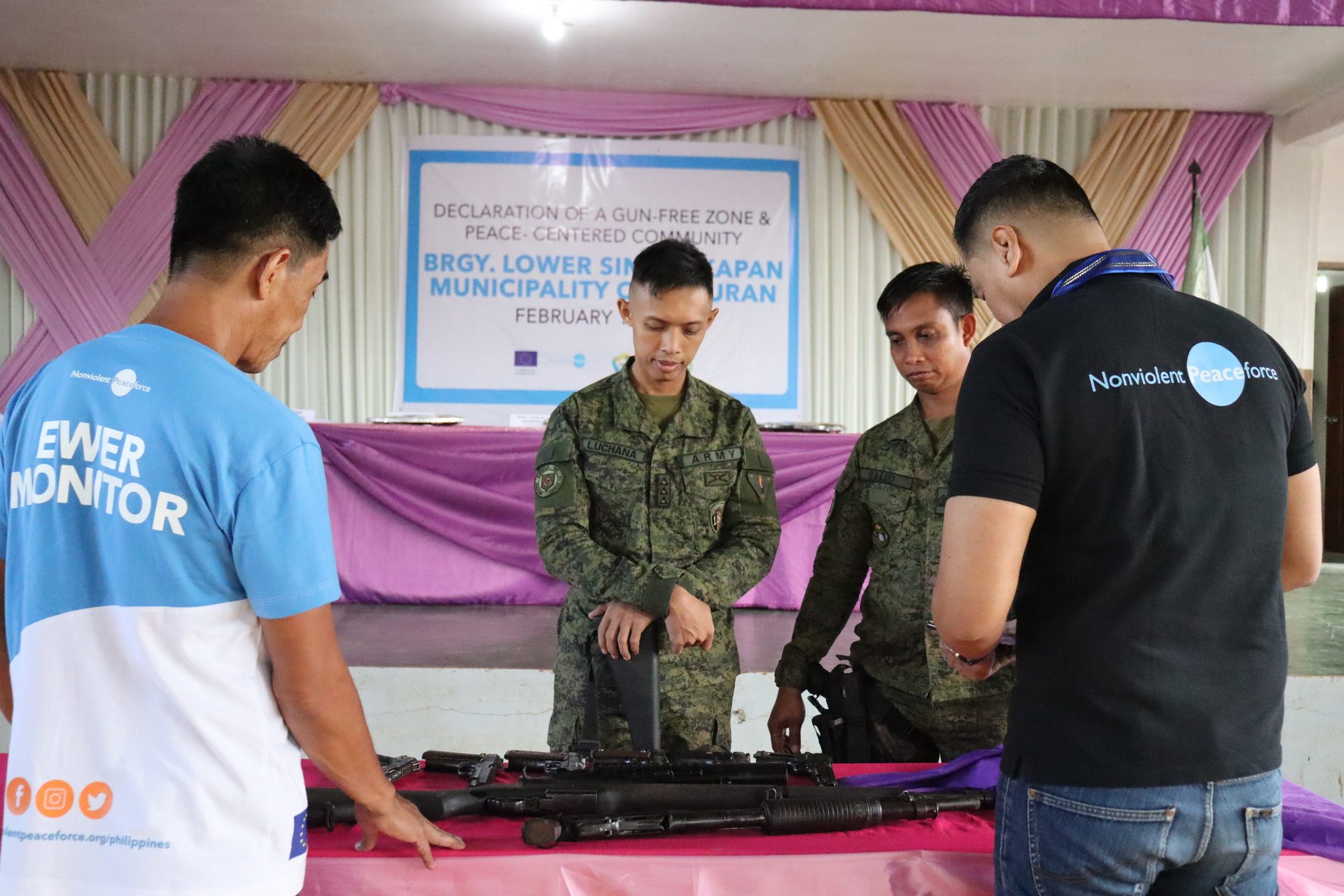
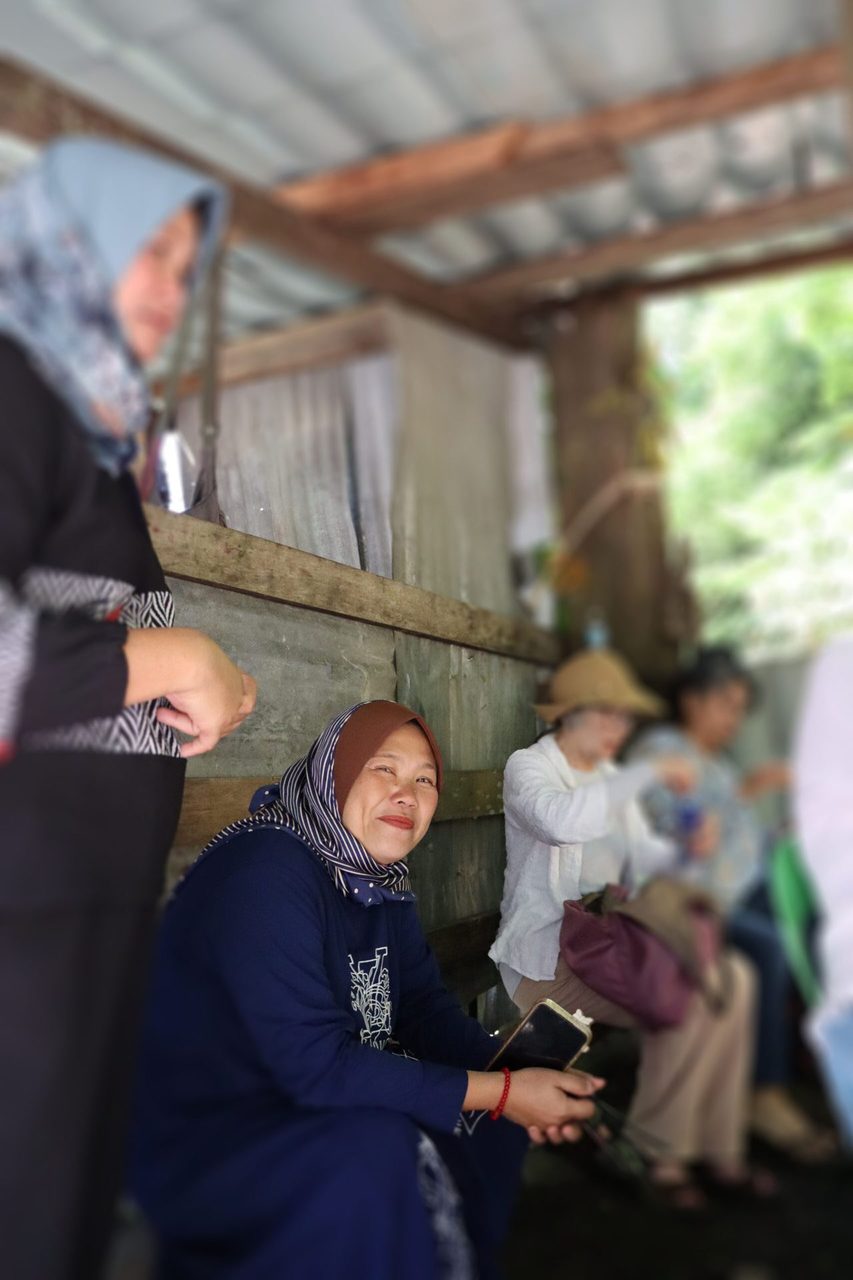
In Lower Sinangkapan, a village long plagued by armed violence, gunfire used to erupt without warning. But in 2024, the village made history by declaring itself the first gun-free zone in Basilan. The movement was sparked by local women, whose calls for safety inspired broader action. Backed by the leadership of the village Chairman Halim Saharinr—and support from NP and the local government—residents voluntarily turned in illicit firearms, trading them for peace and new livelihoods.
This community-led disarmament didn’t happen overnight. It was the result of years of trust-building, training, and coordination. As Chairman Halim put it, “The resolve to fight for what is right got even stronger when I met one of NP’s staff." Together, we created an ordinance to prohibit unauthorized firearms and help youth choose peace.
From Conflict Zone to Gun-Free Community
Husseina. Bulubudtua Falls, April 2024. ©NP
Lower Sinangkapan. February 2024.
©NP/Denise Rafaeli Cadorniga
Turning collaboration into impact
Healing with
Purpose
Indonesia
In Aceh, Indonesia, communities are still reckoning with the long shadows cast by decades of armed conflict. But amid this legacy of trauma, people are coming together to heal—not just individually, but collectively—with purpose and determination.
Led by NP and implemented with six local partners, our work in 2024 strengthened civil society engagement, advanced advocacy for reparations, and supported victims within Aceh’s transitional justice process. We delivered tangible results while laying a durable foundation for sustainable, long-term change in Aceh.
Spotlight on
Aulia
For 17-year-old Aulia, healing takes the form of poetry. Even though she was born after the tsunami and the armed conflict, she still feels the weight of her community’s trauma. As a youth leader, Aulia channels this collective pain into powerful verse. She and other young women are learning tools for violence prevention and de-escalation—while using creativity to process grief and spark hope. Her poem, Wounds and I, captures the silent suffering of a generation, while calling for love, support, and peace.
Spotlight on Rasyidah
After surviving the 2004 tsunami and years of displacement, Rasyidah, a 53-year-old mother and grassroots educator, is now leading her community toward peace. Recognizing that much of her community’s suffering stems from unaddressed trauma, she now trains others in nonviolent protection strategies and helps restore forgotten community values. Under her leadership, women are increasingly involved in decision-making and conflict resolution—transforming once-silenced survivors into agents of change.
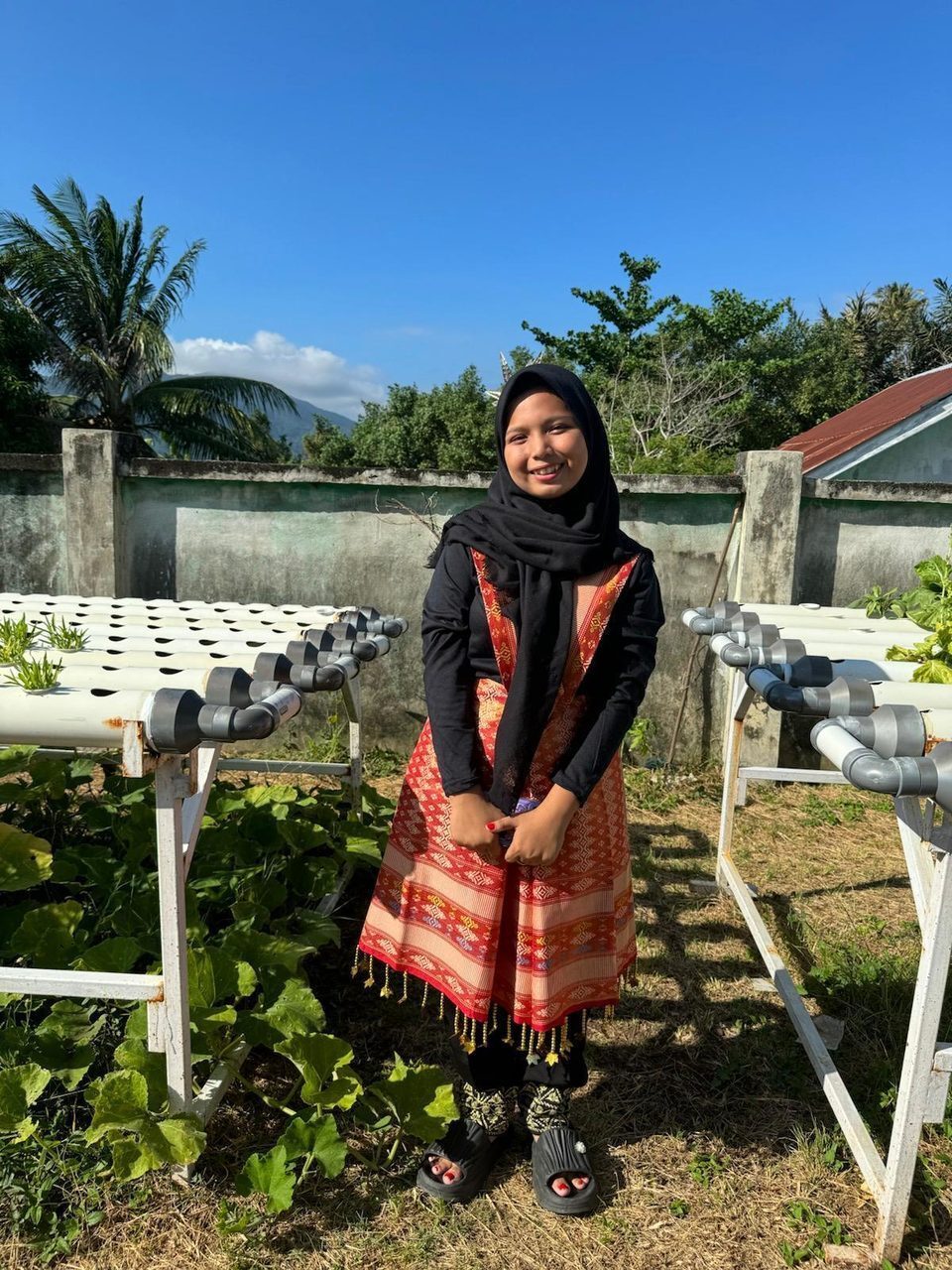
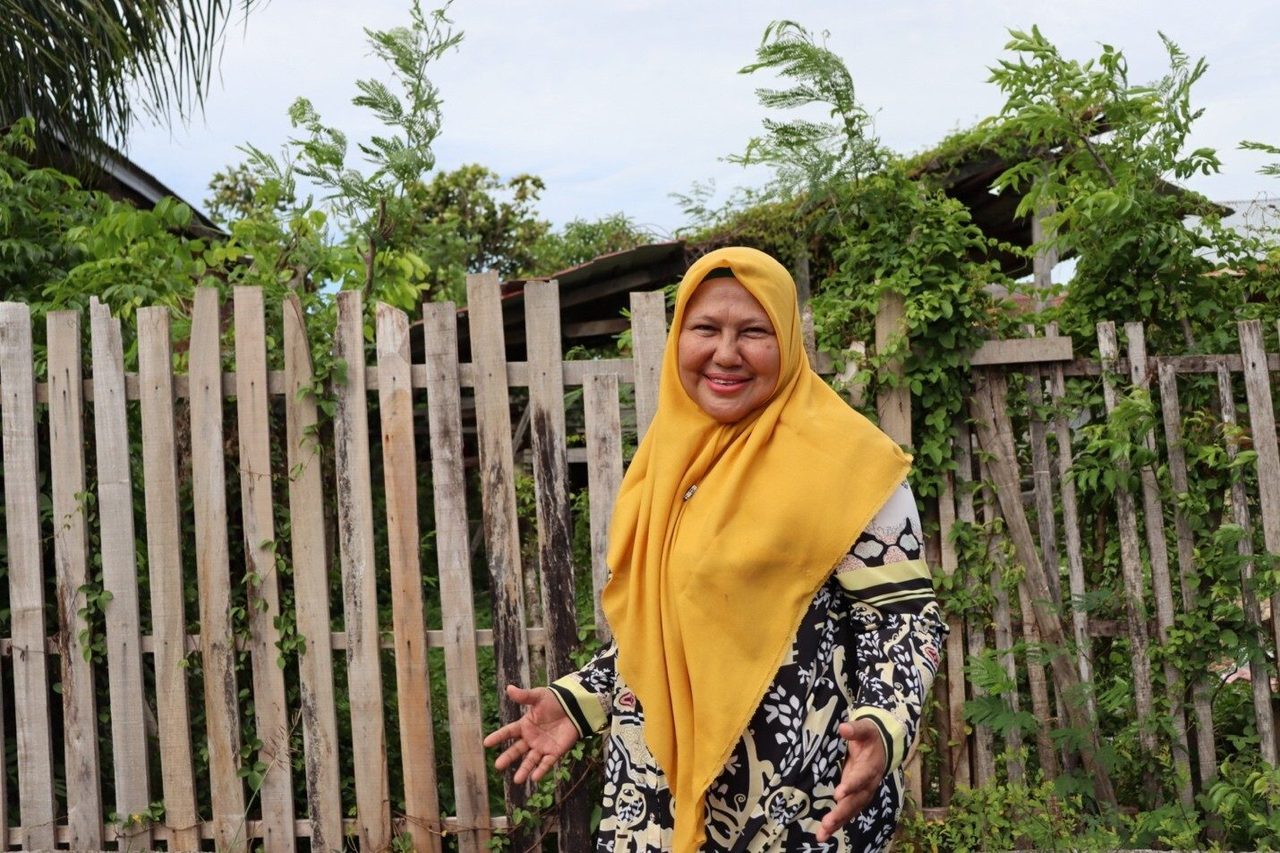
Rasyidah. Aceh, Indonesia. 2024.
©NP/Denise Rafaeli Cadorniga
Aulia. Aceh, Indonesia. February 2024. © NP
In North Minneapolis, NP’s Hub for Nonviolence and Safety has become a trusted space for healing, connection, and protection. Over the summer, NP partnered with local groups to host a series of community block parties—bringing neighbors together, sharing vital resources, and reclaiming the block for peace. One attendee admitted they were hesitant to come, saying they felt this part of the city “isn’t safe.” But by the end of the event, they stayed, connected, and witnessed firsthand what safety through community can look like.
co-creating safety
On the final day of her court hearing, NP accompanied Vilma Kari, a survivor of an anti-Asian hate crime, as she navigated the courtroom, a press conference, and shared her Victim Impact Statement with the public. Ahead of the hearing, NP’s team identified support needs of the family and developed proactive safety measures. “I felt confident knowing that there was a safety plan,” shared Liz, Vilma Kari’s daughter. “By having NP present, I didn’t have to think about my mother’s safety the whole time.”
Accompanying Survivors of Hate Crimes
In April, lifelong Indigenous leader Waniya Locke called on NP to support safety efforts for a rally they organized at the United Nations headquarters in New York. Like so many others, Waniya’s community in Standing Rock has faced escalations and violence when advocating for the protection of their land and water. Together with Waniya’s rally partners, NP developed a route, mapped out potential threats, and addressed safety concerns. On the day of the rally, NP staff interfaced with law enforcement, managed the crowds, and stayed alert to ensure a safe event.
Safeguarding civic spaces
"
Amid rising political tensions and violence, NP provides direct protection and intervention to keep communities, frontline activists, and advocacy groups safe as they engage in civic action. By equipping local groups with de-escalation techniques, protest safety training, and rapid response strategies, we are building a culture of sustained safety and collective resilience.
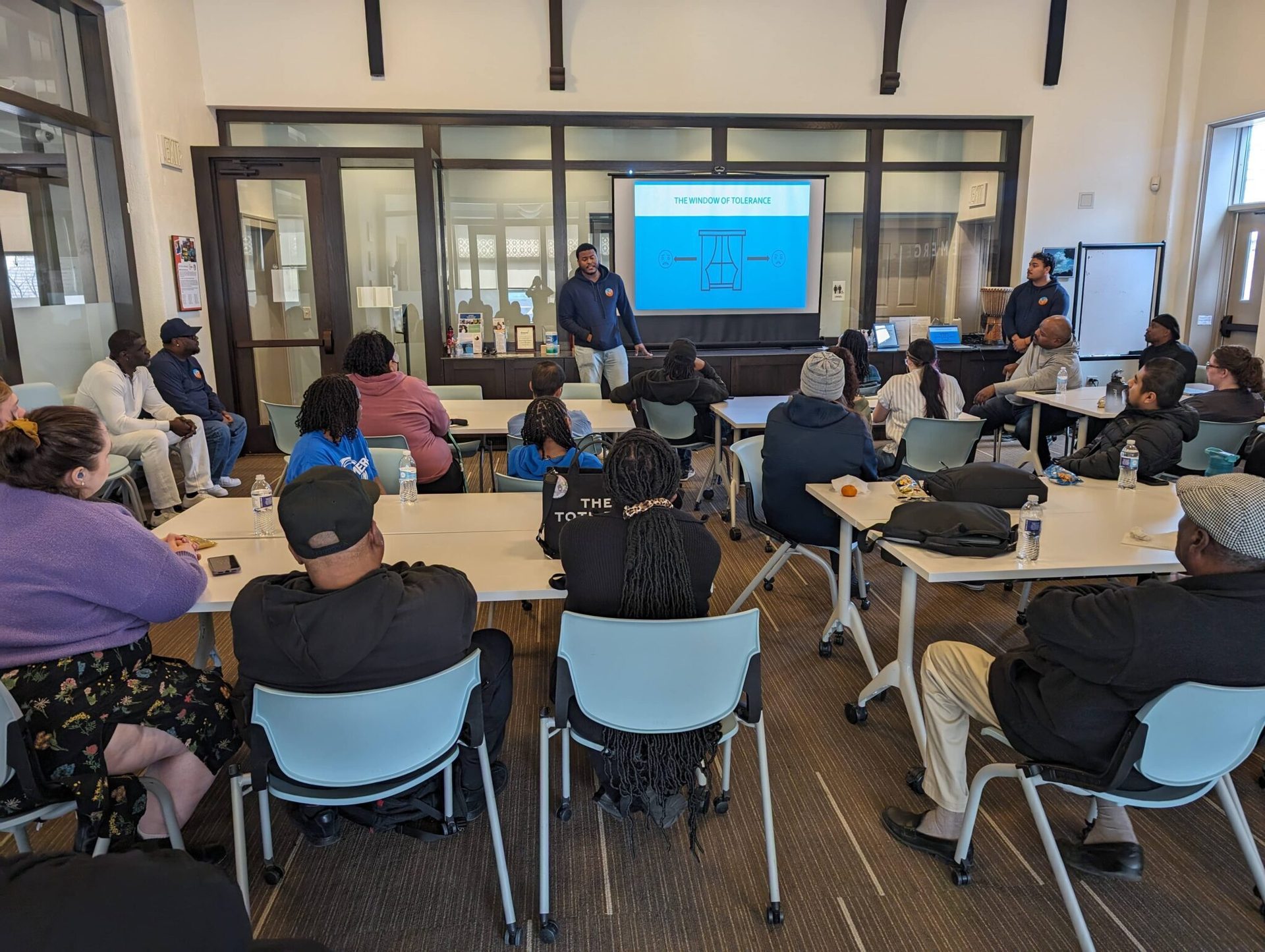
Situational awareness training with Emerge. Minnesota, U.S. April, 2024. © NP
Dr. Kevin Nadal, a Professor of Psychology who supported the Kari family
New York, U.S. 2024. © Snake Garcia
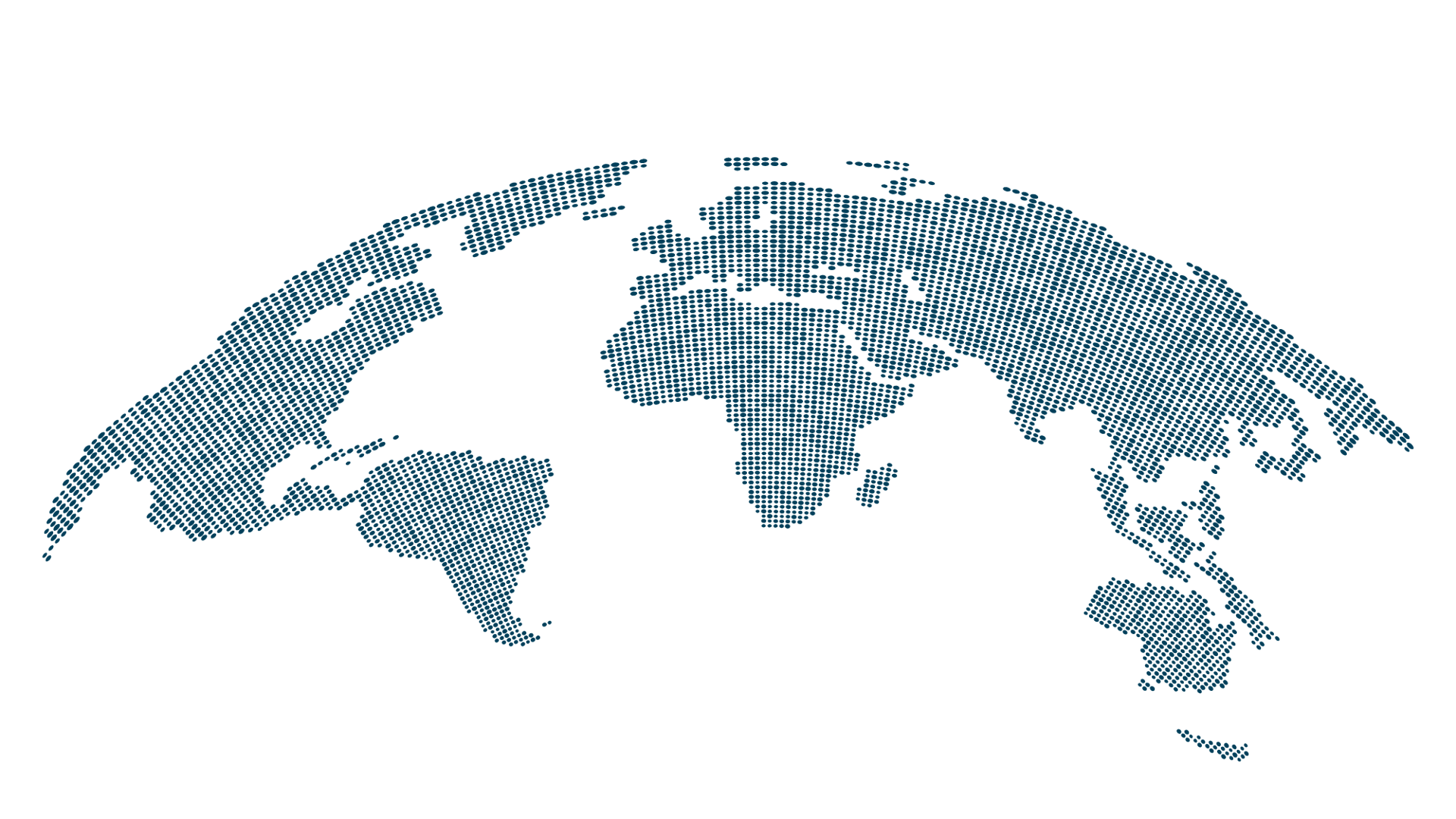
Felicity Gray, Head Of Policy & Advocacy
Line Hempel, Finance & Operations Director
Rosemary Kabaki, Head Of Mission, South Sudan
Huibert Oldenhuis, Head Of Programming
Nic Pyatt, Interim Head Of Mission, Sudan
Delsy Ronnie, Head Of Mission, Philippines & Regional Representative For Asia
Tanya Walmsley, Head Of Mission, Ukraine
Thiago Wolfer, Head Of Mission, Iraq
Gloria Jarrett Yatassaye, Head Of People, Culture, & HR
Anna Zaros, Director Of Advancement
Marna Anderson, Head of Mission, U.S. (through Sept 2024)
Deepa Sureka, Board Vice Chair, USA
Rachel Julian, Board Secretary, UK
Brian McLeod, Board Treasurer, USA
Meenakshi Gopinath, Board Member, India
Diah Kusumaningrum, Board Member, Indonesia
Thomas Kurmann, Board Member, USA
Francois Marchand, Board Member, France
Anna Matveeva, Board Member, UK
Tiffany Tool, Board Member, USA
Isaiah Kipegon Toroitich, Board Member, Switzerland
Gabriëlla Vogelaar, Board Member, Netherlands
The People Behind the Protection
Expenses
Nonviolent Peaceforce is an international nongovernmental organization with the following legal entities:
• U.S. (501c3)
• Switzerland (Swiss Foundation)
• Belgium (AISBL)
• France (Association de loi 1901)
The financial statements cover a 12 month period (January 2024 - December 2024) and represent the combined revenue and expenses to provide a full picture and scope of our work. We conduct annual external audits for each program site as well as the legal entities in compliance with local requirements.
Financials
85% of your support went directly to protecting civilians: fueling frontline peace teams, community-led safety tools, and bold advocacy. The rest kept the lights on and the mission moving.
Funding
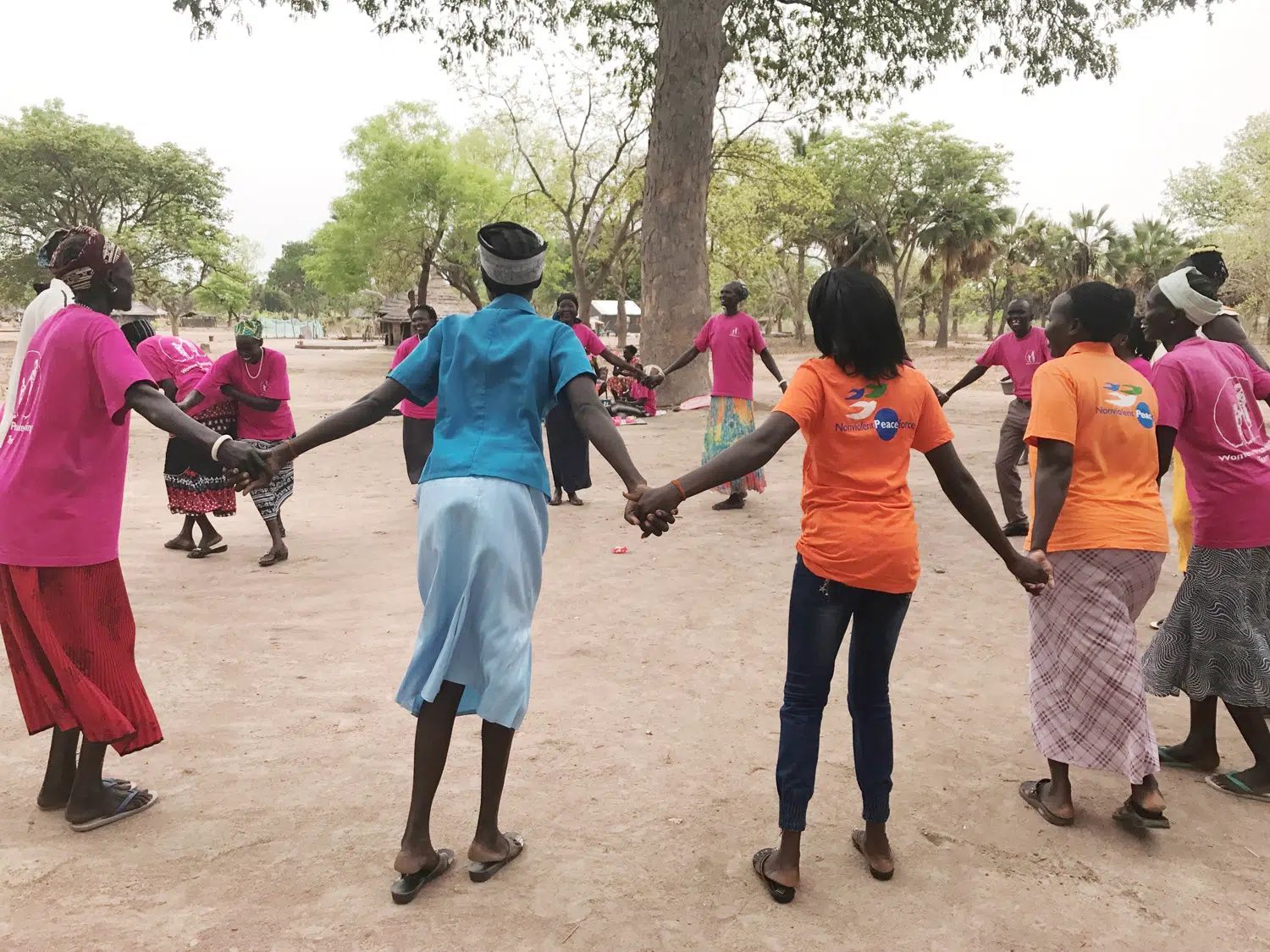
Thank You for Your Support
Your belief in a different way forward—your belief in Nonviolent Peaceforce—keeps this mission alive. It keeps our teams on the ground, communities safer, and hope within reach.
Thank you for standing with us—and with communities around the world—as we protect one another.
As a nonprofit dedicated to unarmed civilian protection, we rely on diverse funding sources to be where we’re needed most—protecting civilians, training local peacebuilders, and fostering nonviolent solutions.
You can be a part of transforming the world's response to conflict by supporting us with your gift today.
Join Us with your gift
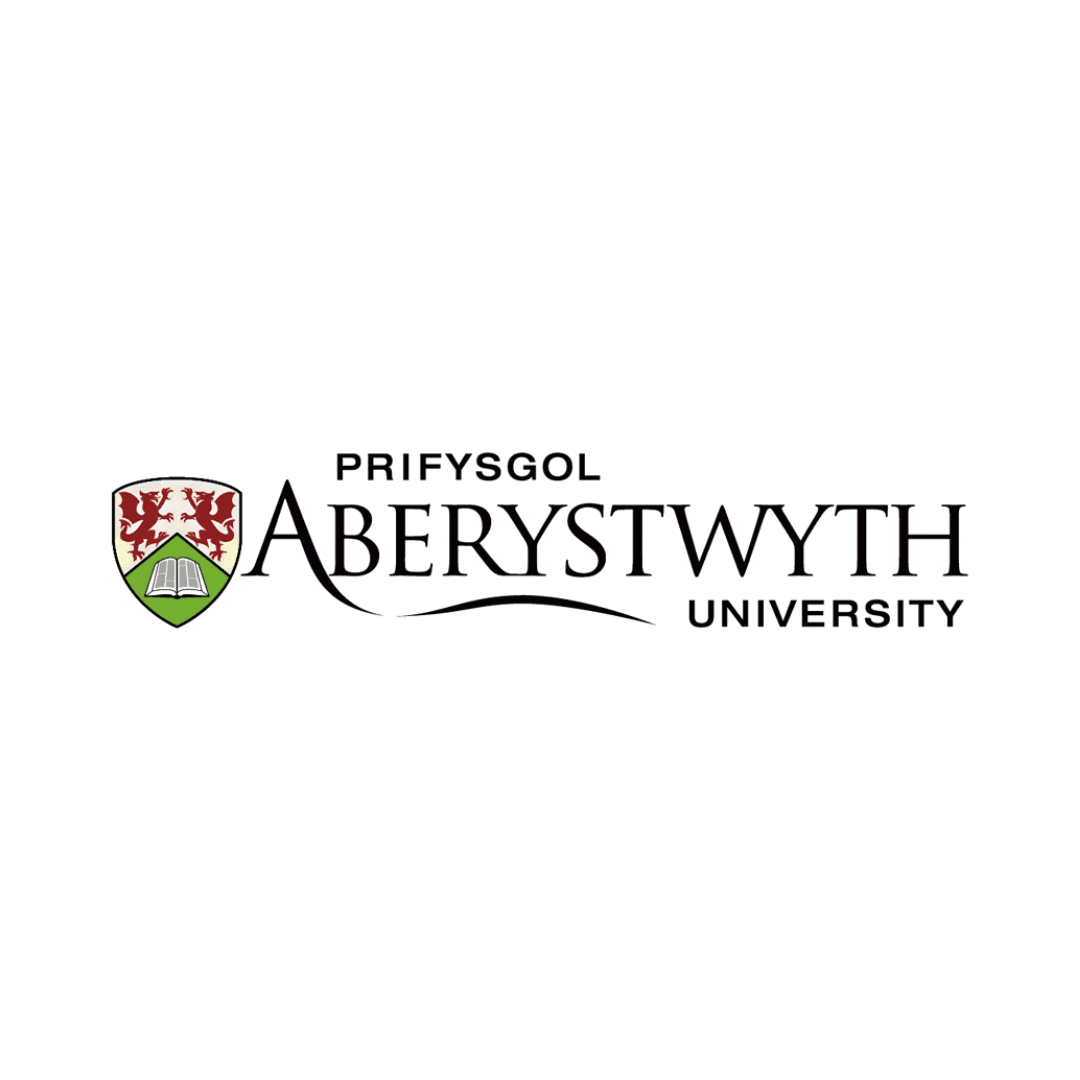
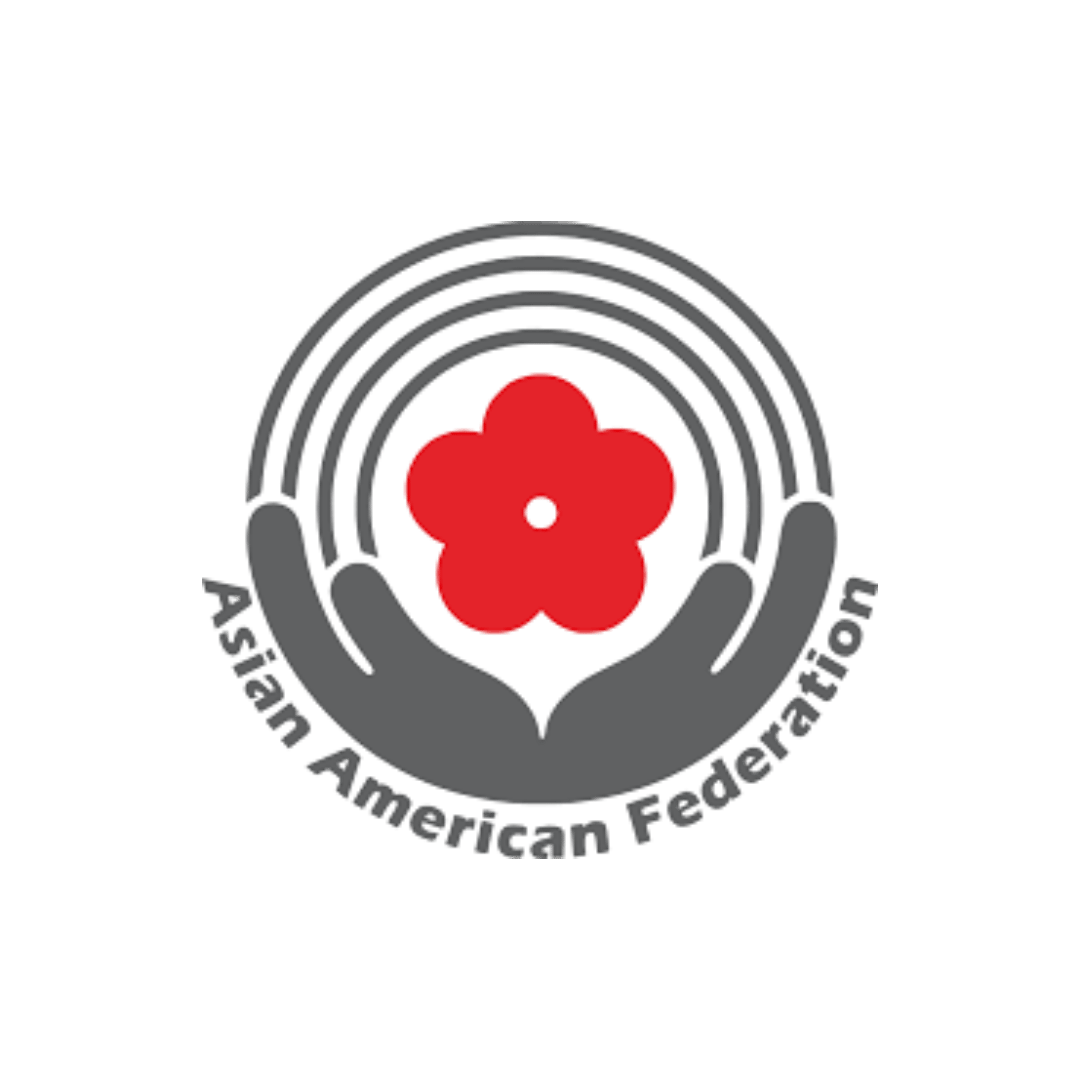
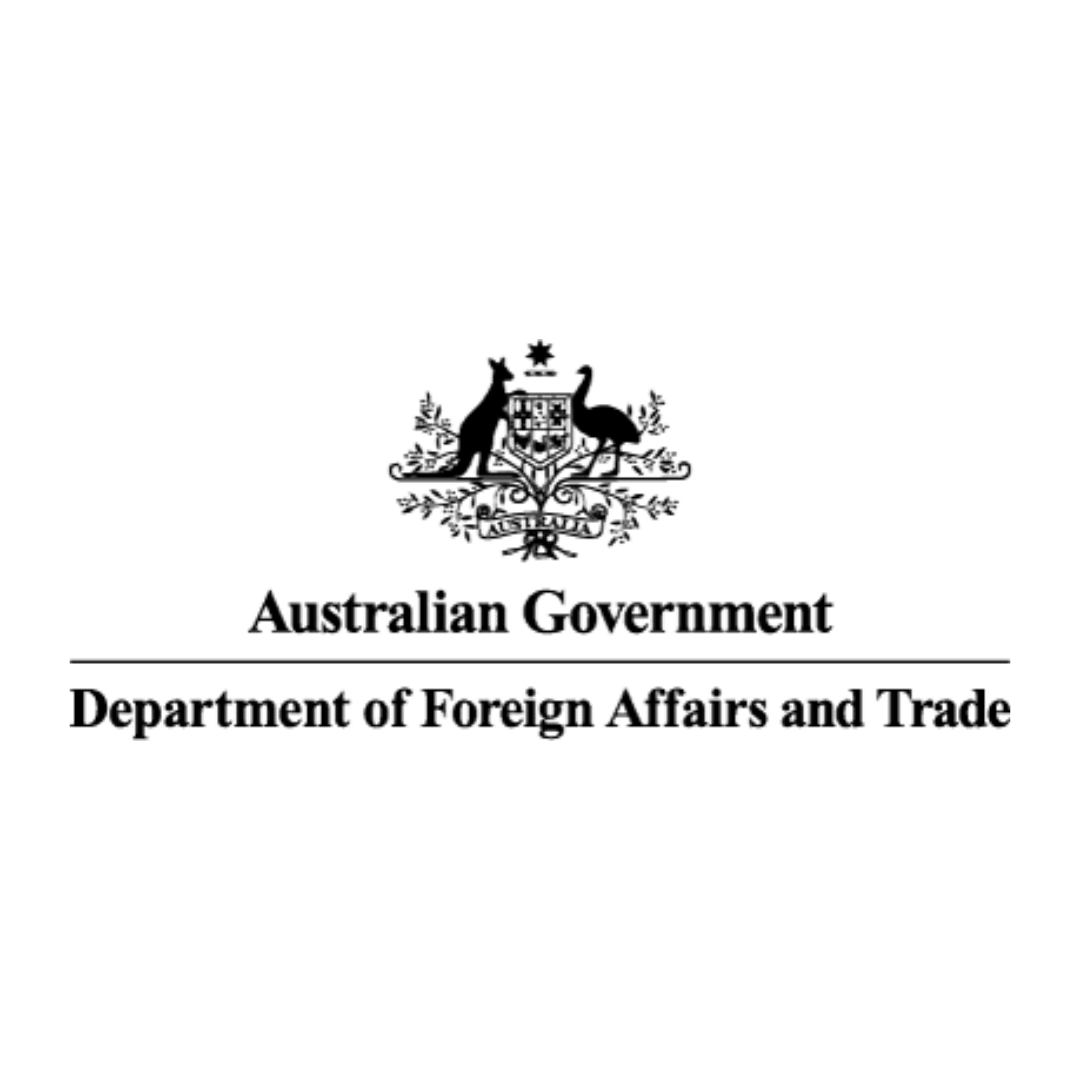
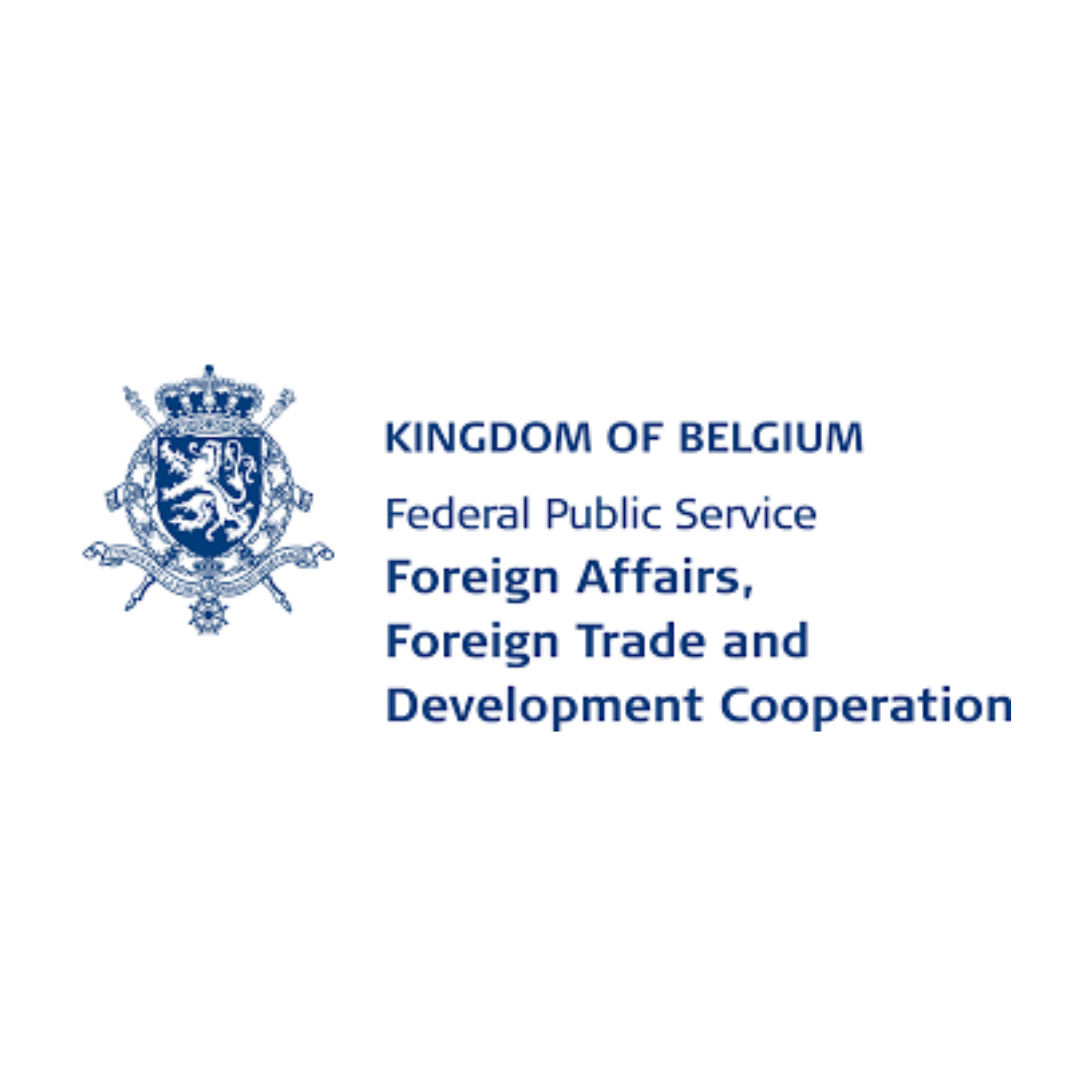
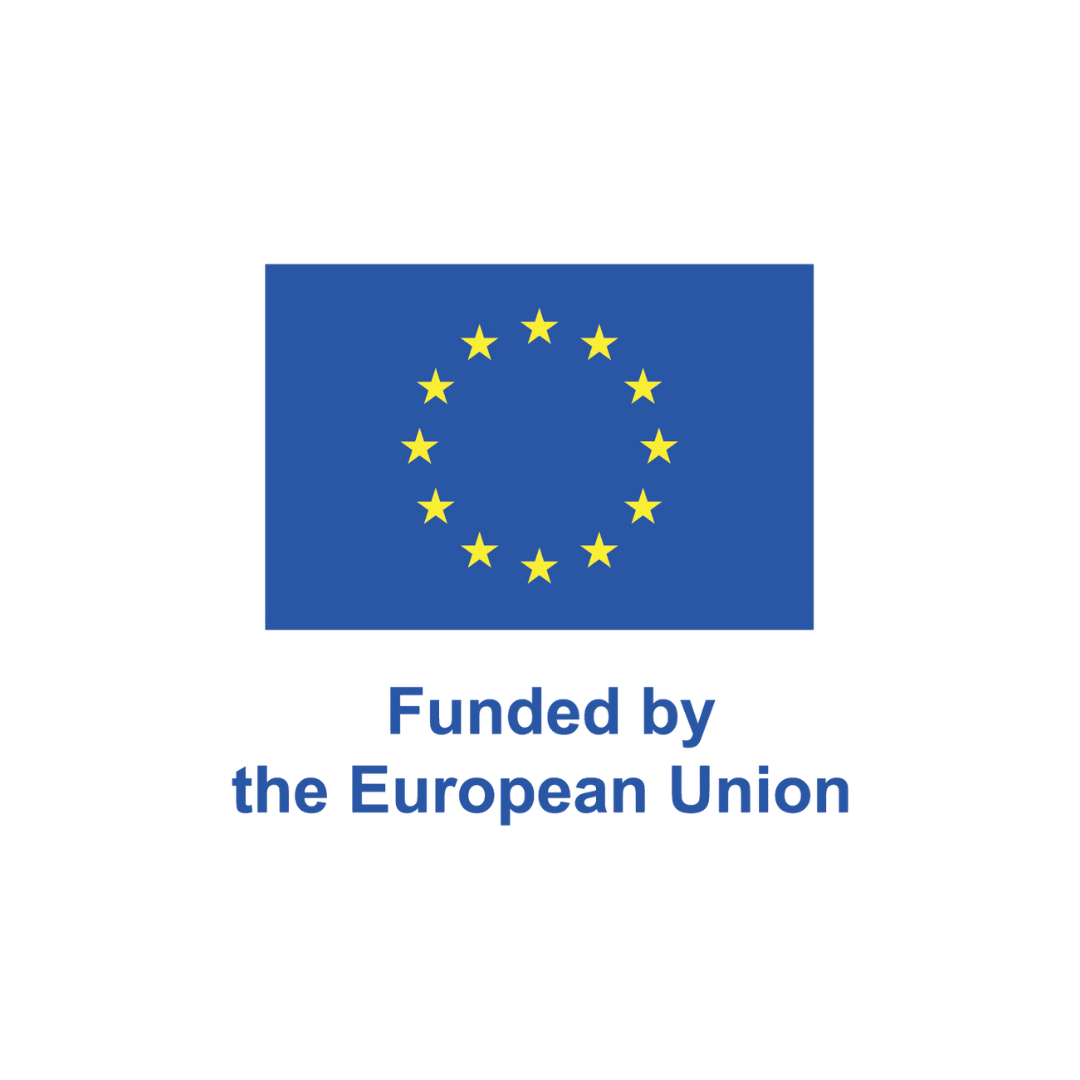
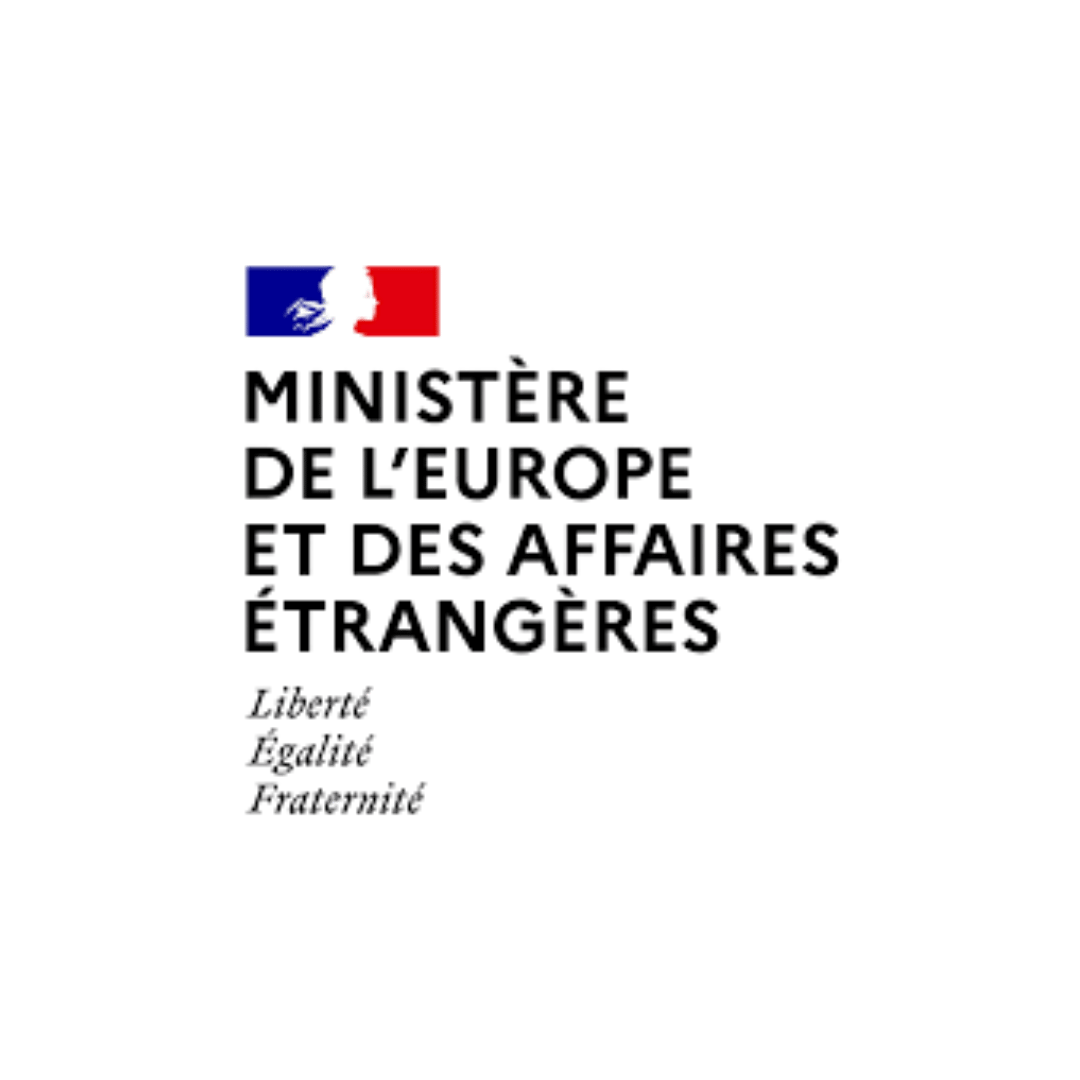
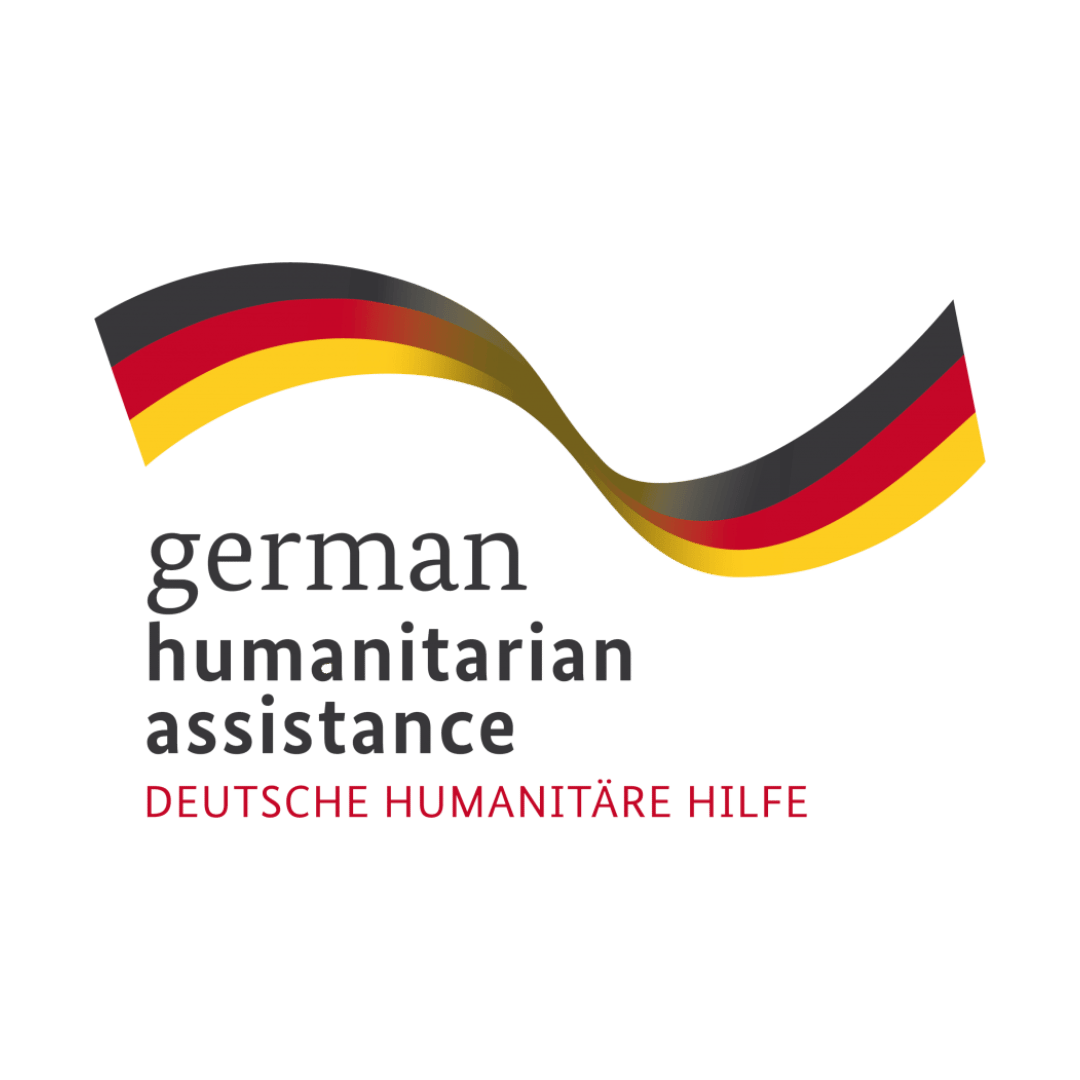
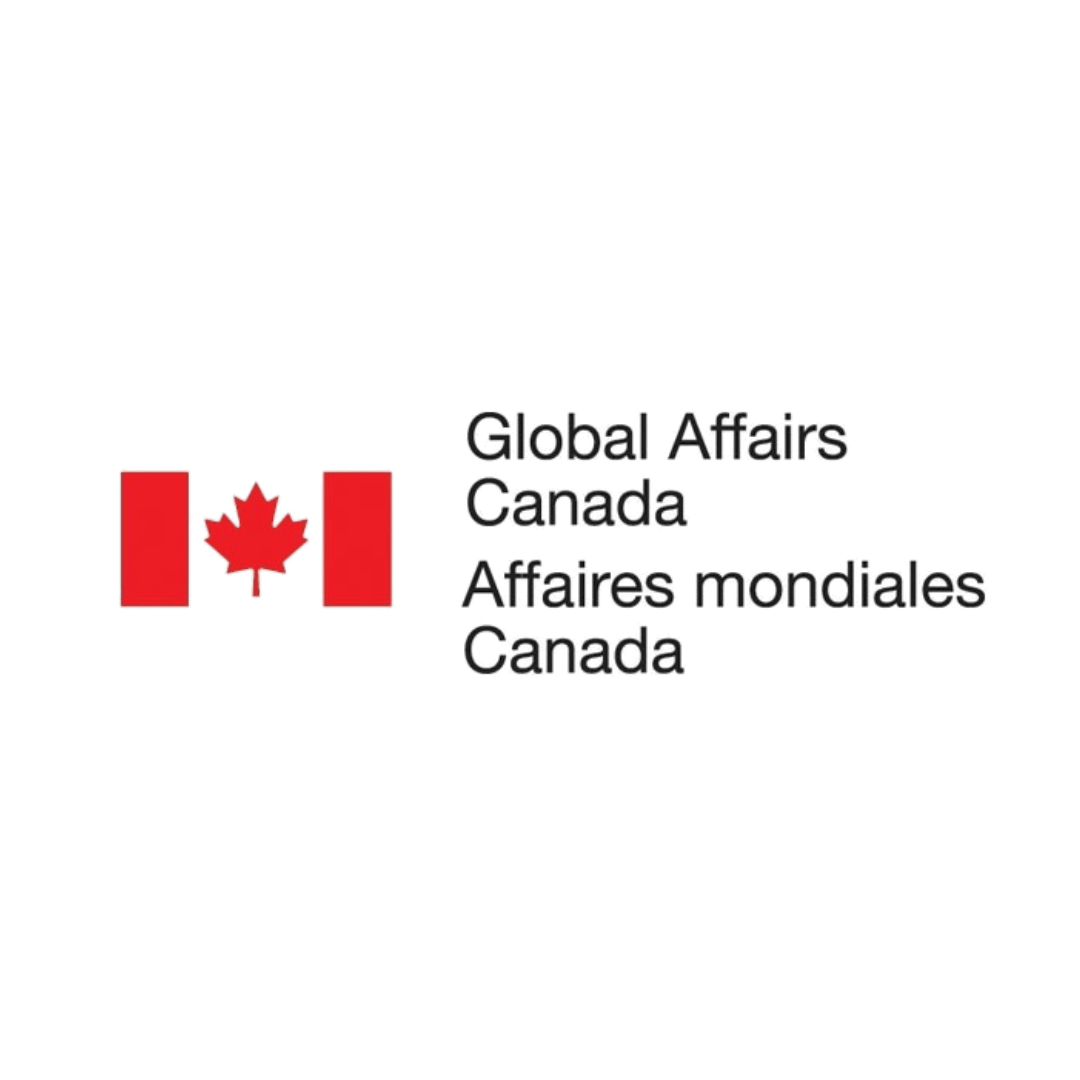
Institutional Support
